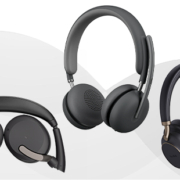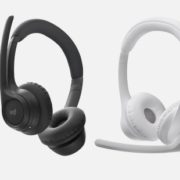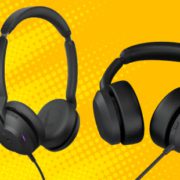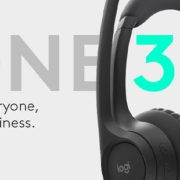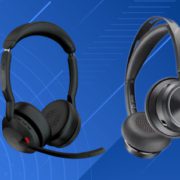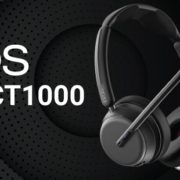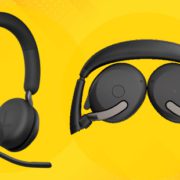Tag Archive for: headsets
Understanding the Differences Between the Logitech Zone 300 and Zone 305 Headsets
/0 Comments/in Enterprise Headsets, Featured Articles, Open Office Solutions, Recent Post, Work At Home/by Danny HayasakaLogitech, a global leader in personal and business technology, often develops separate lines of products for both consumers and business professionals. The Logitech Zone 300 is geared toward consumers, while the Logitech Zone 305 is designed specifically for business professionals, especially organizations looking for a low-cost, high-quality headset certified for Microsoft Teams and UC platforms. In this blog, we’ll explore the differences between these two models, highlight key features, and explain why working with an authorized Logitech reseller like Call One, Inc. for demos and support is important.
Logitech Zone 300: For Consumers
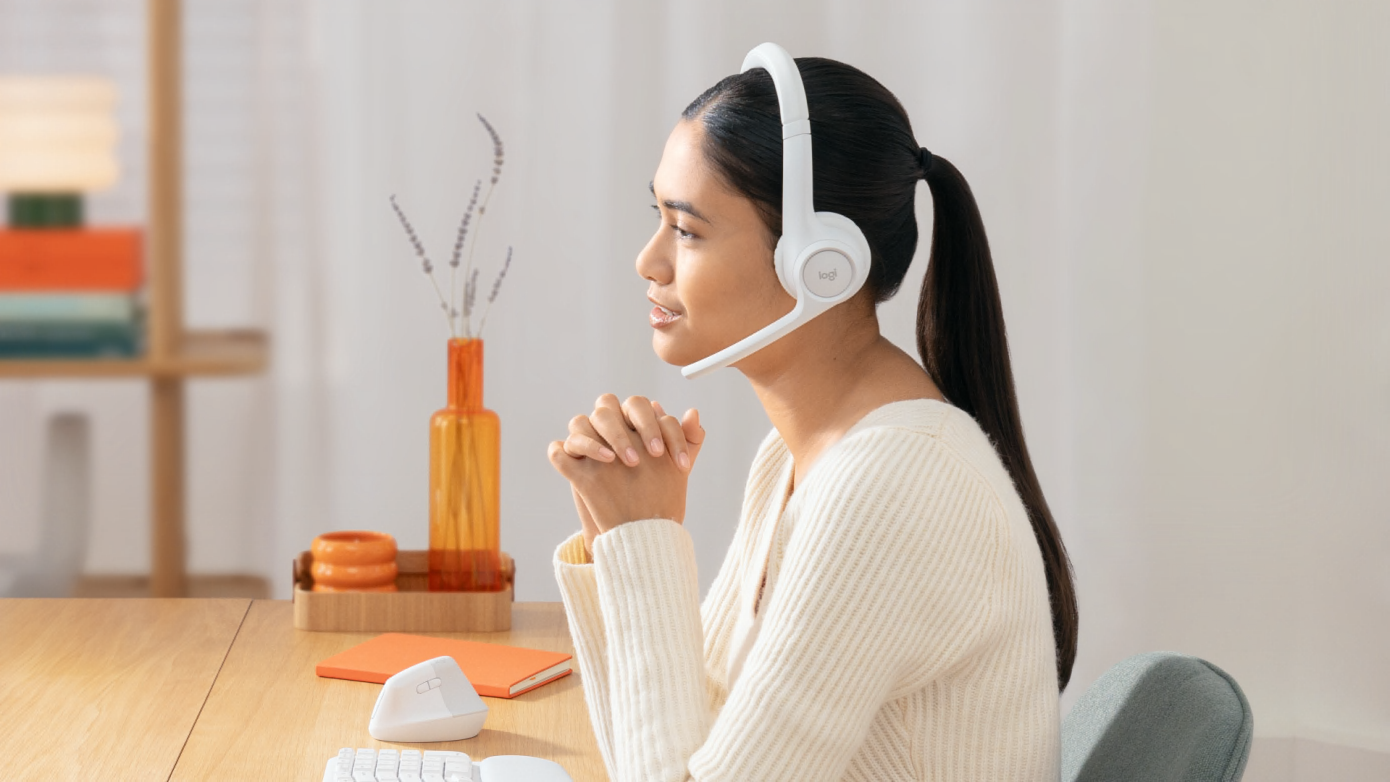
The Logitech Zone 300 is a reliable, affordable wireless headset aimed at consumers who need high-quality audio for personal use—whether for online meetings, calls, or media consumption.
Key Features:
- Bluetooth 5.3 Connectivity: Seamlessly pairs with multiple devices, allowing for flexibility in movement.
- Clear Communication: Dual beamforming microphones with noise-canceling algorithms deliver clarity during calls.
- Comfort: Lightweight and ergonomically designed for extended use.
- Compatibility: Certified for Works With Chromebook and works with common applications on Windows, macOS, ChromeOS, and iOS/Android devices.
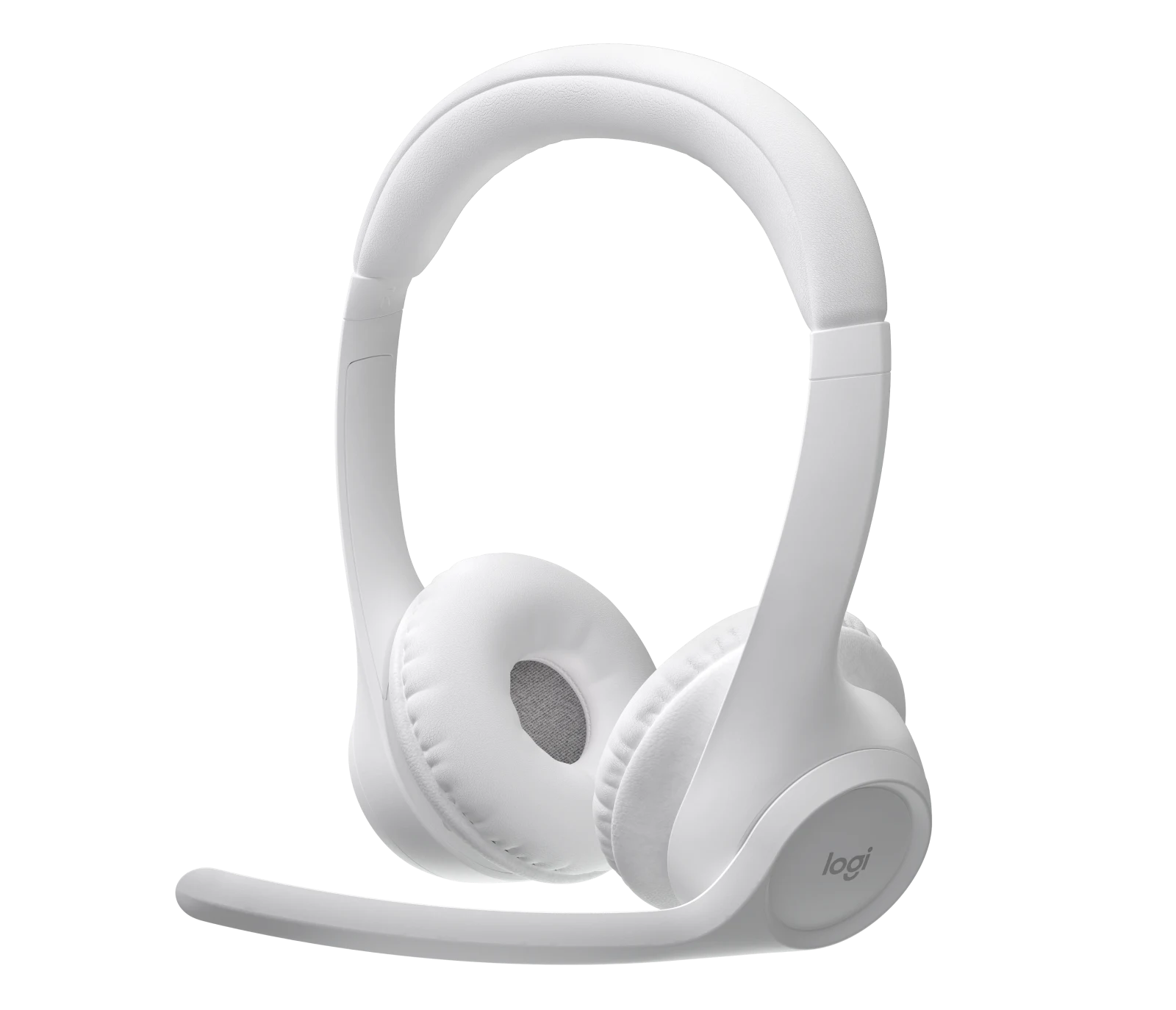
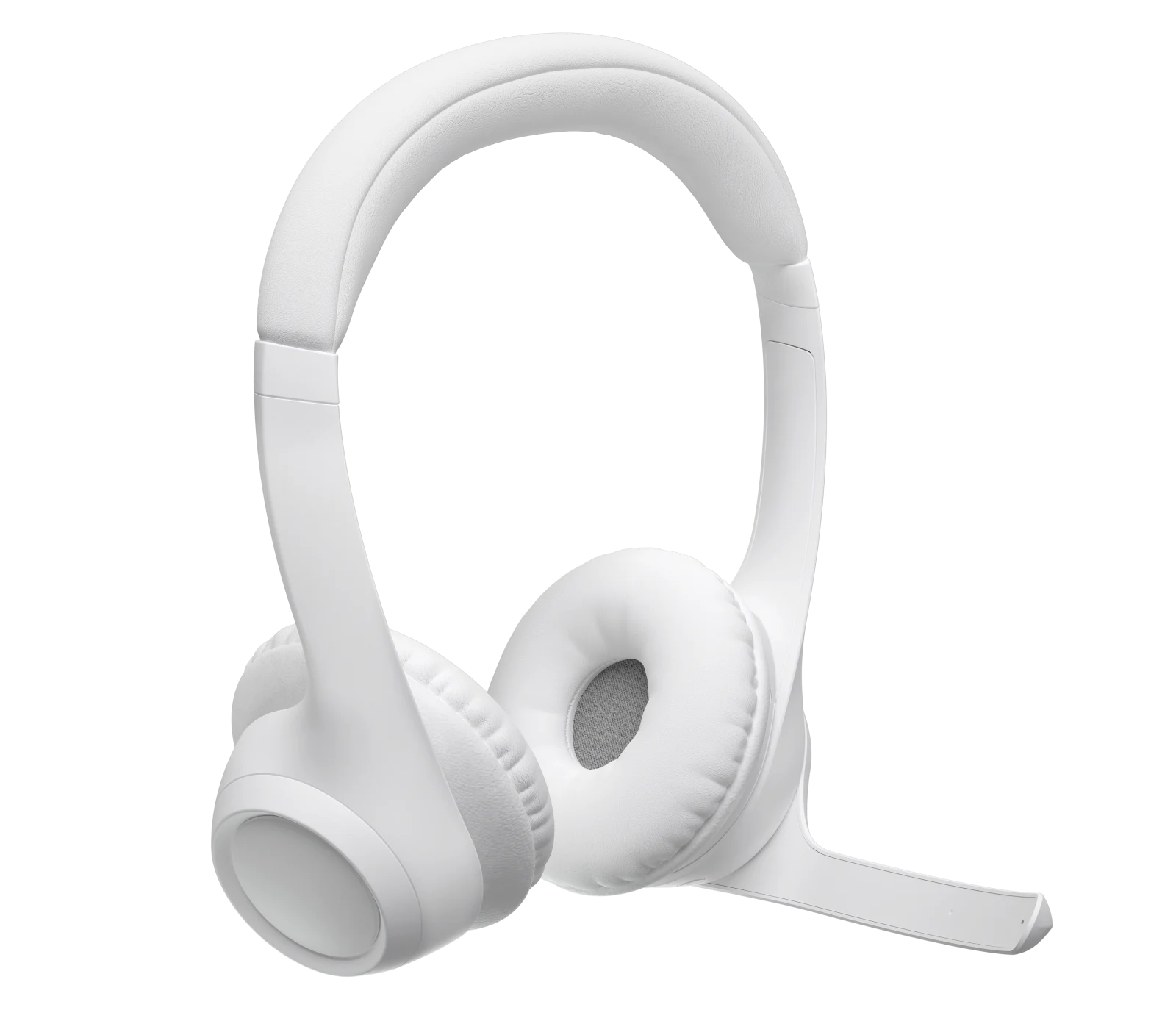
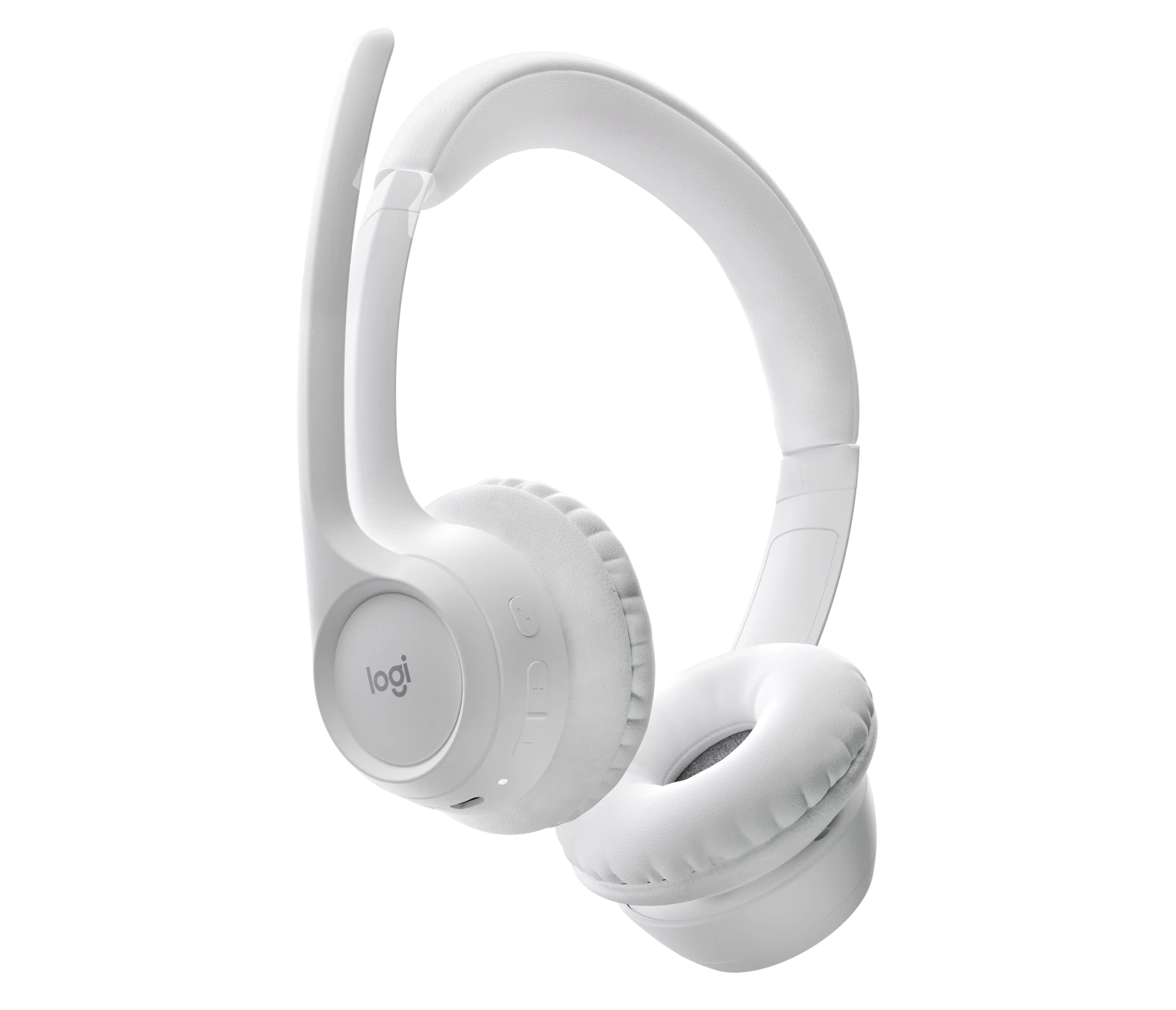
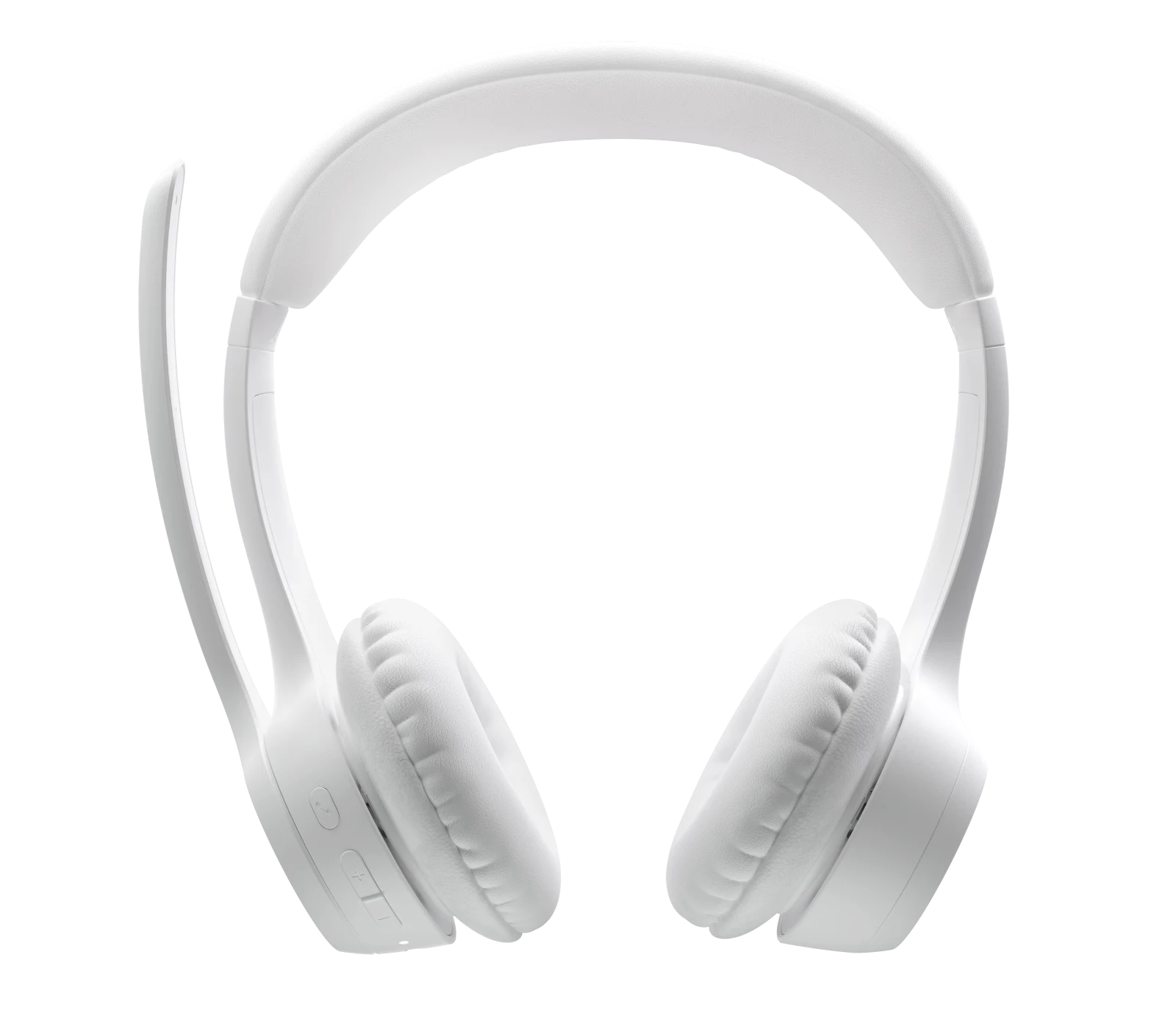
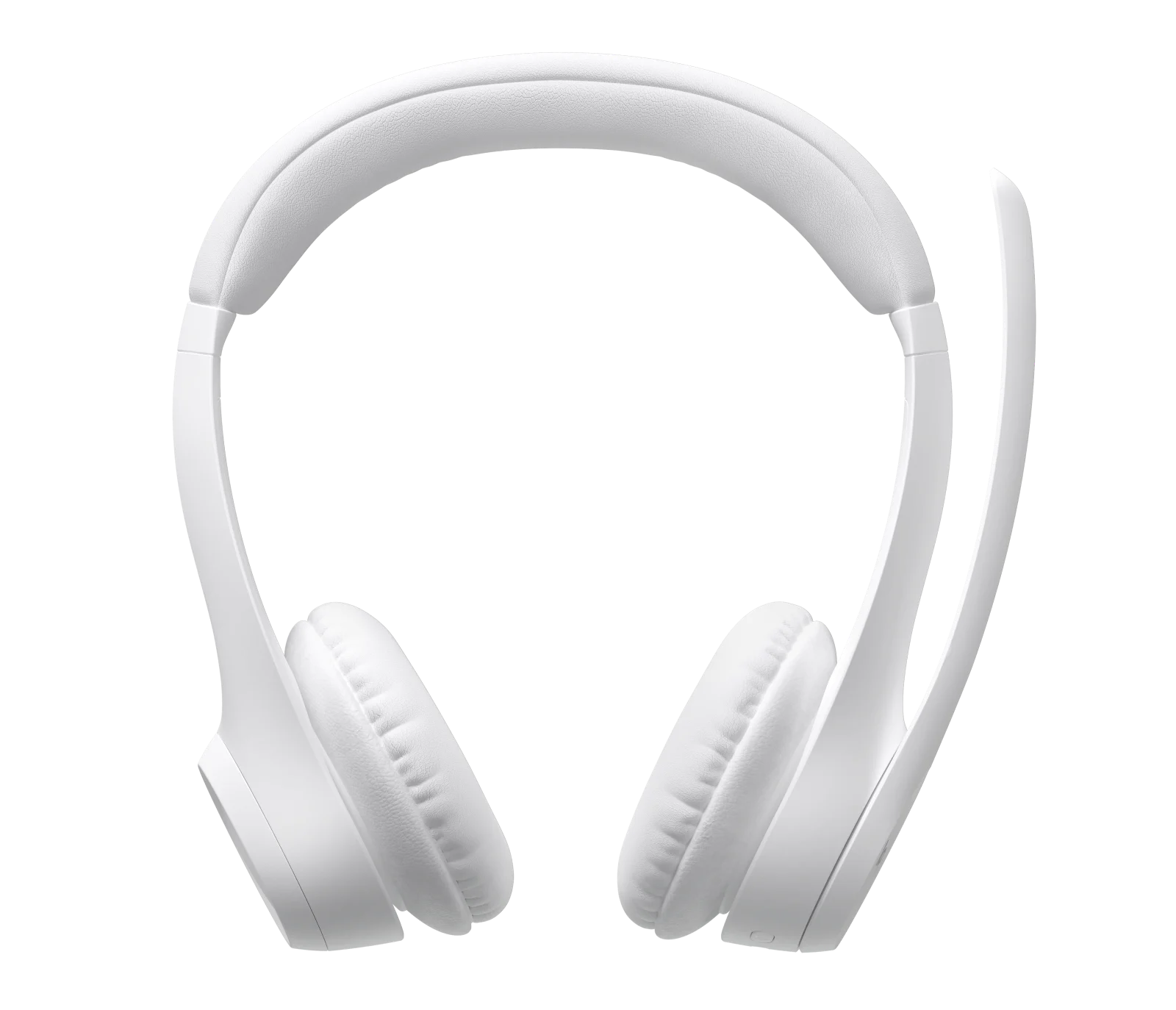
Logitech Zone 305: For Business Professionals
The Logitech Zone 305 stands out for its certifications for Microsoft Teams, Zoom, and other leading UC platforms making it an ideal choice for businesses. Whether deployed across teams in remote, hybrid, or in-office environments, the Zone 305 provides enterprise-level performance and easy management.
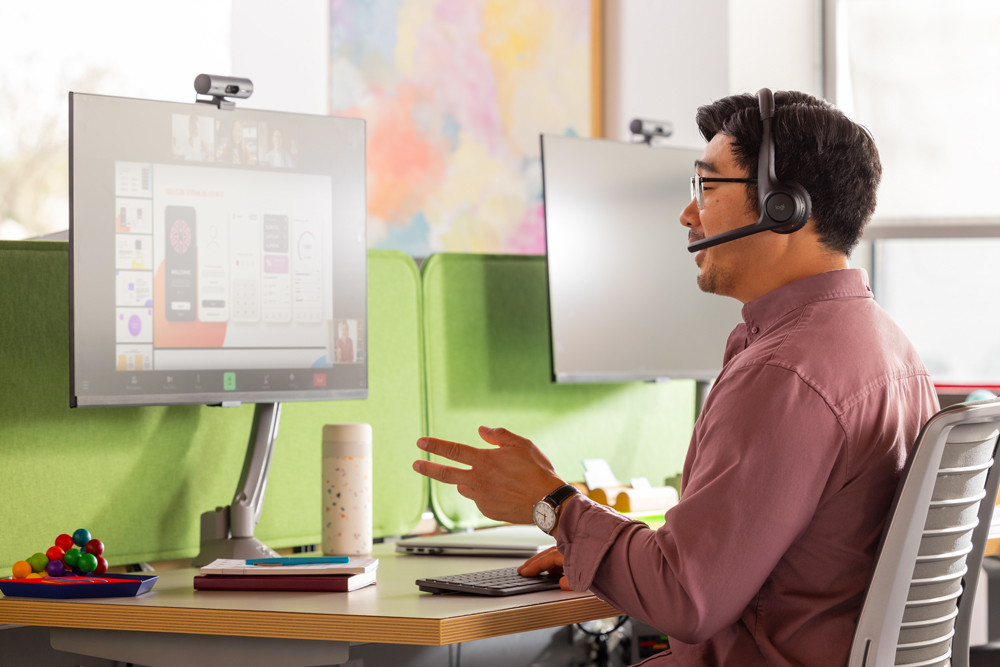
Key Features:
- Certified for Business: Zone 305 is certified for Microsoft Teams, Zoom, Google Meet, and Google Voice with the plug-and-play receiver. (As of writing this blog, it is also undergoing certification for Microsoft Teams over native Bluetooth without a dongle.)
- Advanced Connectivity: Includes a USB-C receiver and USB-A adapter, giving businesses multiple connection options.
- Superior Microphone Performance: Dual omni-directional MEMS microphones with noise-canceling technology help reduce background noise, even in busy office environments.
- Business Deployment: Perfect for mass deployment, with a 2-year warranty to support long-term usage.
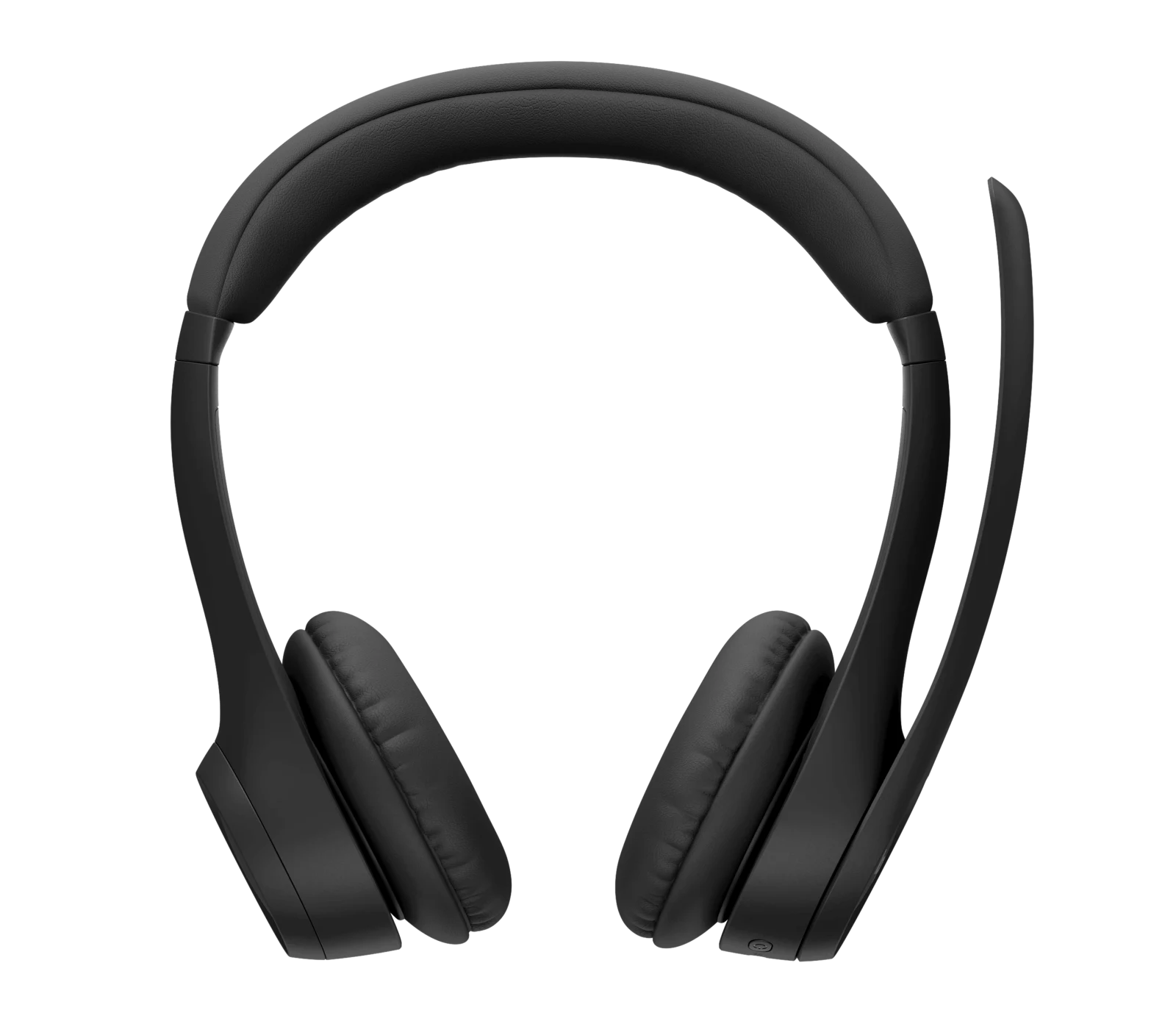
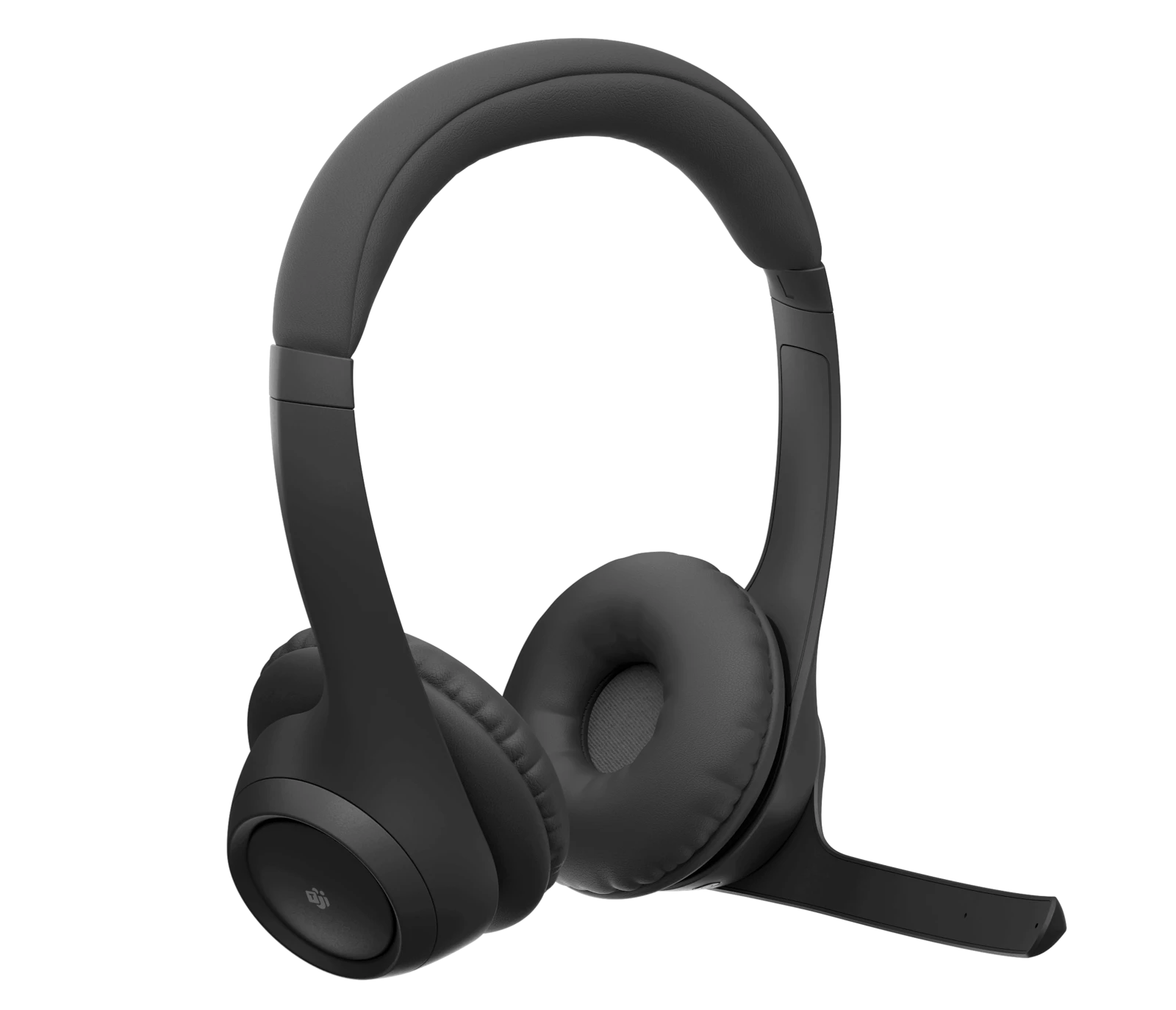
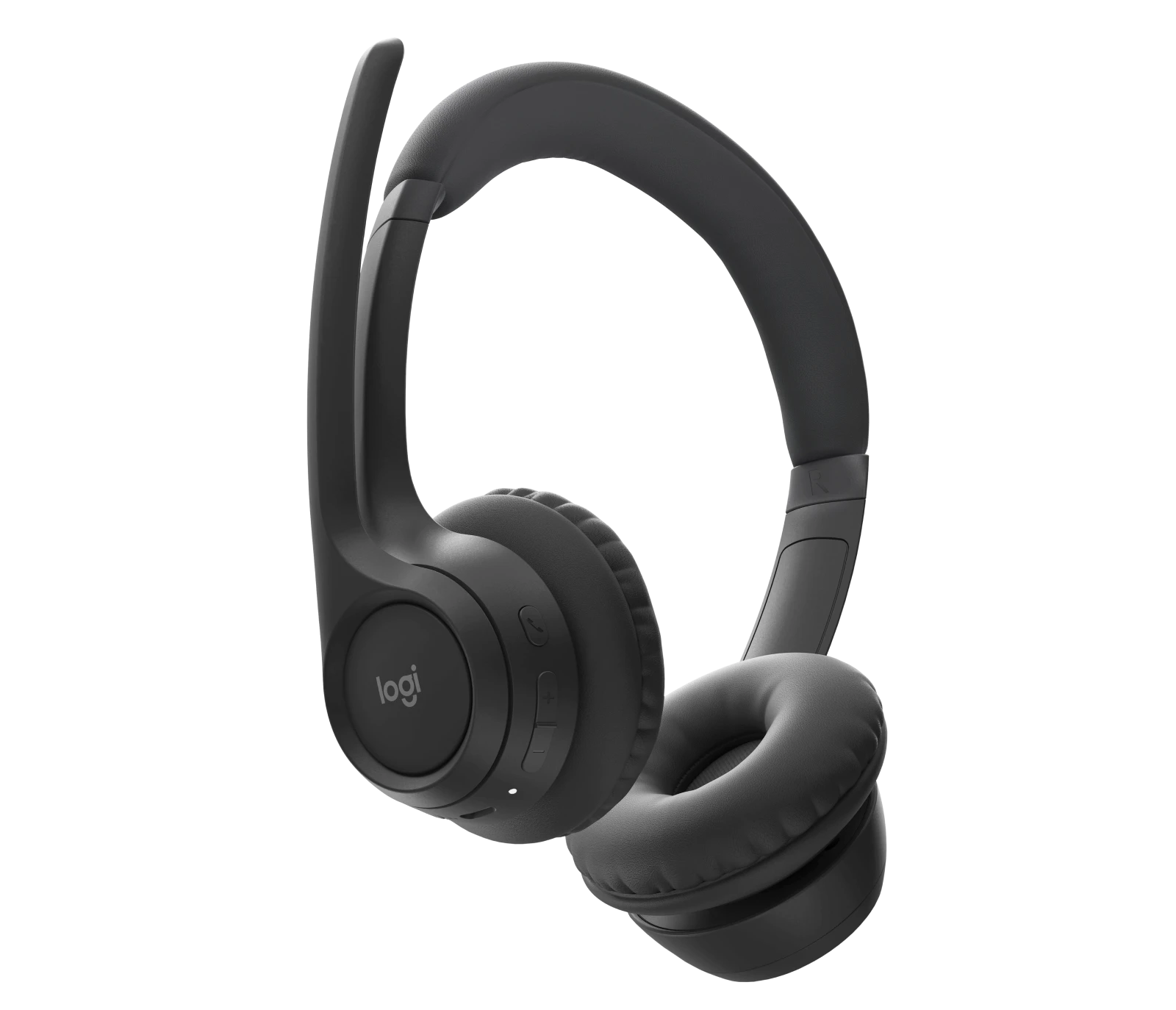
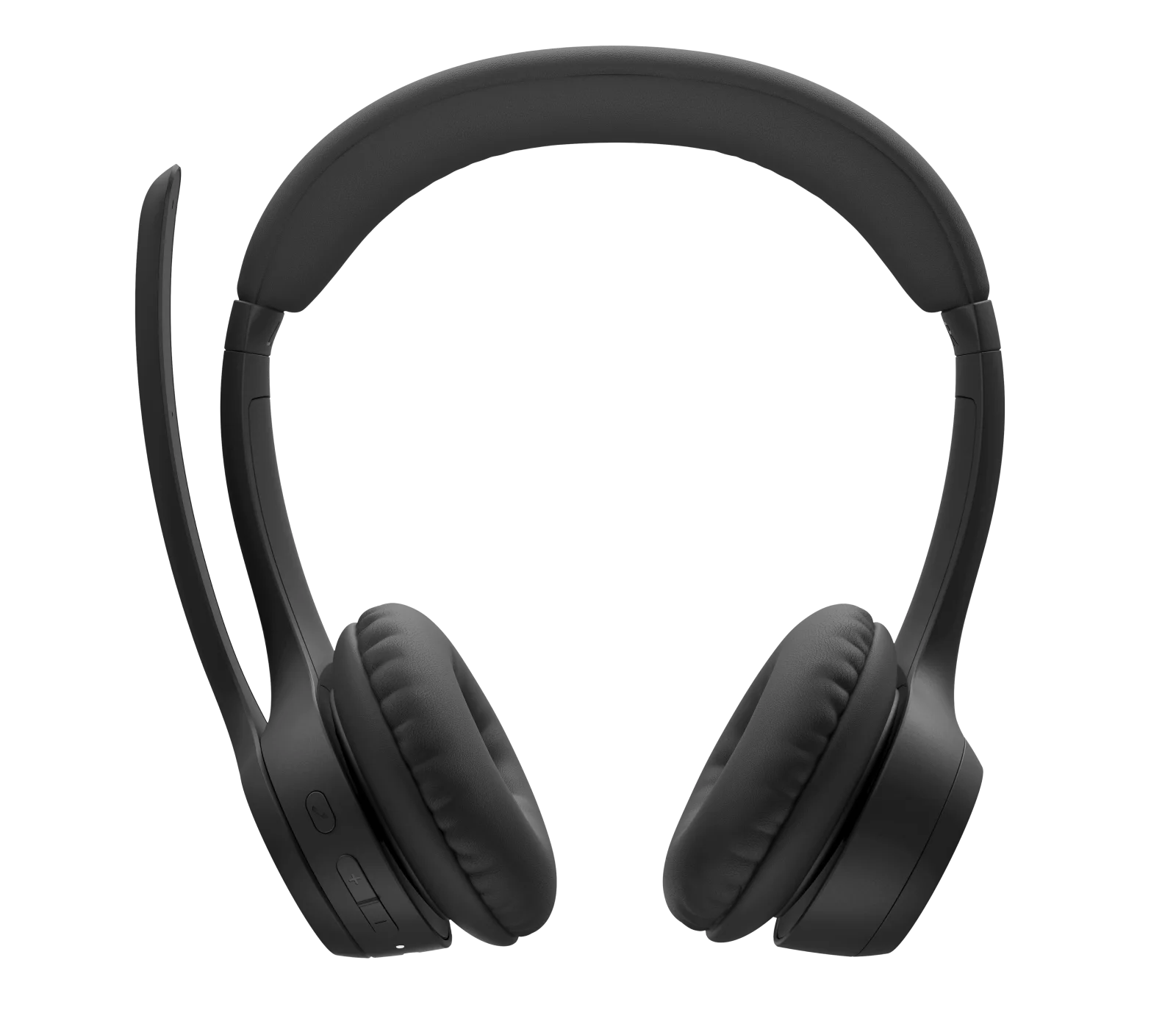
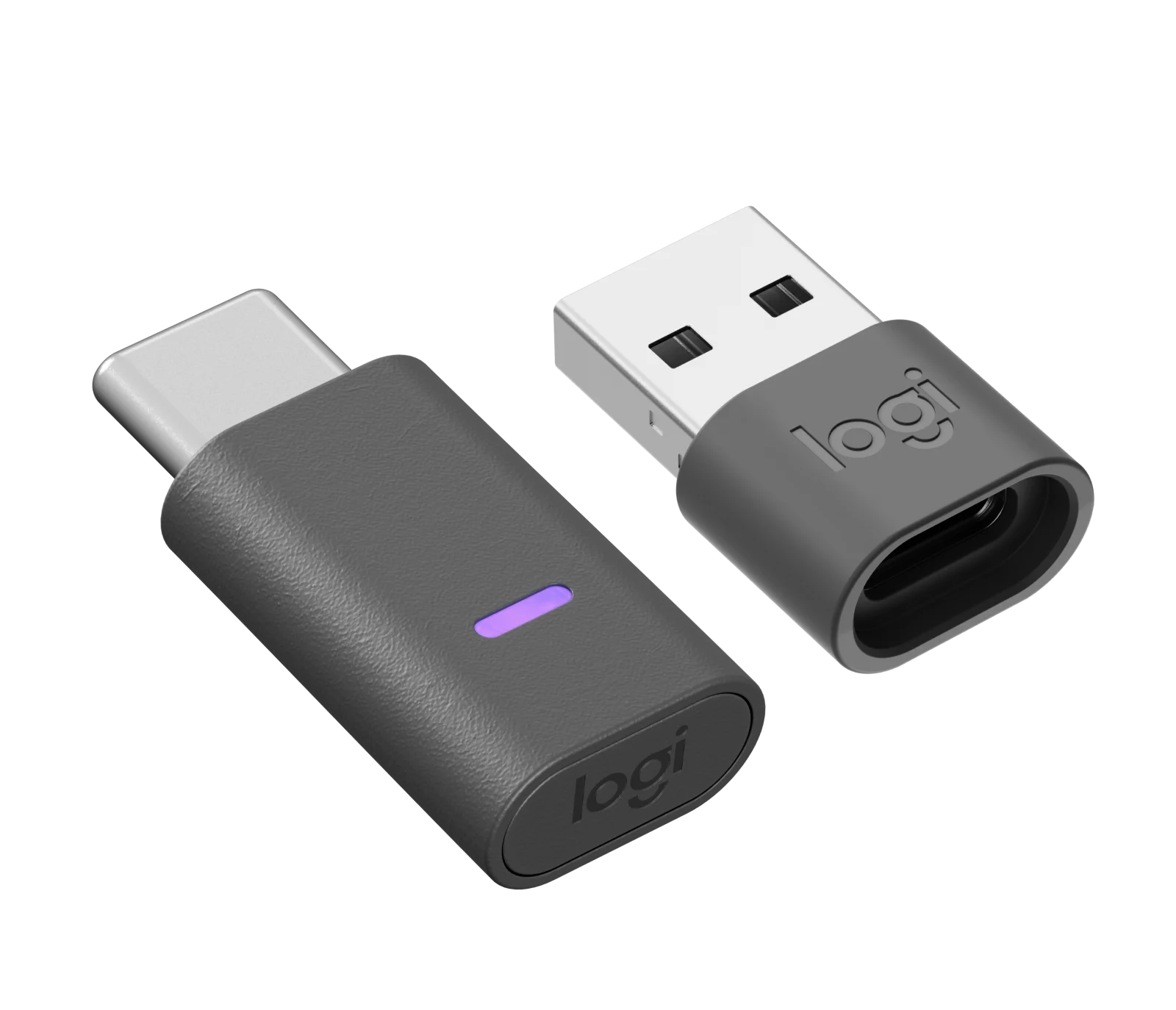
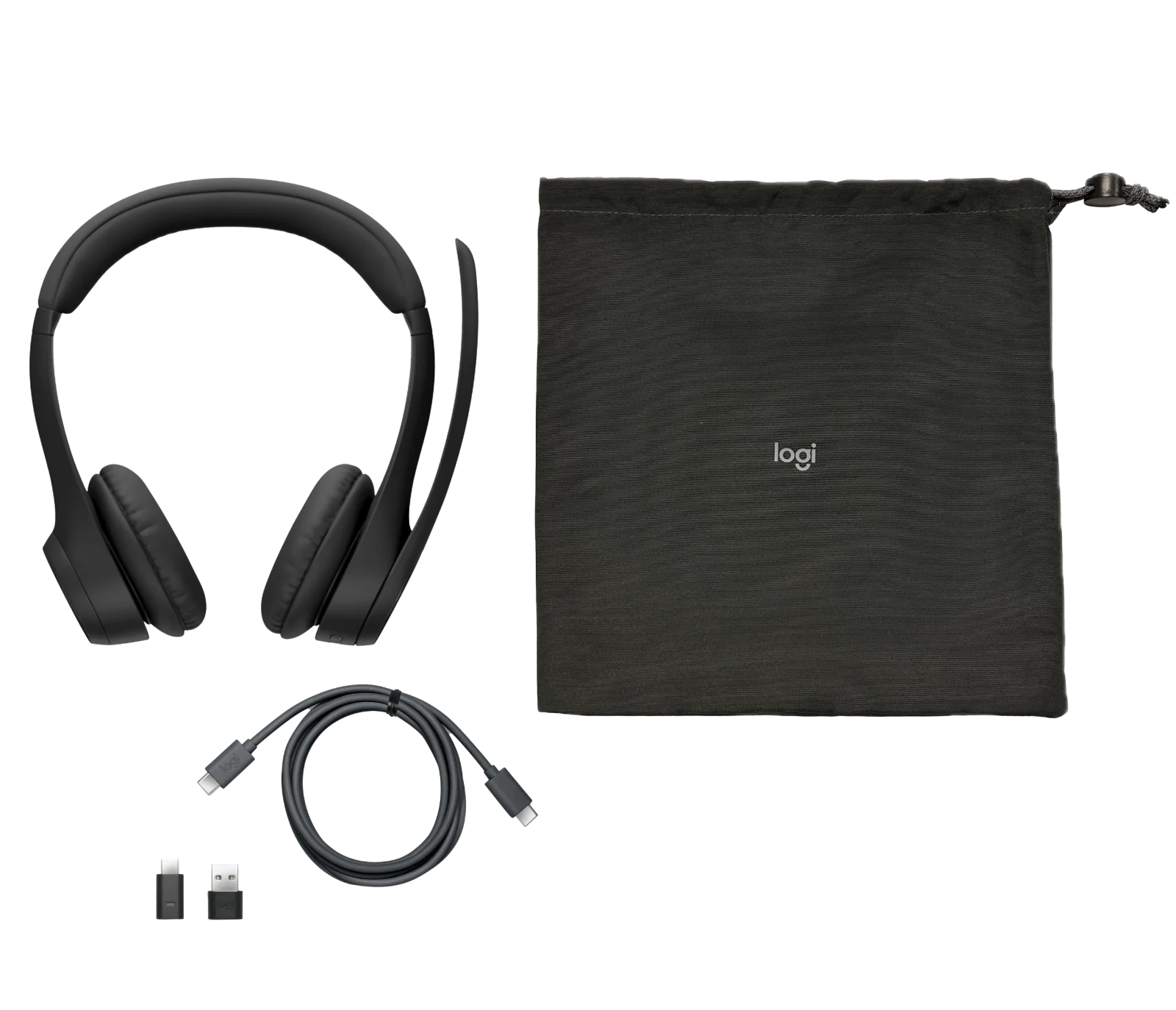
Management with Logi Tune and Logitech Sync
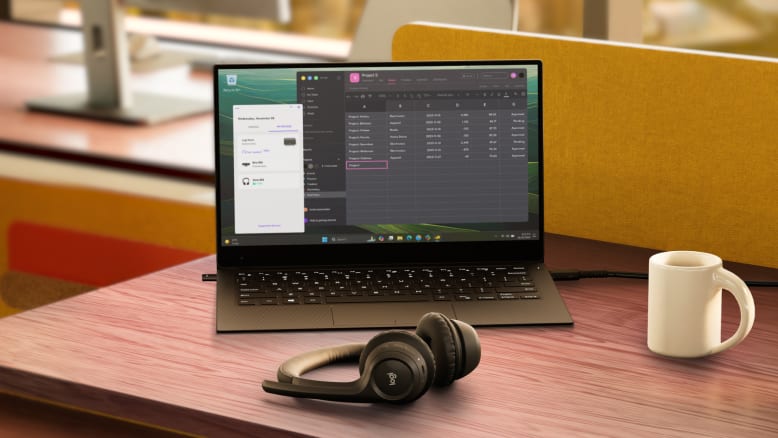
The Logitech Zone 305 offers advanced management capabilities that businesses can leverage to maximize productivity. The headset can be managed using both Logi Tune and Logitech Sync, providing comprehensive control over individual customization and IT management.
Logi Tune
Logi Tune is an application that allows users to customize and manage supported Logitech devices, including the Zone 300 and Zone 305. With Logi Tune, users can:
- Adjust headset settings: Sidetone, Mic level, Equalizer settings, Device name, Sleep Settings, Rotate to mute, Voice prompts, and Headset language to personalize your experience.
- Update firmware: Keep the headset firmware up to date, ensuring optimal performance and security.
- Monitor battery life: Easily check the headset’s battery status to prevent unexpected downtime.
Logitech Sync
For IT admins, Logitech Sync provides an enterprise-level device management platform that allows for remote monitoring and updates of the Zone 305. With Sync, admins can:
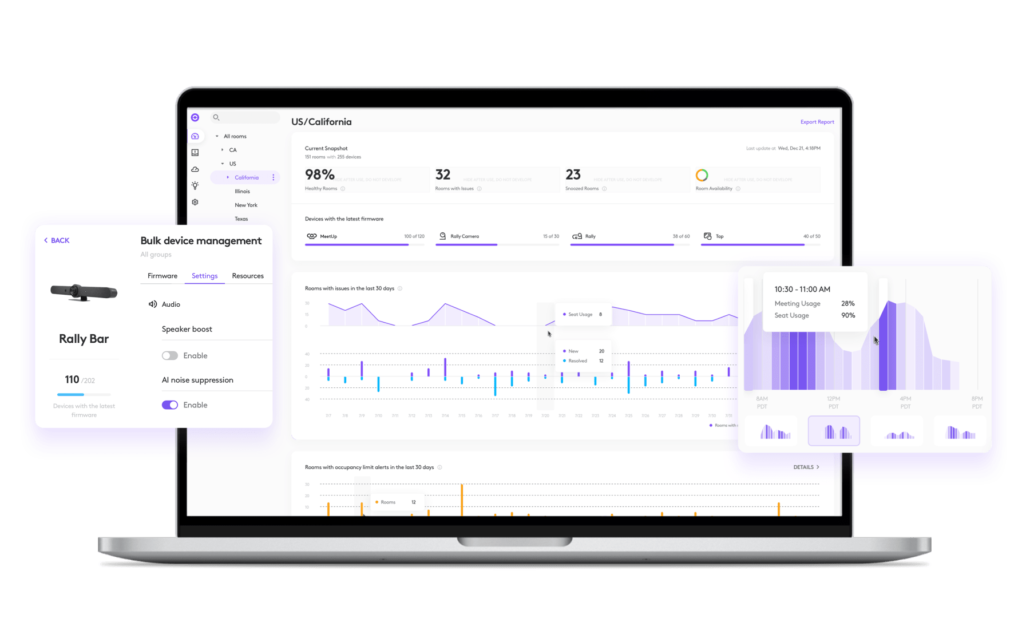
- Deploy and update firmware: Push updates to multiple Zone 305 headsets simultaneously, saving time and ensuring consistency across the organization.
- Monitor device health: Track important metrics such as battery life and connection status, ensuring devices are operating at peak performance.
- Generate reports: Gather insights into device usage and performance to make informed decisions for future deployments.
Logi Tune and Logitech Sync provide a complete solution for managing and maintaining Zone 305 headsets in an enterprise environment. Sync helps IT admins deploy and update firmware across the organization, while Tune empowers users to personalize their experience.
Side-by-Side Comparison: Zone 300 vs Zone 305
|
Specification |
Logitech Zone 300 |
Logitech Zone 305 |
|
Ideal For |
Consumers |
Business Professionals |
|
Models / MSRP |
981-001416 (Off-white) / $69.99 981-001411 (Rose) / $69.99 981-001406 (Midnight Black) / $69.99 |
981-001450 (Teams w/ receiver) / $99.99 981-001452 (UC w/ receiver) / $99.99 981-001457 (Teams, native Bluetooth) / $69.99 |
|
Bluetooth Version |
5.3 |
5.3 |
|
Certifications |
Works with Chromebook |
Microsoft Teams, Zoom, Google Meet, Google Voice, and Works With Chromebook |
|
Compatibility |
Common calling applications on Windows, macOS, ChromeOS, iOS, iPadOS, and Android devices via Bluetooth |
Works with Windows, macOS, or ChromeOS based computers via USB-C, USB-A, Bluetooth and iOS or Android Bluetooth enabled devices. |
|
Microphone |
Dual beamforming mics with noise-canceling algorithms |
Dual omni-directional MEMS mics with directional beamforming and DSP |
|
Flip-to-Mute Mic |
Yes |
Yes |
|
ANC (Active Noise Canceling Speakers) |
No |
No |
|
Passive noise canceling speakers |
Yes |
Yes |
|
Headset Weight |
4.30 oz (122 g) |
4.30 oz (122 g) |
|
In the Box |
Zone 300 wireless headset, USB-C to USB-C charging cable, User documentation |
Zone 305 wireless headset, USB-C receiver and USB-A adapter (For versions with receiver), (Only use the USB-A adapter with the provided headset), USB-C charging cable, Travel bag, User documentation |
|
Warranty |
1-Year Limited |
2-Year Limited |
|
Designed For |
Personal/Consumer Use |
Business/Enterprise Use |
|
Battery Life (Talk Time) |
Up to 16 hours |
Up to 16 hours |
|
Sustainability |
Black plastics: 55% post-consumer recycled material 6Excluding printed wiring assembly (PWA), cables, and packaging. Rose and Off-white plastics: 42% post-consumer recycled material 7Excluding printed wiring assembly (PWA), cables, and packaging. Paper Packaging: FSC™-certified Product carbon footprint: 8.5 kg CO₂e |
Plastics: Minimum 55% post-consumer recycled material 5Excluding printed wiring assembly (PWA), cables, and packaging. Paper Packaging: FSC™︎-certified Product carbon footprint: 10.21 kg CO2e (with receiver version) |
|
Headset Management |
Logi Tune |
Logi Tune, Logitech Sync |
Why Engage an Authorized Logitech Reseller?
When considering the purchase of business-grade headsets like the Logitech Zone 305, it’s essential to work with an authorized reseller such as Call One, Inc. We can help ensure you choose the right device for your organization, coordinate demos of Zone 305, and provide continued support post-deployment.
Conclusion
The Logitech Zone 300 and Zone 305 are great headsets but serve different purposes. The Zone 300 is ideal for personal or consumer use, offering essential features at a lower price point. At the same time, Zone 305 provides business professionals with certifications, advanced connectivity, and enterprise-grade management tools via Logi Tune and Logitech Sync. If your business is looking for affordable, high-quality headsets certified for Microsoft Teams and UC platforms, Zone 305 is the perfect choice. Contact Call One, Inc. today to schedule a demo and see how Zone 305 can enhance communication in your organization.

By engaging with Call One, Inc., you can ensure that your business gets the most out of Logitech Zone 305, from initial deployment to long-term device management.
Useful Resources:
Jabra Evolve2 30 vs. Jabra Evolve2 50: Which Professional Headset is Right for You?
/0 Comments/in Enterprise Headsets, Featured Articles, Open Office Solutions, Recent Post, Work At Home/by Danny HayasakaRecently, a viewer on our YouTube channel, youtube.com/@calloneinc, asked how the Jabra Evolve2 30 compares to the Jabra Evolve2 50. This question inspired me to write a blog that includes these two headsets’ features, similarities, and differences. Whether you’re in the market for a new headset or just curious about the differences, this blog will help you understand which model might be best suited for your needs.
Shared Features: The Foundation of Professional Excellence
Both the Jabra Evolve2 30 and Evolve2 50 are engineered to deliver exceptional audio quality, comfort, and durability. Here are the core features they share:
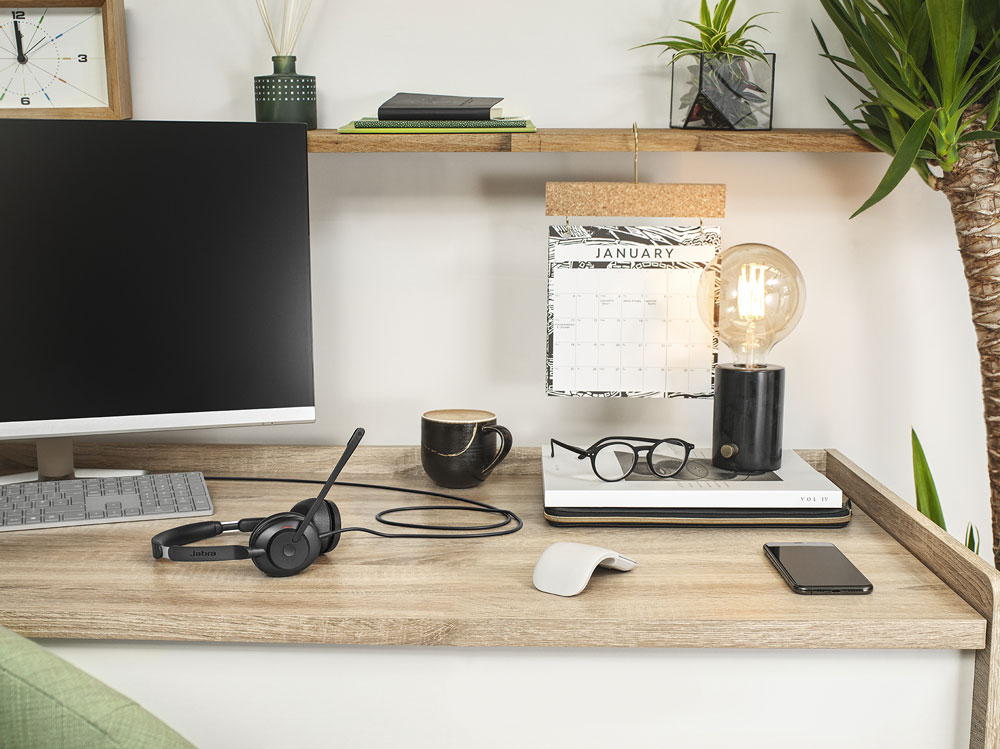
Superior Sound Quality:
Both headsets are equipped with 28mm speakers, providing clear, rich audio whether you’re on a call or listening to music. With a speaker frequency range of 20Hz – 20,000Hz, you can expect a full spectrum of sound for an immersive experience.
Superior Sound Quality:
Reliable Connectivity:
Both models offer USB-A and USB-C connectivity options, making them compatible with a wide range of devices. They are also certified for leading virtual meeting platforms like Microsoft Teams, Zoom, and Google Meet, ensuring seamless integration into your work environment.
Lightweight and Comfort:
Designed with long workdays in mind, both headset series are lightweight and comfortable! The Evolve2 30 mono variants weigh only 69g (2.4oz), or as much as a standard C battery, and the Evolve2 50 stereo models weigh only 148.9g (5.25oz), or as much as a standard baseball.
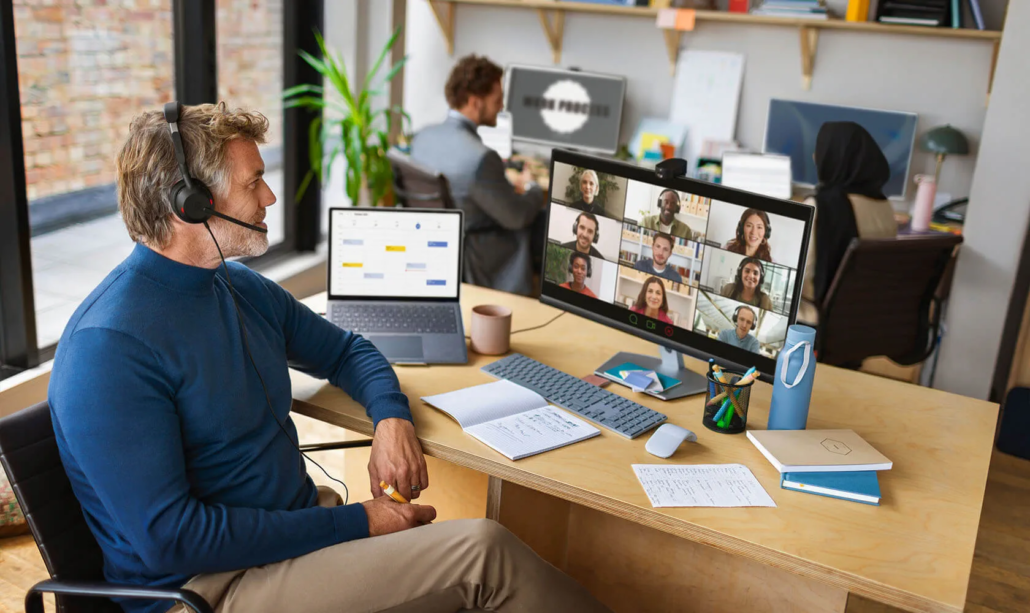
Platform Certifications:
Both headsets are certified for multiple platforms, including Microsoft Teams, Zoom, Google Meet. and others. This makes them versatile tools for communication across various platforms. Teams variants include a dedicated Microsoft Teams button and LED indicator light.
Device Management Software:
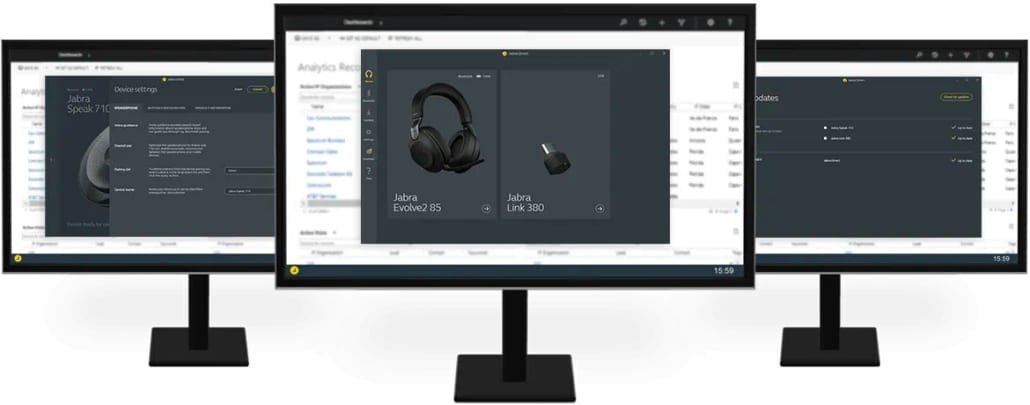
With hybrid and remote work being the norm, Jabra provides Jabra Direct and Jabra Xpress to manage your Evolve2 30 and Evolve2 50 headsets. Jabra Direct allows users to update their headset firmware, manage headset settings, personalize headset sound, and access support resources. Jabra Xpress 2.0 is a software solution designed for IT teams to 100% remotely manage Jabra audio and video solutions with smart tools. It is available cloud-based or on-premises.
Key Differences: Tailoring to Your Work Environment
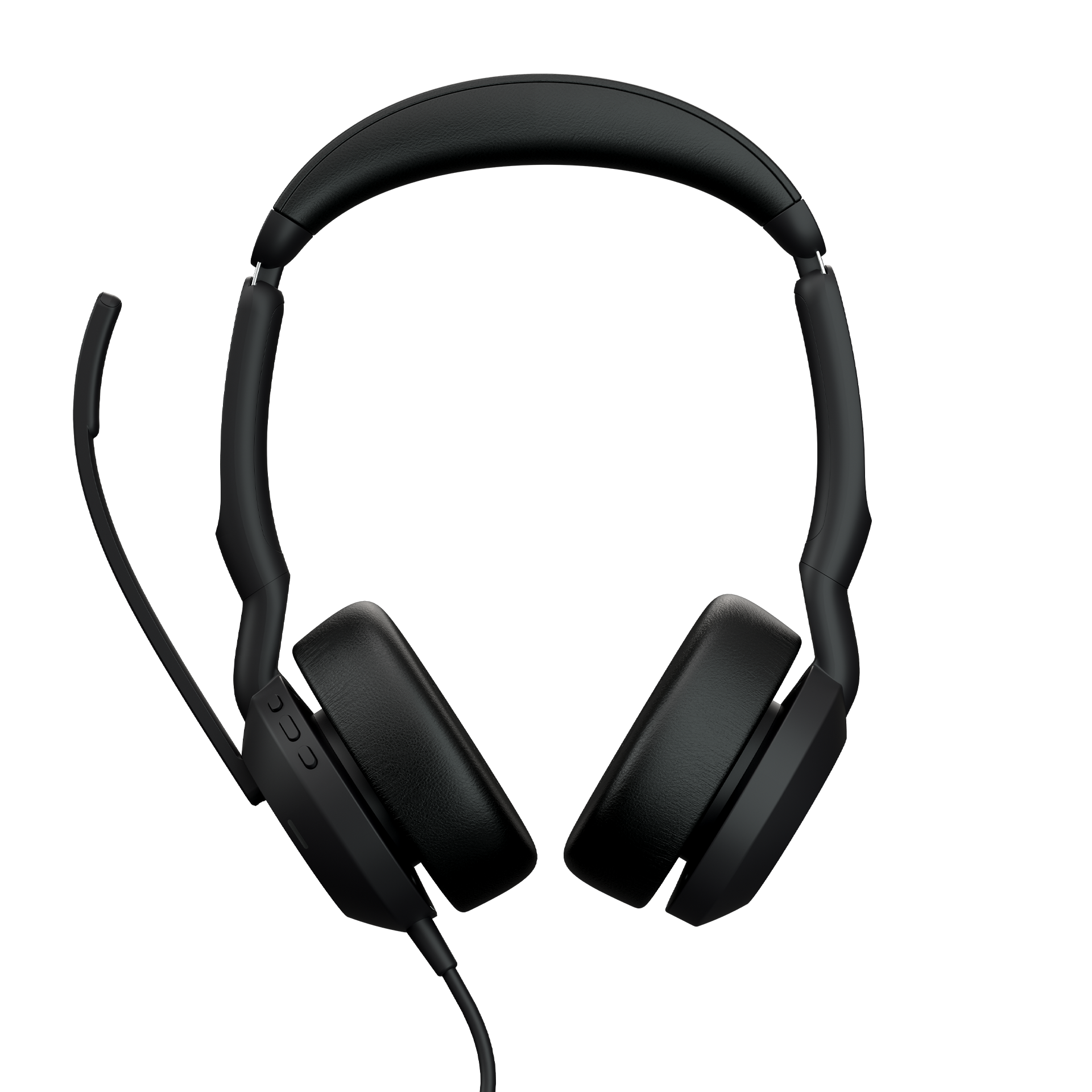
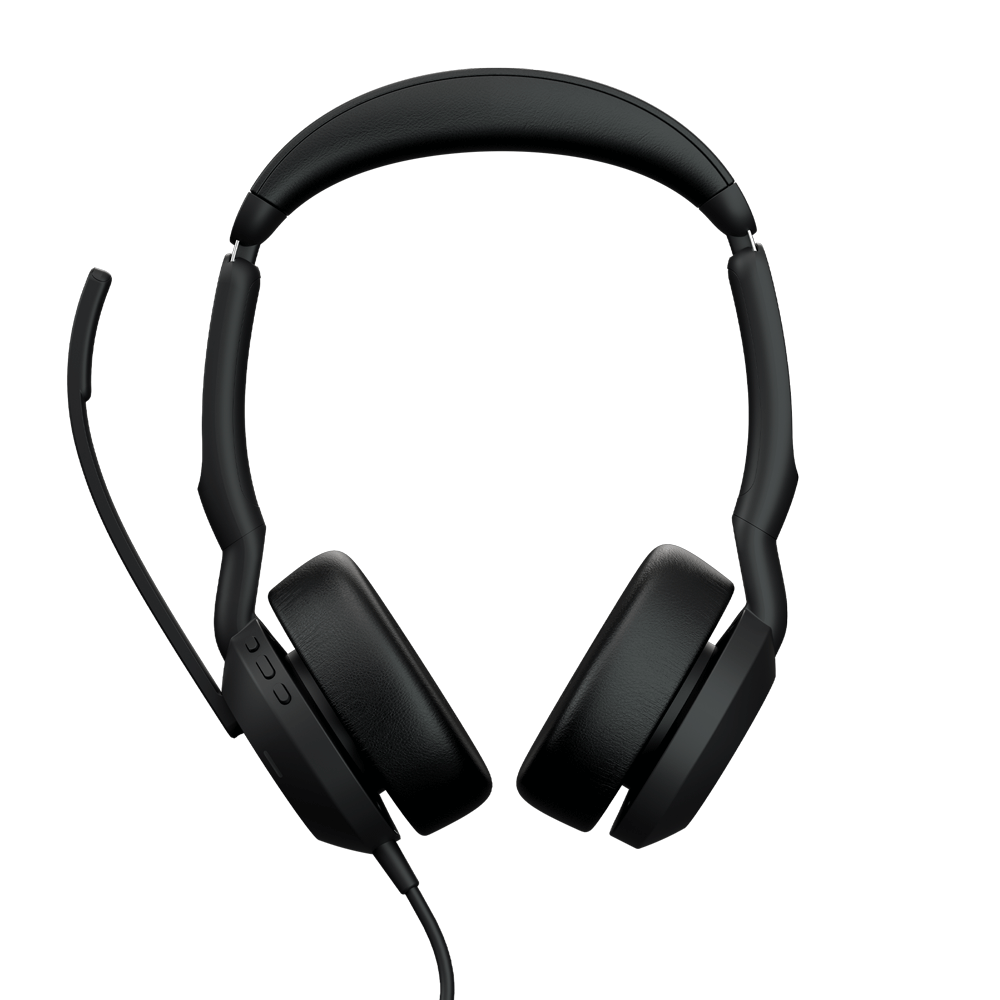
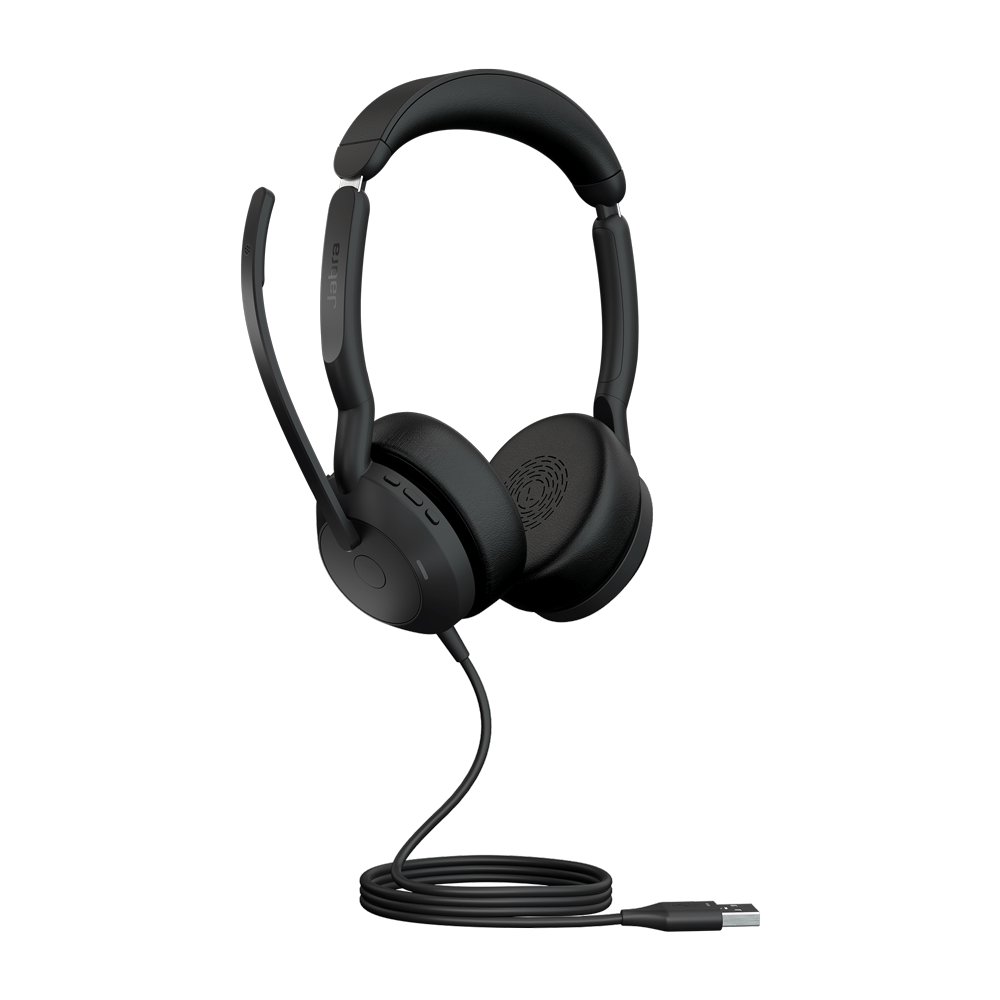
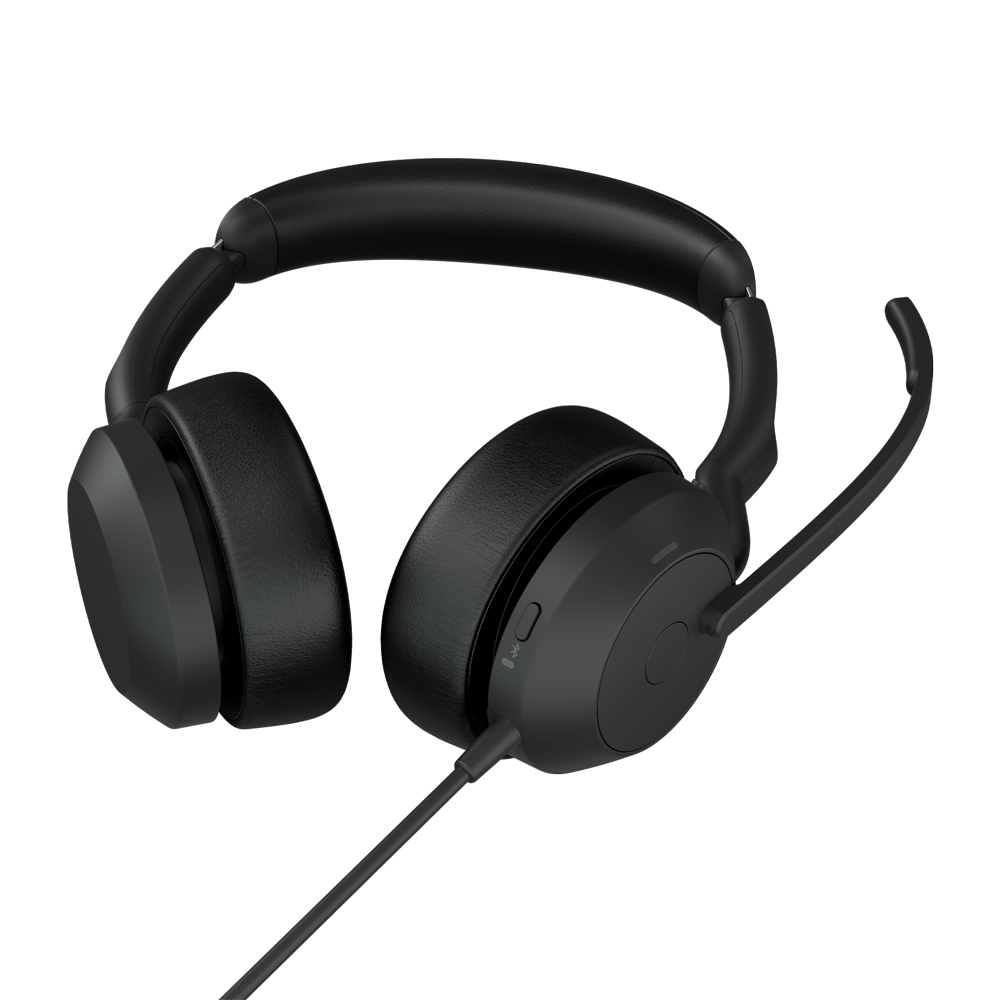
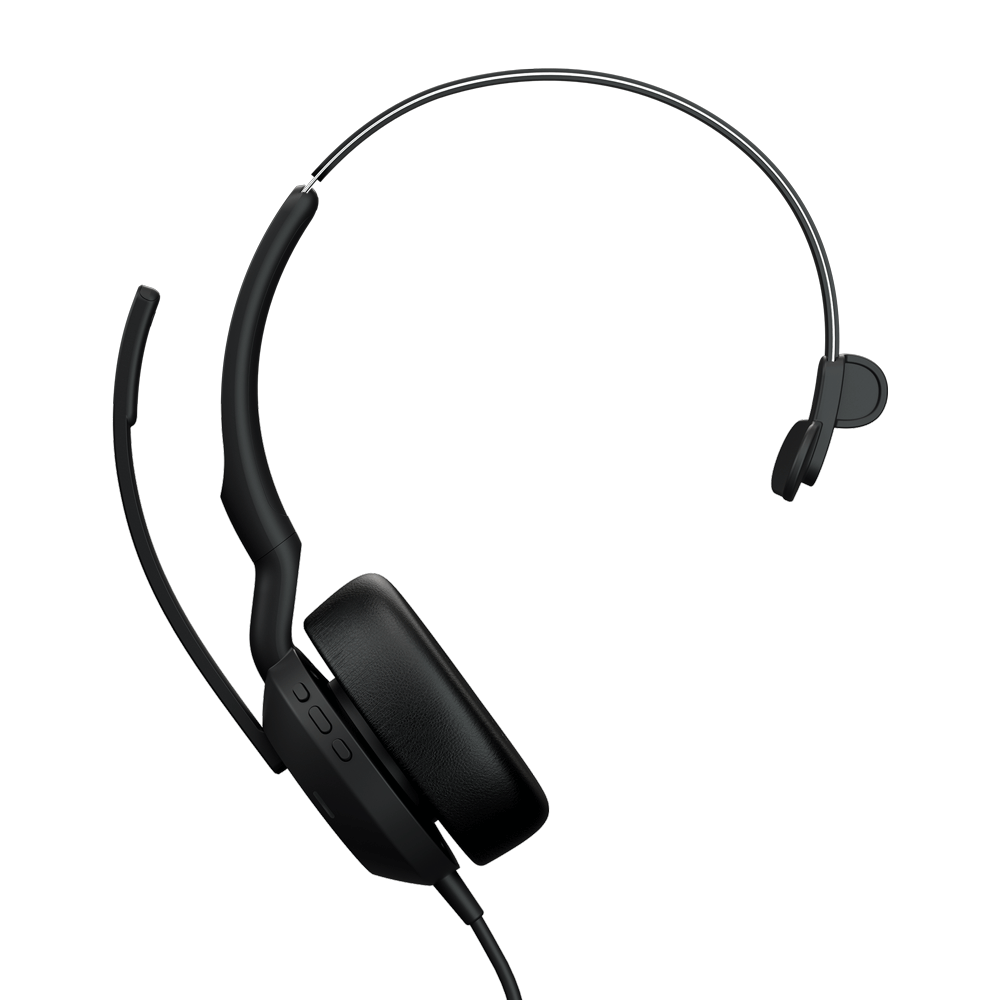
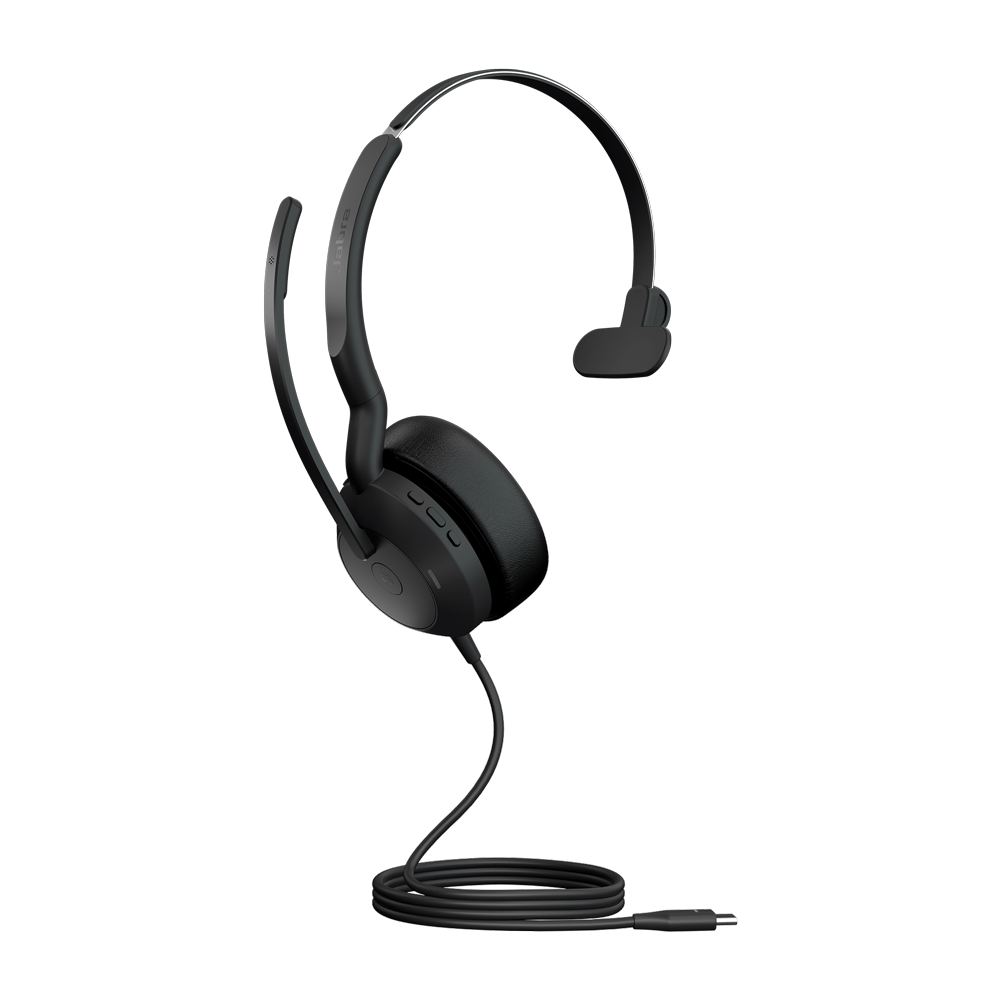
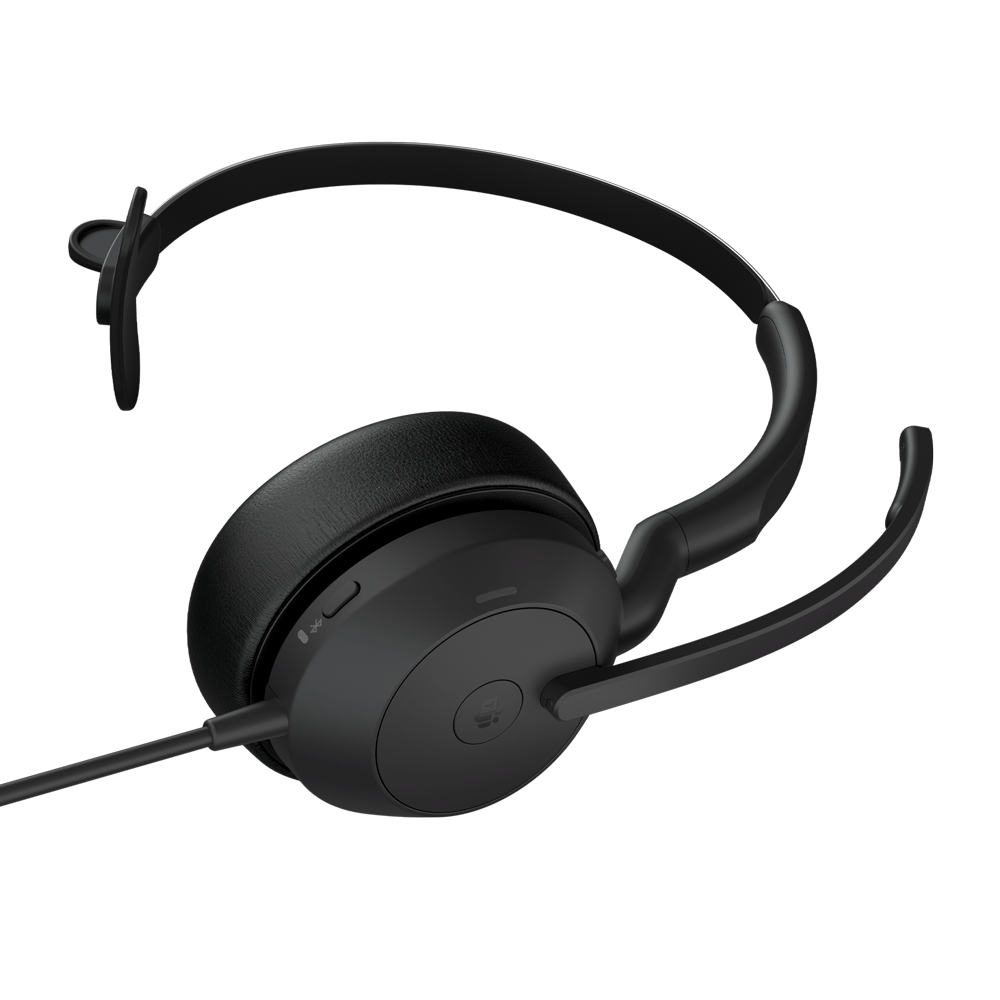
While the Jabra Evolve2 30 and Evolve2 50 share many similarities, their differences cater to specific needs and preferences.
Speaker Noise Cancellation:
- Evolve2 30: This model is equipped with a noise-isolating design that passively reduces background noise through memory foam ear cushions. This is ideal for quieter work environments where passive isolation is sufficient.
- Evolve2 50: For those who work in noisier environments, the Active Noise Cancellation (ANC) in the Evolve2 50 offers a significant advantage. ANC actively reduces ambient noise, allowing you to focus better and communicate clearly even in busy surroundings.
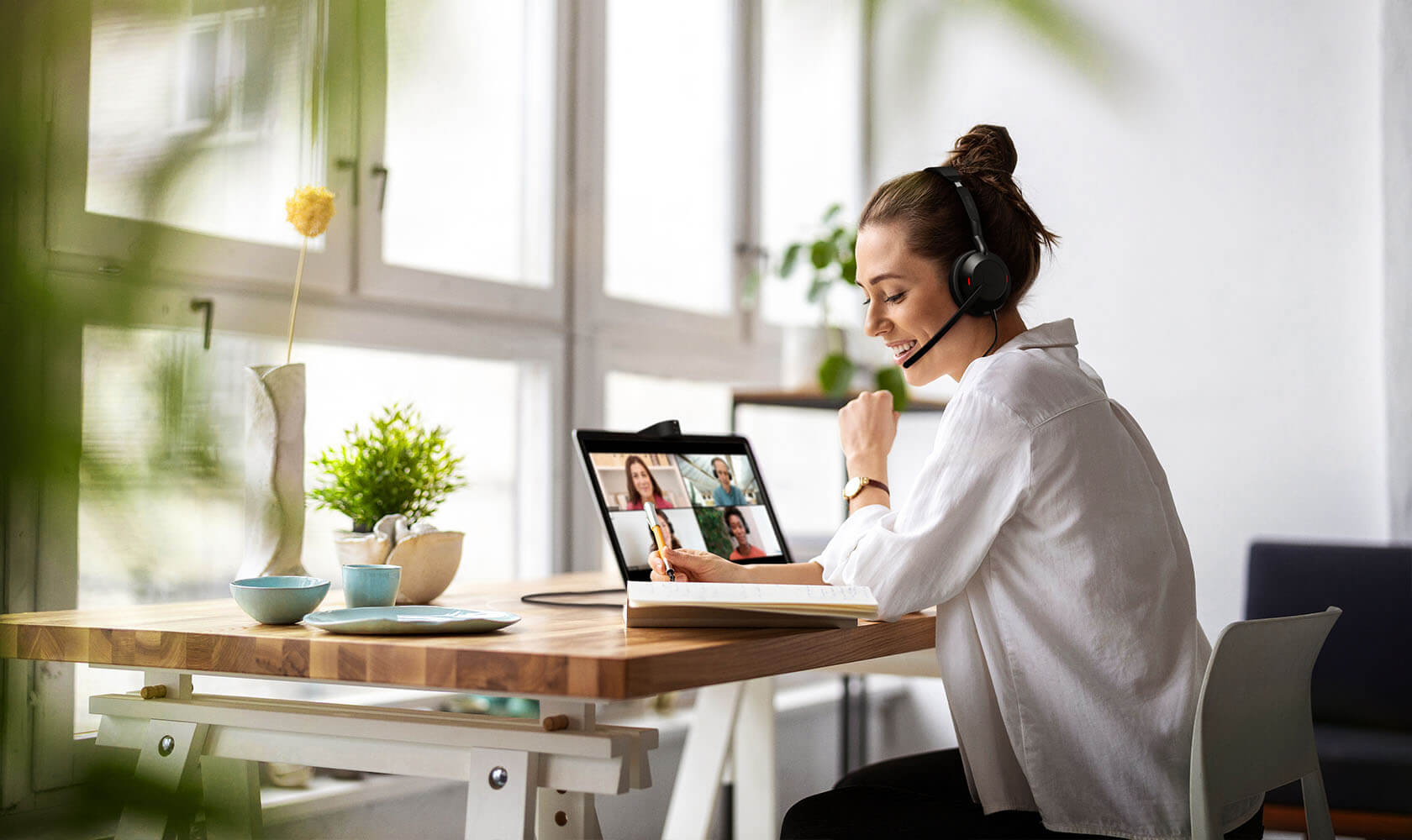
Microphone Technology:
- Evolve2 30: It has a smart 2-mic setup that does some cool things. First, it really hones in on your voice. Second, it actively tackles background noise, cutting down those distracting conversations by 12% (compared to the original Evolve 30). That’s a win for anyone working in a busy open office, and it meets the premium Microsoft Open Office standards, too. Check out this video! Jabra Evolve2 30 Overview and NC Mic Test
- Evolve2 50: Jabra kicks it up a notch by including a powerful chipset that runs algorithms to separate speech from noise. It’s like having a personal audio engineer, making sure the person on the other end hears you and not the blender or other background noise. Check out this video! Jabra Evolve2 50 vs. Real-World Noise: Lawn Mower, Blender & More
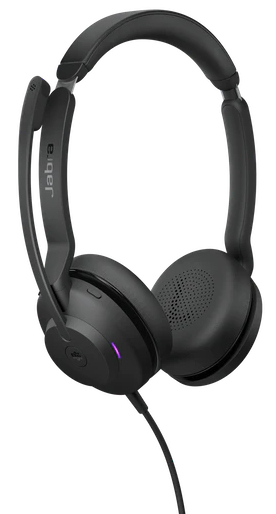
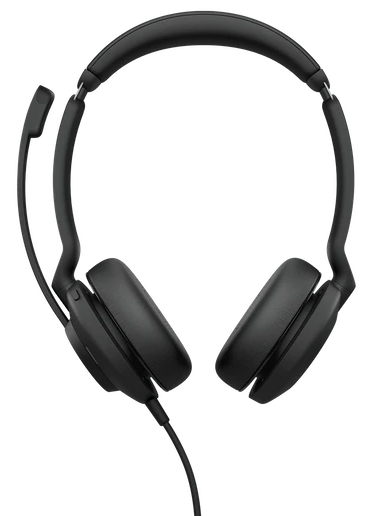
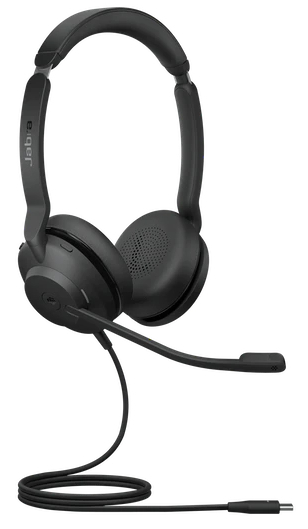
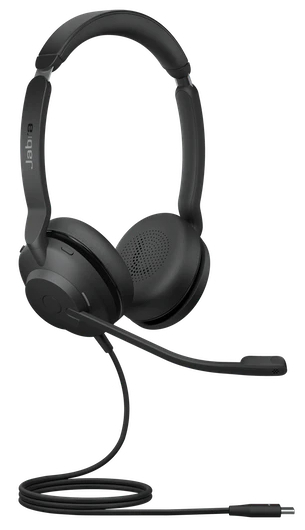
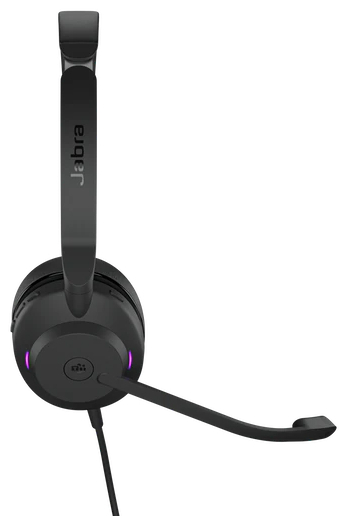
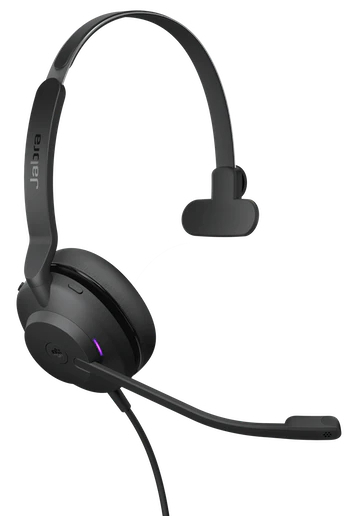
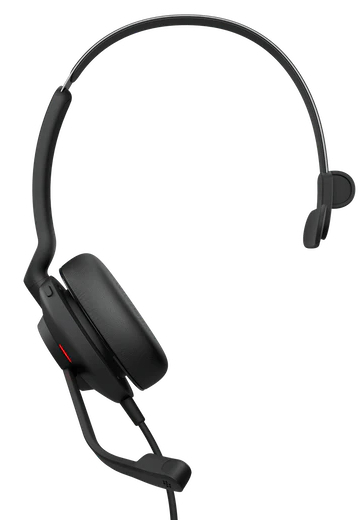
Comfort Innovations:
- Evolve2 30: Focuses on being lightweight and portable, making it easy to wear and carry around, especially for those who move between different workspaces.
- Evolve2 50: Introduces Jabra Air Comfort technology, which includes layers of ultra-soft perforated foam in the headband to prevent pressure build-up, providing all-day comfort even during long meetings or work sessions. Jabra Air Comfort technology is also available with the Jabra Evolve2 55 and Evolve2 65 Flex models.
Wireless Technology:
- Evolve2 30: This model is wired-only, making it a more straightforward choice for those who don’t require wireless connectivity.
- Evolve2 50: Offers Bluetooth 5.2 connectivity in addition to wired options, allowing for more flexibility. With a range of up to 30 meters, it’s ideal for users who need USB corded connectivity to their computers and wireless Bluetooth pairing to their mobile devices.

Ideal Use Cases: Choosing the Right Tool for the Job
- Jabra Evolve2 30: If your work involves primarily being at a desk in a relatively quiet environment, the Evolve2 30 is a perfect match. Its lightweight design and noise-isolating capabilities make it ideal for long hours of use without needing advanced features like ANC or wireless connectivity. It’s also a great option for those looking for a budget-friendly yet high-quality professional headset.
- Jabra Evolve2 50: For professionals who work in hybrid environments or frequently find themselves in noisy surroundings, the Evolve2 50 offers the advanced features necessary to maintain productivity and focus. Its combination of ANC, superior microphone technology, and wireless capability makes it a versatile tool that can adapt to various working conditions. Whether you’re in an open office, at home, or on the go, the Evolve2 50 is designed to keep up with your dynamic work life.

Conclusion
Both the Jabra Evolve2 30 and Evolve2 50 are excellent choices for professionals, but the right choice depends on your specific needs. If you need a simple, reliable, and comfortable headset for office use, the Evolve2 30 is a fantastic option. However, if you require more advanced noise cancellation, Bluetooth connectivity, and enhanced comfort for hybrid working environments, the Evolve2 50 is a better choice.
Understanding the similarities and differences between these two models allows you to select the headset that best aligns with your work style and environment, ensuring you stay productive and comfortable throughout your workday.
I strongly recommend you contact an Authorized Jabra Reseller like Call One, Inc. to help your organization get the right audio and video solutions.
Here’s a side-by-side comparison matrix.
|
Feature |
Jabra Evolve2 30 |
Jabra Evolve2 50 |
|
Ideal Use Case |
Office use, quieter environments, budget-friendly |
Hybrid work, noisy environments, flexible connectivity |
|
Box Contents |
Headset, felt pouch, warranty and warning information |
Headset, carry pouch, user documents |
|
Wearing Style |
On-ear Headband, Mono and Stereo variants |
On-ear Headband, Mono and Stereo variants |
|
Connectivity |
USB-A, USB-C (Wired only) |
USB-A, USB-C, Bluetooth 5.2 |
|
USB Cable Length |
1.5 m / 4.9 ft |
1.7m | 5.58ft |
|
Wireless Technology |
None |
Bluetooth 5.2 with up to 30m range |
|
Speaker Size |
28mm Ø |
28mm Ø |
|
Speaker Frequency Range (Music Mode) |
20Hz – 20,000Hz |
20Hz – 20,000Hz |
|
Speaker bandwidth (Speak mode) |
100Hz – 12000Hz |
150Hz – 6800Hz |
|
Jabra Direct, Jabra Xpress |
Jabra Direct, Jabra Xpress |
|
|
LED features and functions |
Busylight, incoming call, Microsoft Teams notifications (Teams variants) |
Busylight, incoming call, Microsoft Teams notifications (Teams variants) |
|
Microphone Type |
1 Analog MEMS and 1 Analog ECM |
2 Analog MEMS / 2 Digital MEMS (Stereo) | 1 Analog MEMS / 2 Digital MEMS (Mono) |
|
Active Noise Cancellation (ANC) |
No |
Yes |
|
Noise Isolation |
Passive noise isolation through memory foam ear cushions |
Active Noise Cancellation (ANC) |
|
Comfort Features |
Lightweight, memory foam ear cushions, ergonomic design |
Jabra Air Comfort technology, ultra-soft perforated foam in headband |
|
Certifications |
Microsoft Teams. Meets Microsoft Teams Open Office requirements.(Teams Variants) |
Cisco, Unify, Microsoft Teams (variant dependent), Zoom, |
|
Weight (Stereo Variant) |
Stereo with cable 125g | 4.4oz, Stereo without cable 102g | 3.6oz |
148.9g | 5.25oz |
|
Weight (Mono Variant) |
Mono with cable 92g | 3.2oz, Mono without cable 69g | 2.4oz |
99g | 3.49oz |
|
Operating Temperature |
-10°C to +55°C (14°F to 131°F) |
-10°C to +55°C (14°F to 131°F) |
|
Materials used |
Headband cushion ultra soft foam covered in color-matched leatherette, ear cushion |
Leatherette, PC & PC/ABS plastic, stainless steel |
|
Warranty |
2 years |
2 years |
As of writing this blog post, here are the current Jabra Evolve2 30 SE (Second Edition) and Evolve2 50 models:
|
Call One, Inc. SKU |
Description |
|
JBR-23189-999-979-005 |
Jabra Evolve2 30 SE, USB-A, MS Stereo |
|
JBR-23189-999-879-005 |
Jabra Evolve2 30 SE, USB-C, MS Stereo |
|
JBR-23189-989-979-005 |
Jabra Evolve2 30 SE, USB-A, UC Stereo |
|
JBR-23189-989-879-005 |
Jabra Evolve2 30 SE, USB-C, UC Stereo |
|
JBR-23189-899-979-005 |
Jabra Evolve2 30 SE, USB-A, MS Mono |
|
JBR-23189-899-879-005 |
Jabra Evolve2 30 SE, USB-C, MS Mono |
|
JBR-23189-889-979-005 |
Jabra Evolve2 30 SE, USB-A, UC Mono |
|
JBR-23189-889-879-005 |
Jabra Evolve2 30 SE, USB-C, UC Mono |
|
JBR-25089-889-899-003 |
Jabra Evolve2 50 – USB-C UC Mono |
|
JBR-25089-889-999-003 |
Jabra Evolve2 50 – USB-A UC Mono |
|
JBR25089-899-899 |
Jabra Evolve2 50 – USB-C MS Mono |
|
JBR25089-899-999 |
Jabra Evolve2 50 – USB-A MS Mono |
|
JBR-25089-989-899-003 |
Jabra Evolve2 50 – USB-C UC Stereo |
|
JBR-25089-989-999-003 |
Jabra Evolve2 50 – USB-A UC Stereo |
|
JBR25089-999-899 |
Jabra Evolve2 50 – USB-C MS Stereo |
|
JBR25089-999-999 |
Jabra Evolve2 50 – USB-A MS Stereo |
Introducing the Logitech Zone 305 for Business: A New Standard in Professional Audio
/0 Comments/in Enterprise Headsets, Featured Articles, Open Office Solutions, Recent Post, Work At Home/by Danny HayasakaAs technology evolves, so does the demand for high-quality, reliable audio solutions in professional environments. At Infocomm 2024, I had the opportunity to visit the Logitech booth and receive a sample of their latest innovation—the Logitech Zone 305 for Business headset. This new headset, with its advanced features and exceptional performance, is set to redefine the standards for business communication.

Unpacking the Logitech Zone 305 for Business
Upon unboxing, the Logitech Zone 305 looks like an upgraded, updated, more modern design wireless version of the top-selling Logitech H390. Logitech is known for creating aesthetically pleasing products, and the Zone 305 is no exception. The headset is lightweight (only 122g) and comfortable, suitable for extended use throughout the workday. I have the Teams certified model that includes the Zone 305 headset, USB-C receiver, USB-C to USB-A adapter, USB-C to USB-C charging cable, Travel bag, and User documentation. Here are the three Zone 305 for Business Models:
Key Features and Specifications
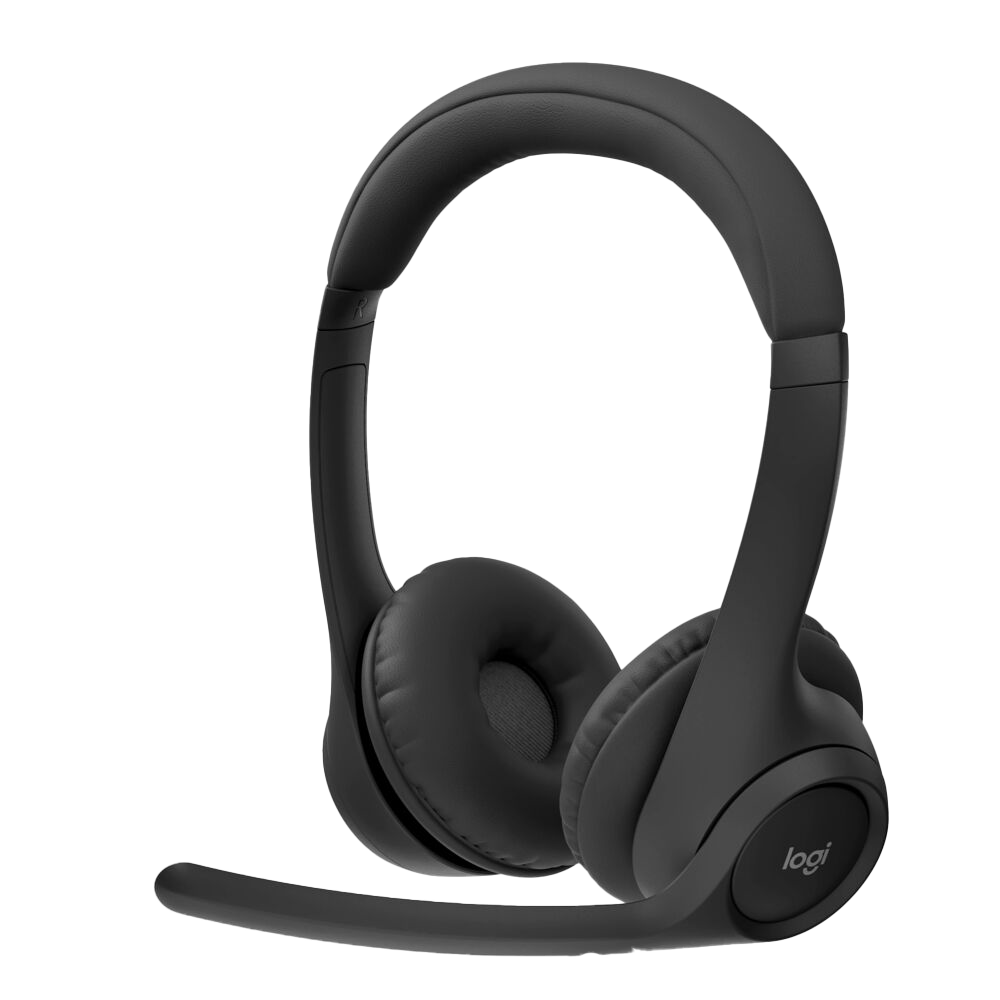


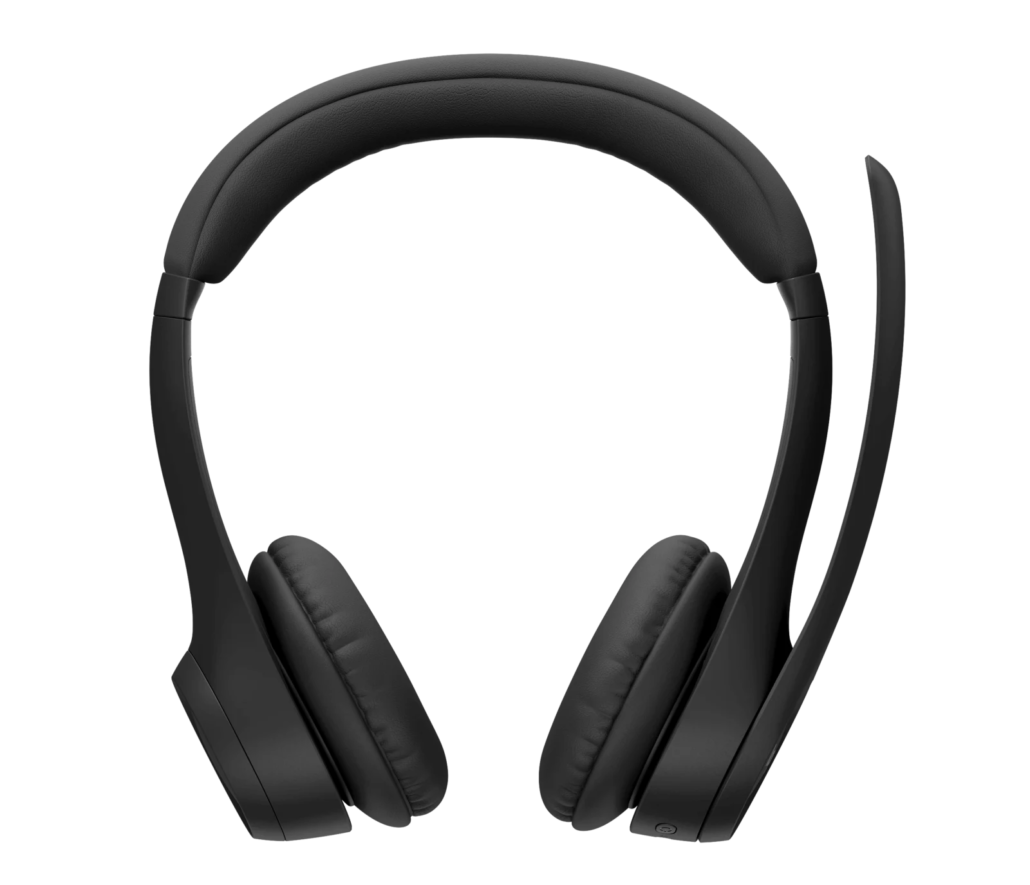
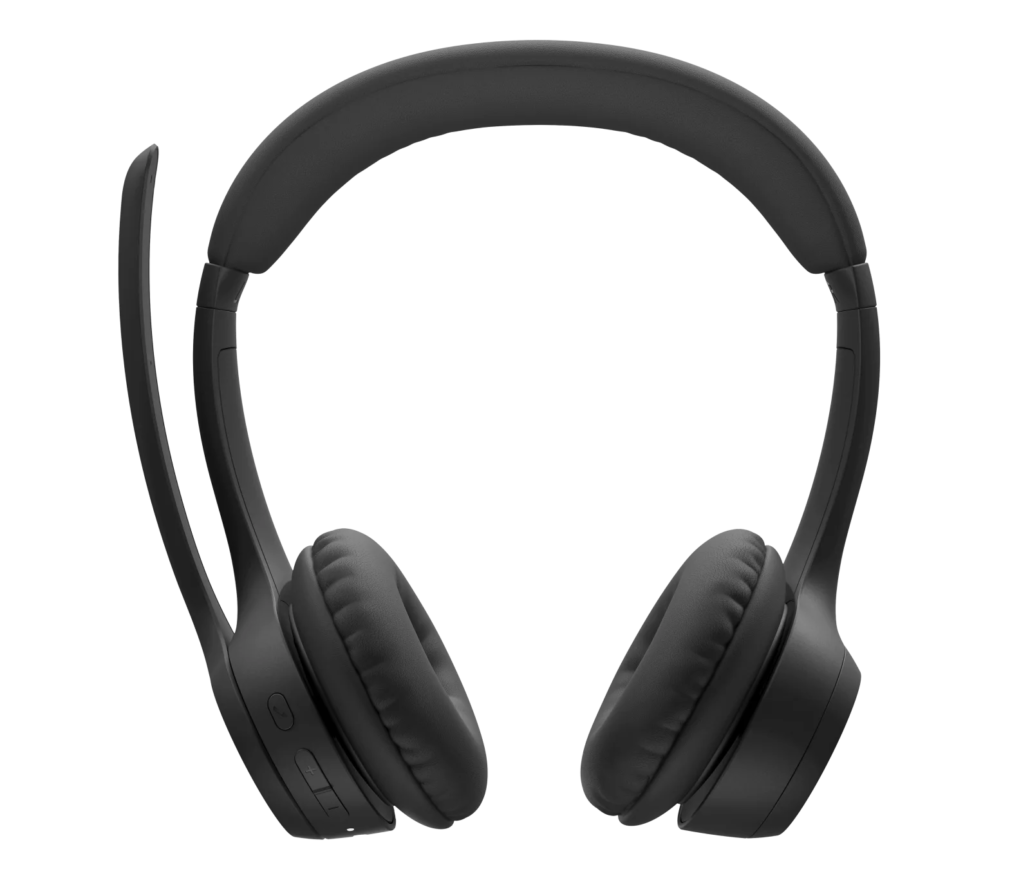
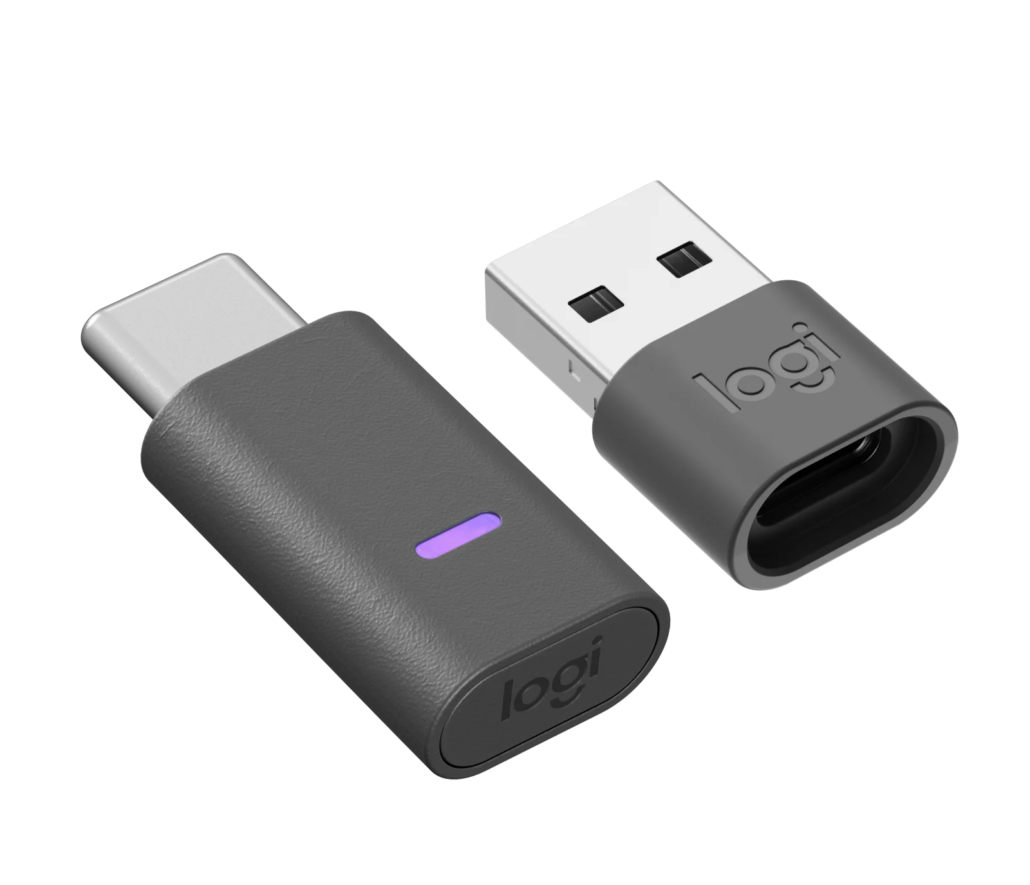

1. Crystal-Clear Audio: The Zone 305 has advanced audio drivers that deliver crystal-clear sound quality. Whether on a conference call, listening to music, or watching videos, the audio experience is immersive and precise.
2. Noise-Canceling Microphone: Background noise can be a significant distraction regardless of the work environment. The Zone 305 features a noise-canceling microphone that filters out ambient noise, ensuring your voice is loud and clear during calls.
3. Teams Version with Native Bluetooth: One of Zone 305’s standout features is the Teams version, which has native Bluetooth support. This makes it incredibly easy to pair the headset with multiple devices and switch between them seamlessly. It’s perfect for professionals who need to stay connected on the go.
4. All-Day Comfort: Comfort is crucial for headsets, especially those who wear them for extended periods. The Zone 305 is designed with soft ear cushions and an adjustable headband, providing all-day comfort without compromising on durability. And it only weighs 122g, or as much as a standard deck of playing cards.

5. Move Around Freely with Great Battery Life: The Zone 305 will connect reliably to two devices with up to 30 m / 98 ft wireless range via Bluetooth or plug-and-play USB-C receiver, allowing you to move around your workspace. The Logitech Zone 305 provides up to 16 hrs of talk time and 20 hrs of listening time to support an entire workday and then some. You can get a full charge in 2 hours and up to 1-hour of talk time with a 5-minute quick charge.
6. Easy Controls and Integration: The headset features intuitive on-ear controls for adjusting volume, answering calls, and activating voice assistants. Additionally, it integrates smoothly with popular collaboration platforms, including Microsoft Teams, Zoom, and Google Meet. The Teams-certified models have a dedicated Teams button.
7. Customize via Logi Tune: Zone 305 can be managed by Logi Tune, allowing you to customize the settings to your preferences. Within Logi Tune, you can see the remaining available battery life and check for firmware updates. Other available settings and options: Sidetone (0%-20%), Mic level (0%-100%), Equalizer (Default, Volume boost, Podcast, Bass boost or Custom), Headset diagnostics (Test speakers and mic), Device name (Allows you to rename headset), Sleep settings ( 5 min, 10 min, 15 min, 30 min, 1 hr, 2 hr, 4hr or Never), Rotate to mute (turn on/off), Voice prompts (turn on/off), Headset language (English, French, Spanish, German, Italian, or Portuguese), and Connected devices: See which devices the Zone 305 is currently connected to.
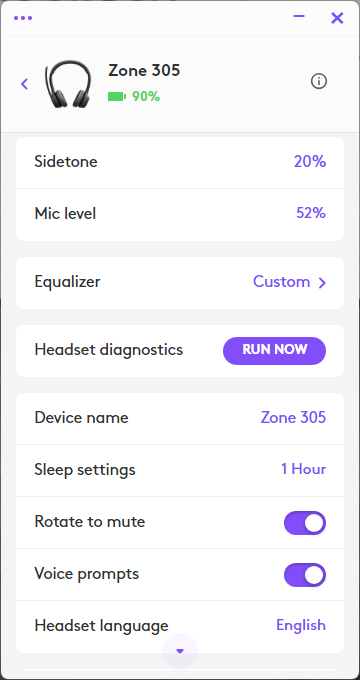
8. Competitive Pricing: Cost is a crucial factor for large enterprises with mass deployments. The Logitech Zone 305 is priced competitively, starting at an MSRP of $69.99 for the Teams version with native Bluetooth. For those requiring UC and Teams Certified models with dongles, the MSRP is $99.99. This affordable pricing makes it an attractive option for businesses looking to equip their teams with high-quality headsets without breaking the budget.

Commitment to Sustainability
In today’s world, sustainability is more important than ever, and Logitech has taken significant steps to ensure that Zone 305 for Business is an environmentally responsible choice. Here’s how:
1. Made with Recycled Plastic: Zone 305 is made with 55% post-consumer recycled plastic, helping to reduce waste and minimize the environmental impact of new plastic production.
2. Responsible Packaging: The headset comes in FSC™-certified paper packaging, ensuring that the materials used are sourced from responsibly managed forests that provide environmental, social, and economic benefits.
3. Certified Carbon Neutral: The Zone 305 is certified carbon-neutral. This means that the carbon impact of the product and its packaging has been reduced to zero through Logitech’s investment in carbon offsetting and removal projects. This commitment to carbon neutrality is a testament to Logitech’s dedication to sustainability.
4. Replaceable Parts: To enhance the product’s longevity, the Zone 305 features replaceable earpads. This not only extends the headset’s life but also reduces the need for frequent replacements, further contributing to environmental conservation.
Hands-On Experience

The Logitech Zone 305 was easy to charge; simply connect via the included USB-C charging cable. Setting up was easy. I connected the USB-C receiver (dongle) to my Logi Dock and turned the headset on. Logi Tune recognized the headset and notified me of an update. Pairing the Zone 305 to my mobile phone was easy; I pressed the power button until it went into pairing mode. I select “Zone 305” on my Bluetooth menu, and they “connected.” After pairing it with my mobile and updating the firmware, I used Zone 305 in Zoom, Teams, Google Meet, and mobile calls. The headset’s sound quality is exceptional, making my virtual meetings and calls more productive and enjoyable. The noise-canceling microphone ensures I am heard clearly, even in a noisy environment (Yes, I have done the blender test!).
The comfort of the headset is another highlight. The lightweight design and cushioned ear pads make it easy to wear for hours without discomfort. Whether working at my desk or moving around my home office, Zone 305 stays securely in place.

Conclusion
The Logitech Zone 305 for Business is a versatile and high-performing headset that meets the demands of today’s professionals. Its combination of superior audio quality, noise-canceling capabilities, and seamless connectivity makes it an ideal choice for anyone looking to enhance their communication experience. The Teams version with native Bluetooth is particularly noteworthy, offering flexibility and convenience that is hard to match.
With competitive pricing starting at just $69.99 for the Teams version with native Bluetooth and $99.99 for UC and Teams Certified models with dongles, the Logitech Zone 305 is an attractive option for large enterprises looking for cost-effective yet high-quality audio solutions. The commitment to sustainability, using recycled materials, responsible packaging, carbon neutrality, and replaceable parts makes it a conscientious choice for environmentally aware organizations.
If you’re in the market for a new business headset, the Logitech Zone 305 is worth considering. Its innovative features and user-friendly design make it a standout option for individual users and teams. I recommend contacting a Logitech Business Authorized Reseller like Call One, Inc. for additional information on Logitech’s audio and video solutions for personal and team workspaces.
Stay tuned for more updates and reviews as I continue to test and explore the latest tech products in the industry. In the meantime, check out our latest product review and demo videos!

Top 5 Most Comfortable UC Bluetooth Headsets
/0 Comments/in Enterprise Headsets, Featured Articles, Open Office Solutions, Recent Post, Work At Home/by Danny HayasakaAs an experienced tester of numerous headsets, I am frequently asked about their comfort levels for extended use. However, it’s important to note that ‘comfort’ is a subjective term that varies from person to person. Multiple variables impact ‘comfort,’ including personal preferences, head and ear shape and size, and even the amount and type of hair! For example, my wife has long, curly hair and prefers earbuds over headband-style models because her hair gets caught in the headset when putting on and removing it.
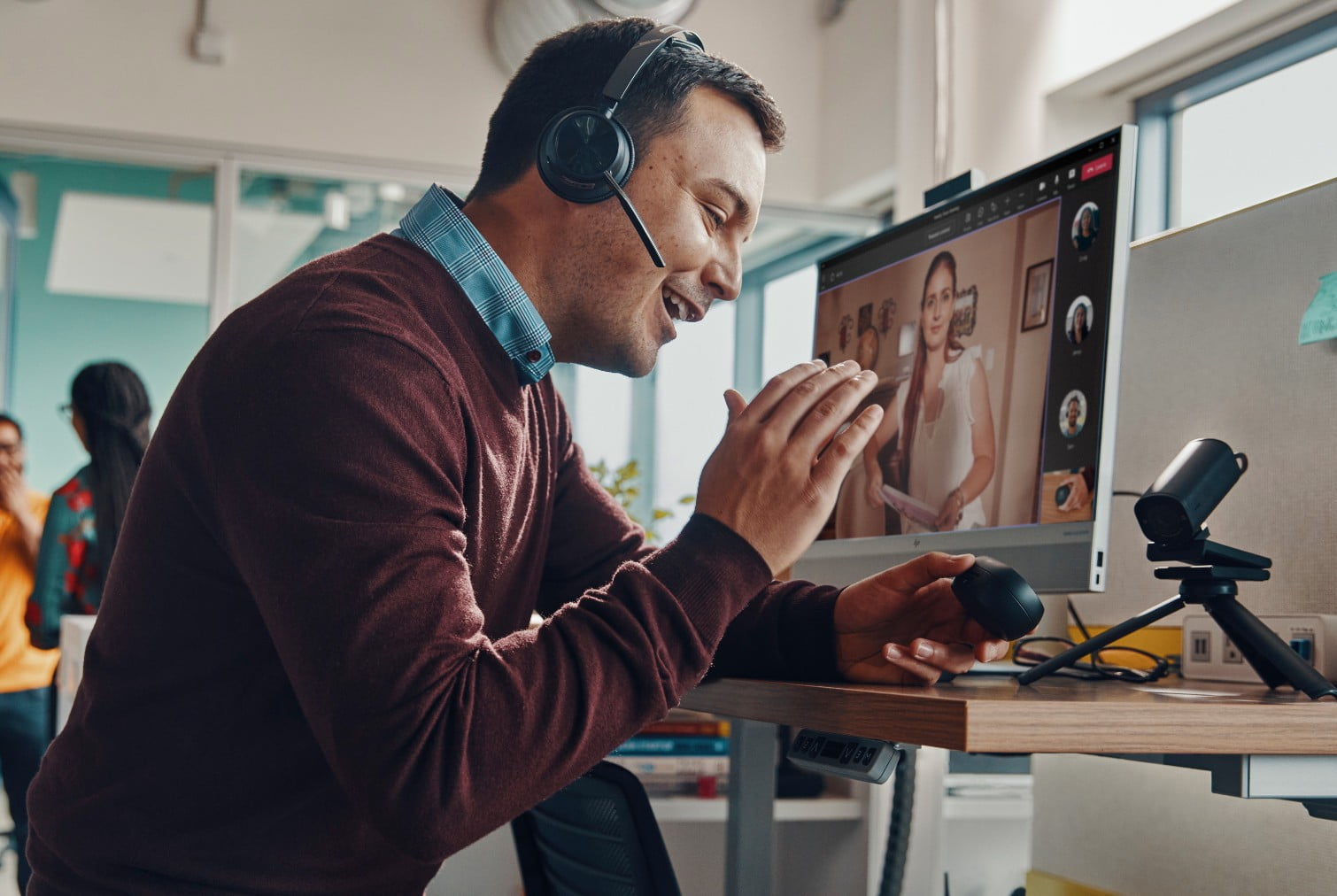
Headset Comfort Tests
Depending on my work, I test each headset for at least a week, some for several weeks. I do my best to wear the headset for 8 hours (if comfortable enough) and use it with and without glasses. Some headsets get uncomfortable after a short period while wearing glasses. I also do the ‘around the neck’ test. This is a test where I place the headset around my neck to identify how comfortable it is. Some pinch my throat or are too big and bulky and get uncomfortable. The ‘DJ test’ is another I perform when testing dual ear headset models. This requires me to uncover one ear while keeping one ear covered. Some sit comfortably on my head without assistance, and some I have to hold in place, or they may fall off. I also drink from a glass and try to eat food. They sound like silly tests. However, you’d be surprised at the questions I get.

Designed for Work From Anywhere
These headsets are designed for seamless connectivity with computers and mobile devices, making them perfect for professionals working from various locations (work from anywhere). They are also optimized or certified for leading UC platforms and applications like Microsoft Teams, Zoom, and Google Meet. Additionally, these have solid-performing noise-canceling mics to help suppress background noise regardless of where you work.
Top 5 Most Comfortable UC Bluetooth Headsets
Here are my top five most comfortable UC Bluetooth Stereo headsets. Please note that the order of the headsets, except for the top one, does not indicate their ranking.

Jabra Evolve2 65 Flex – This headset weighs 136 g (4.8 oz) or as much as a hamster or 4 AA batteries. The Evolve2 65 Flex utilizes Jabra Air Comfort Technology. Jabra’s Air Comfort Technology revolutionizes headset comfort with a redesigned earcup cushion pattern and material that evenly distributes pressure. A softer, more responsive inner earcup material further reduces pressure points, while the perforated headband design evenly distributes pressure on the head’s crown. Years of engineering have perfected this technology, creating a near-weightless feel even during extended wear. Experience the next level of comfort with Jabra Air Comfort, available on the Evolve2 65 Flex, Evolve2 55, and Evolve2 50 models.
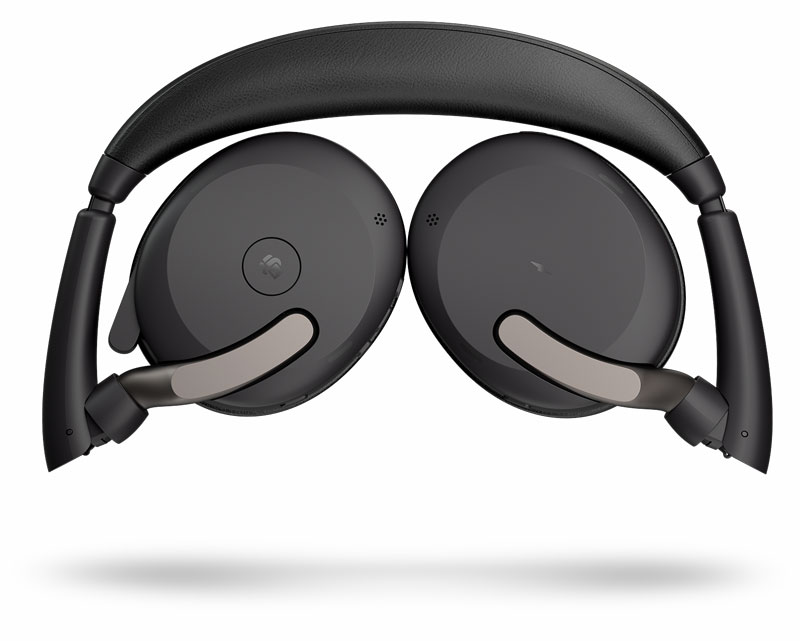
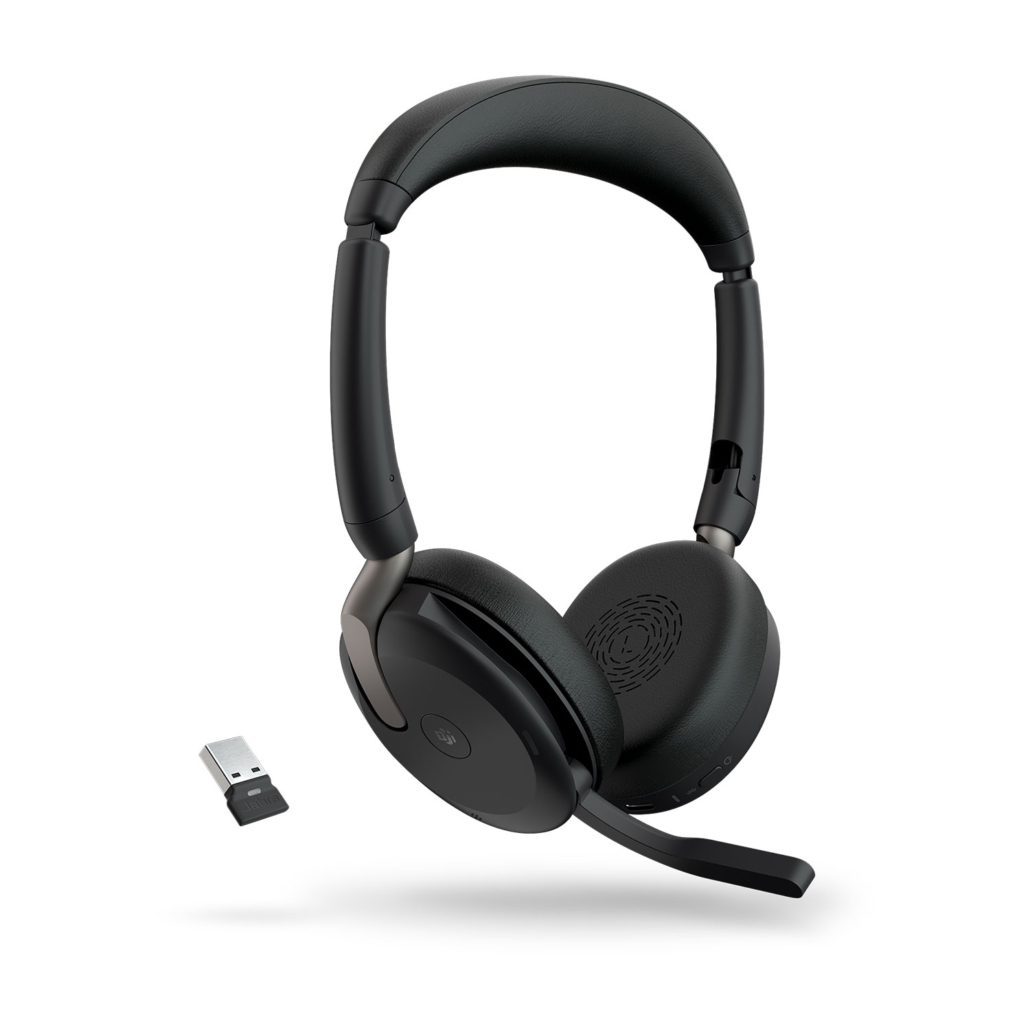
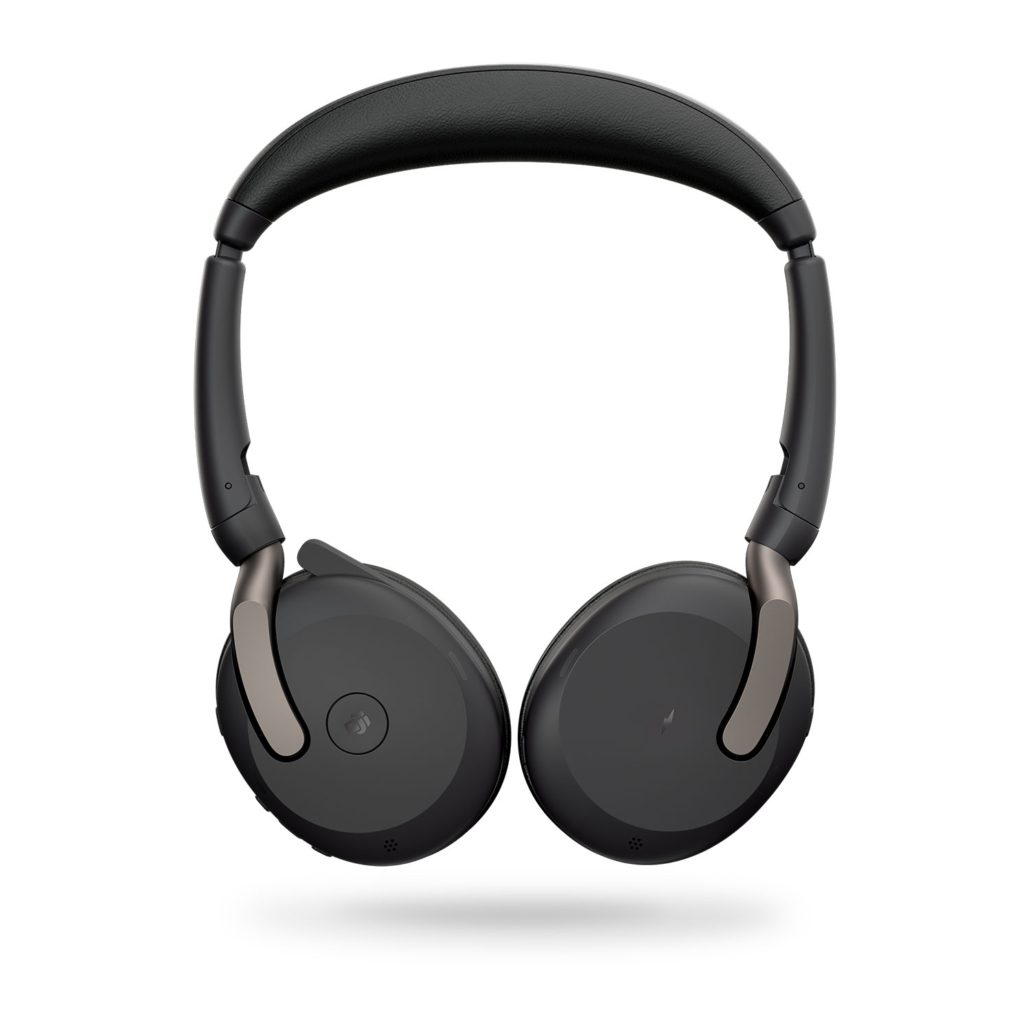
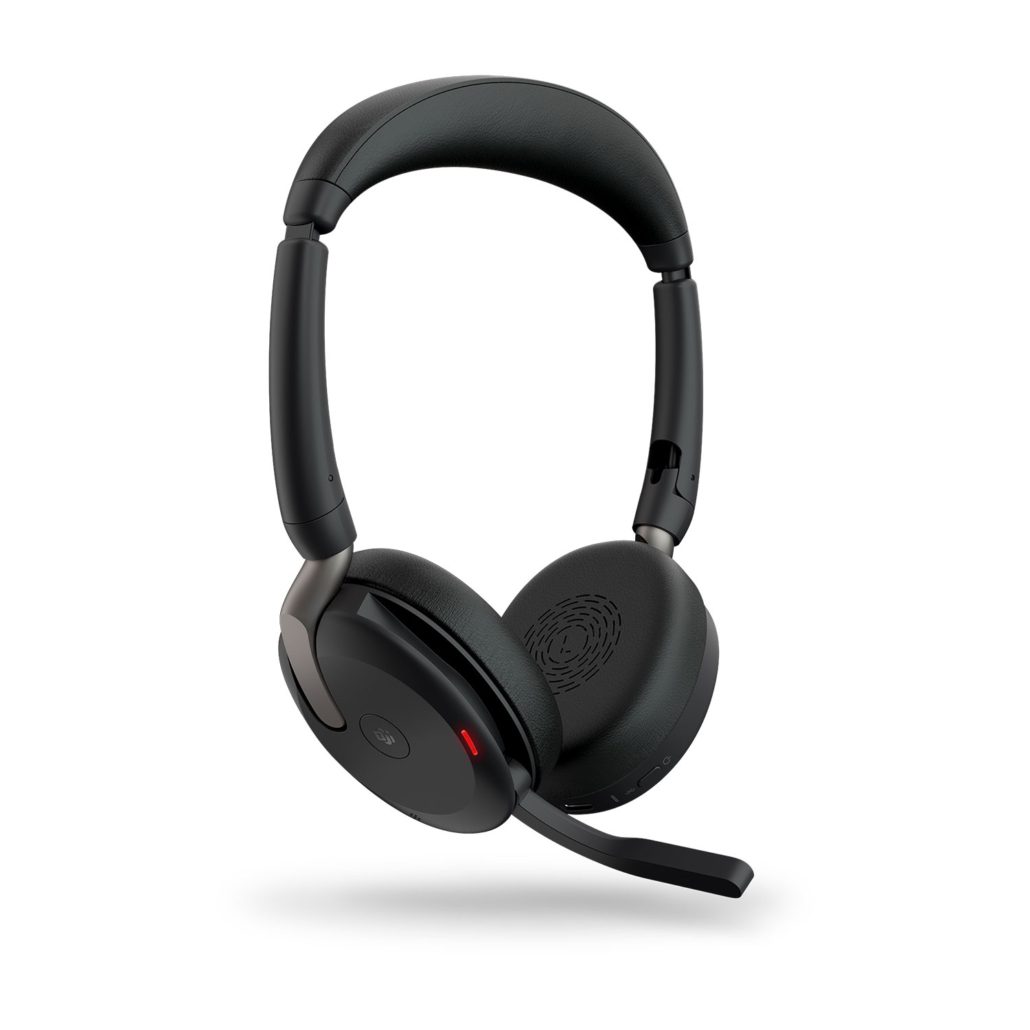
Shokz Opencomm2 UC – This headset weighs 33 g (1.16 oz) and is the lightest on my list. The Opencomm2 weighs less than a golf ball (45g). Unlike traditional headsets that cover or go into your ears, the Opencomm2 UC sits outside the ear canal. This eliminates the discomfort or fatigue often associated with prolonged use of in-ear or over-ear headphones. The headset is built with a lightweight titanium frame, which makes it easy to wear for extended periods without feeling weighed down. The Opencomm2 UC utilizes bone conduction technology, which transmits sound through vibrations in your cheekbones to your inner ear. This eliminates the need for earbuds or earcups, further enhancing comfort. The headset features a wraparound design with a silicone band that helps keep it securely in place without causing excessive pressure or discomfort.




HP Poly Voyager Focus 2 – This headset weighs 175 g (6.08 oz), comparable to a hockey puck or billiard ball. The headband is designed to be lightweight, reducing pressure on the top of your head with a sling design that helps distribute the headset’s weight evenly, preventing it from feeling too heavy on any one spot. This is currently the only headset I’ve tested that has this feature. The ear cushions are made from a soft, plush material that conforms to the shape of your ears, providing a comfortable and secure fit. The headband and ear cups are lined with soft padding to enhance comfort further and reduce pressure points.


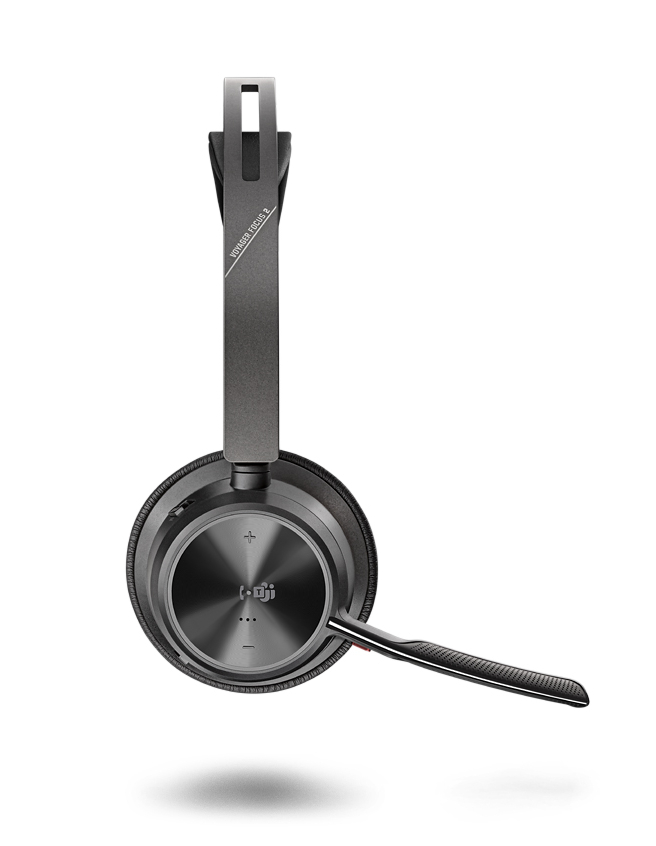
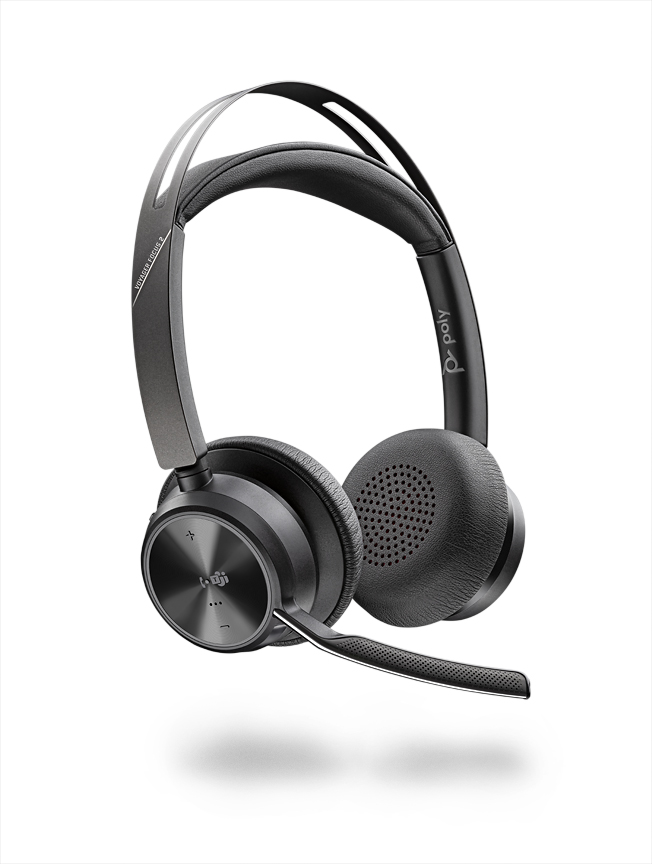
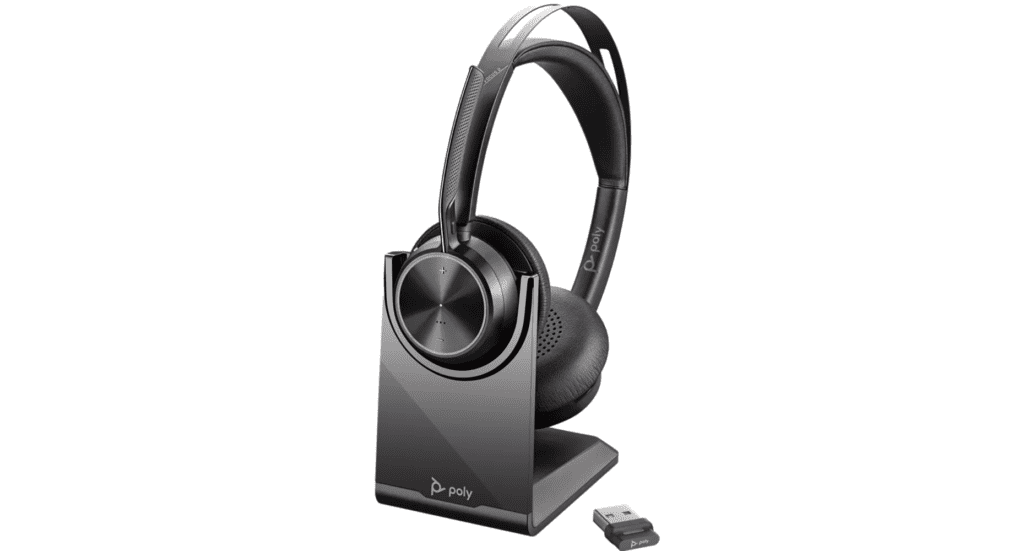

Yealink BH70 Stereo – This headset weighs 147 g (5.19 oz), less than a medium-sized apple. As one of the lightest headsets on the market, it helps reduce neck and shoulder fatigue during extended wear. The BH70 has an ergonomic design that contours to the shape of your head for a comfortable fit. The earcups are made of soft, leatherette material that is gentle on your skin. The headband is adjustable to ensure a snug fit that won’t slip or slide during use.

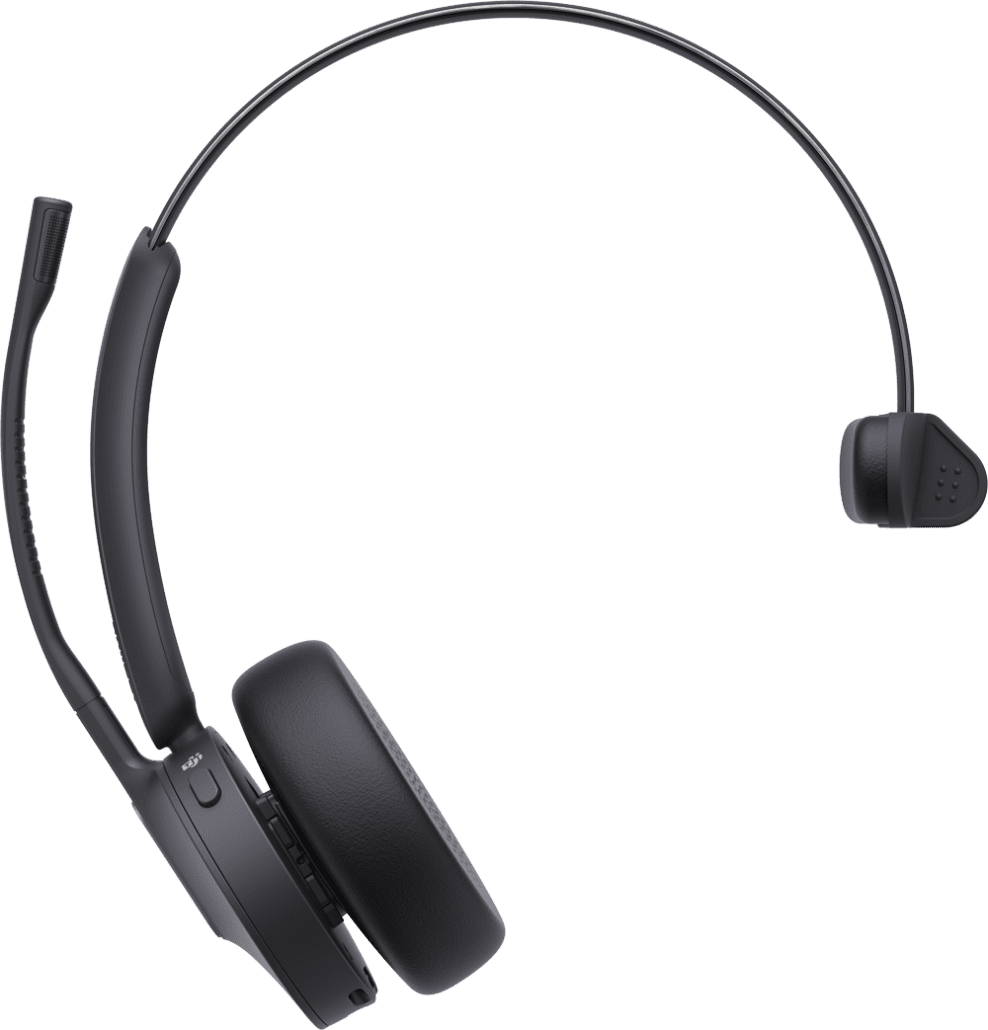

Logitech Zone Vibe Wireless – This headset weighs 185 g (6.52 oz), or as much as a standard-sized chocolate bar. While it’s the heaviest headset on my list, it’s still lighter than most over-the-ear headphones. This lightweight helps reduce strain during extended wear. The earcups usememory foam; you can find the perfect fit by expanding the headband. The headband and earcup covers use a soft knitted fabric for a comfortable feel against your skin. The headset is designed to distribute weight evenly, minimizing pressure points on your head.

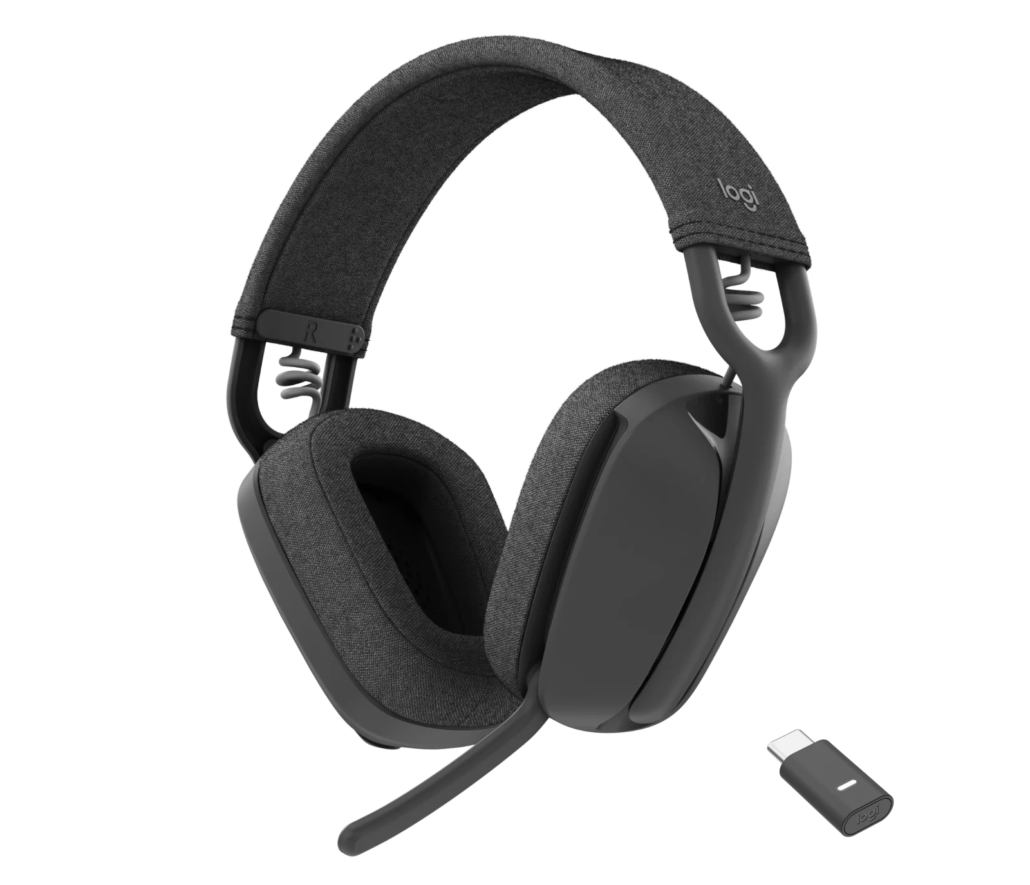
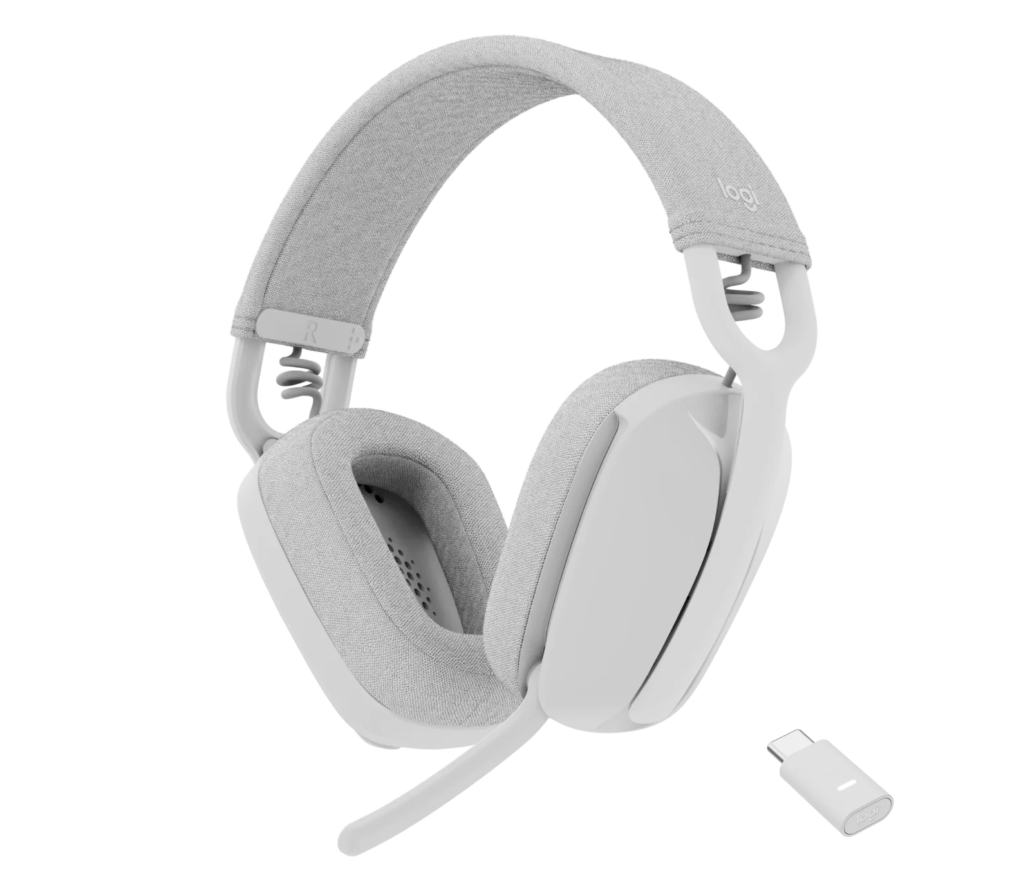
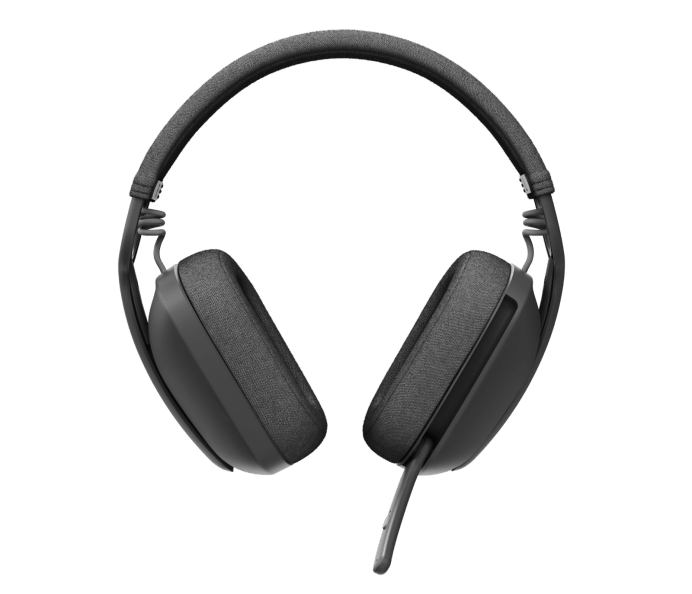
This top five list is based on headsets I’ve tested as of writing this blog post. Beyond comfort, other factors to consider when selecting a headset include compatibility, connectivity, corded vs. wireless, budget, and more! It’s best to contact a subject matter expert like Call One, Inc. to help you navigate the hundreds of headset models available.

Call One, Inc. is a nationally certified woman-owned business that provides professional-grade audio and video solutions for personal and team workspaces. We’ve been helping customers do their business better since 1987 and are authorized resellers of Jabra, HP Poly, Logitech, Yealink, JPL, Shokz, JLab, Neat, EPOS, DTEN, and more!
Why You Should Consider the Yealink BH70 for Your Next Headset Purchase
/0 Comments/in Enterprise Headsets, Featured Articles, Open Office Solutions, Recent Post, Work At Home/by Danny HayasakaI have the privilege and opportunity to test professional-grade headsets from all the leading brands. Want to see and hear how they perform in real-world environments? Check out the Call One, Inc. YouTube Channel. The Yealink BH70 Bluetooth Headset should be considered the next time your organization needs UC Bluetooth headsets. Why? Let’s get into it.

Yealink BH70 Models Overview
|
Yealink BH70 Model |
Wearing Style |
USB-A or USB-C |
UC or Teams Certified |
|
Mono Headband |
USB-C |
Microsoft Teams |
|
|
Mono Headband |
USB-C |
UC |
|
|
Mono Headband |
USB-A |
UC |
|
|
Mono Headband |
USB-A |
Microsoft Teams |
|
|
Dual Headband |
USB-C |
UC |
|
|
Dual Headband |
USB-C |
Microsoft Teams |
|
|
Dual Headband |
USB-A |
UC |
|
|
Dual Headband |
USB-A |
Microsoft Teams |
Ideal for Work From Anywhere
The Yealink BH70 Series is designed to connect to your laptop via the included BT51 dongle and Bluetooth 5.2 to your mobile device. This makes it an ideal headset for various work environments, including hybrid work, open offices, remote work, and contact centers.
Comfort and Durability
Based on my experience with the current Yealink headsets, the BH70 is one of the most comfortable I’ve used. Designed with user comfort in mind, the BH70 headsets feature an ergonomic design and leather ear cushions. They are lightweight, with the dual-ear models weighing 147g and the mono-ear models weighing 91g, making them comfortable for all-day use. The headsets are built to last with high-quality materials and have a 2-year warranty.
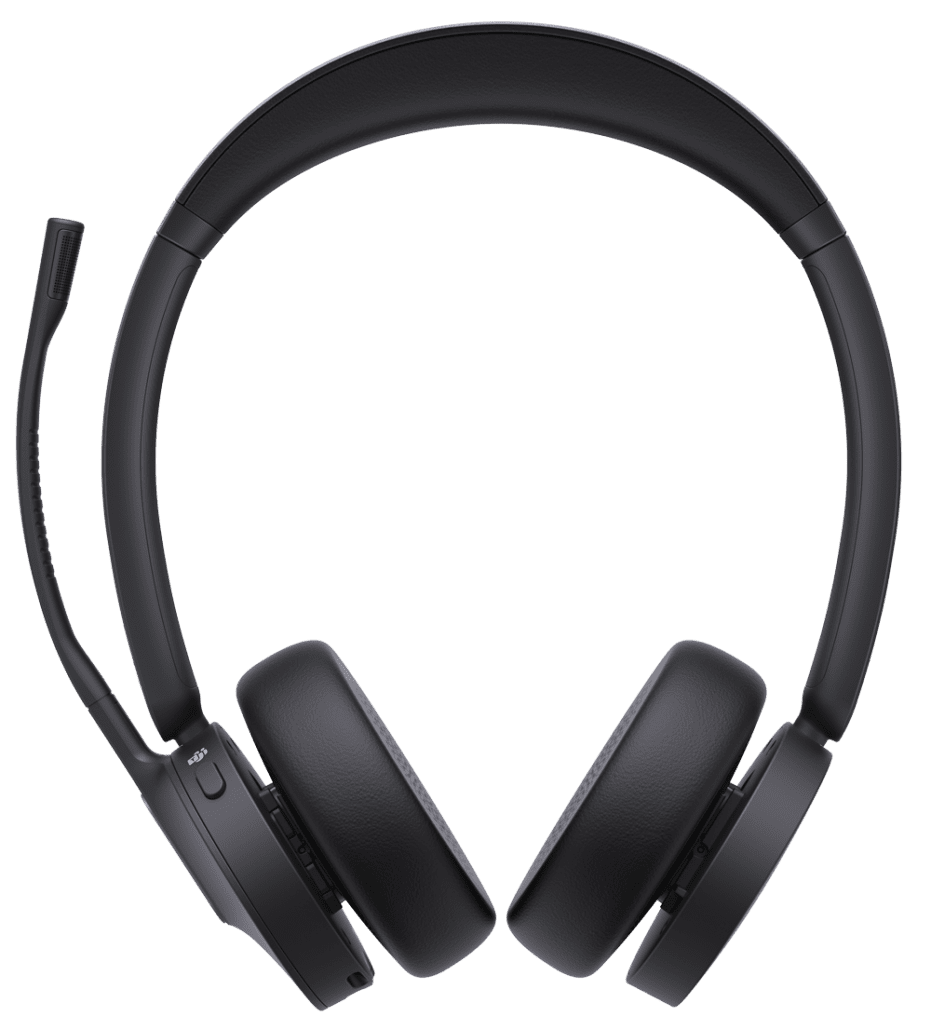
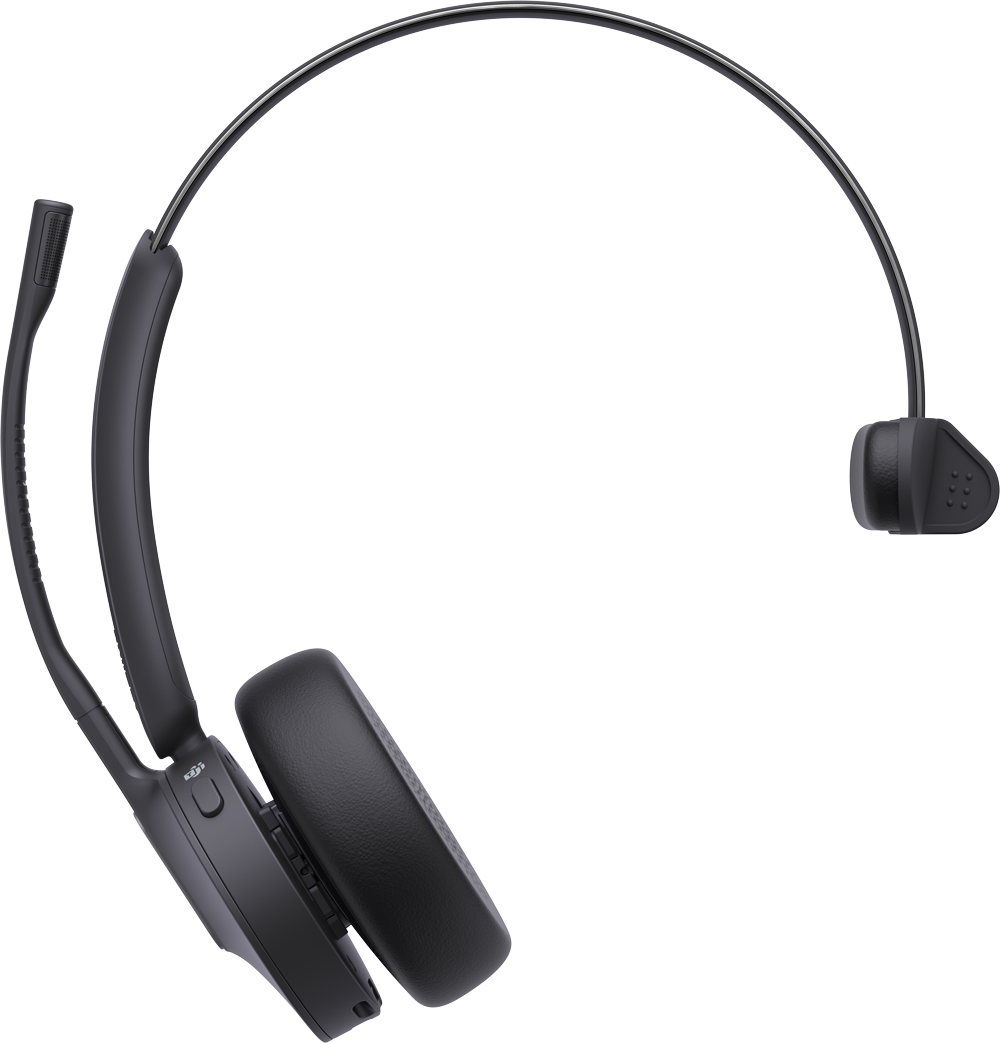
Long Battery Life
One of the standout features of the BH70 series is the impressive battery life. With up to 35 hours of talk time and a quick charging time of just 90 minutes, you can rely on these headsets for extended periods without frequent recharging. I have gone an entire work week without charging. Additionally, the headsets have a standby time of 22 days.
Use as Corded Device
If you run out of battery, are in a location that doesn’t allow Bluetooth, or are experiencing wireless density issues, you can use the Yealink BH70 as a corded/wired audio device by using the included USB-C to USB-A 2.0 cable.
Wearing Style Versatility
The Yealink BH70 series is available in mono and dual-ear headband-wearing styles. You can also rotate the mic boom to have the mic on your right or left side.
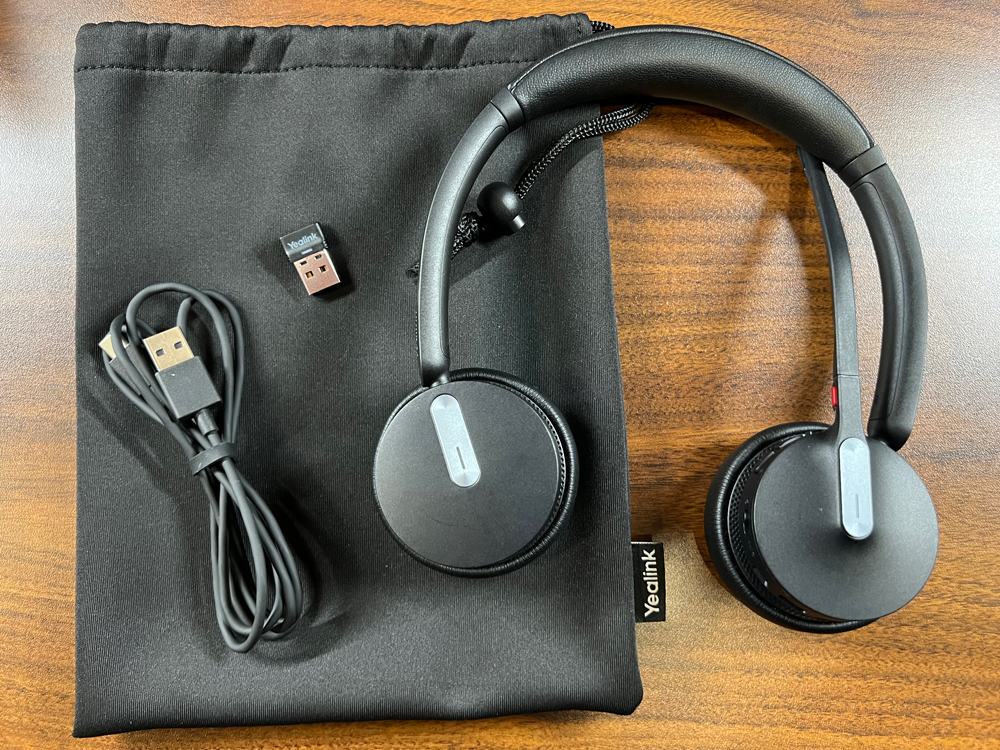



Certified for Microsoft Teams
The Yealink BH70 Bluetooth headsets are certified for Microsoft Teams and include a dedicated Teams button. This certification ensures compatibility and optimal performance with Microsoft’s communication platform.
Low Pricing
Compared to other brands that offer similar features, functionality, and audio performance, the Yealink BH70 Bluetooth Headsets are much lower priced.

Conclusion
In conclusion, the Yealink BH70 Bluetooth Headset is a standout choice for anyone needing a reliable, high-quality headset. Its versatile connectivity options make it suitable for various work environments, whether at home, in the office, or on the go. The exceptional comfort, ensured by its ergonomic design and lightweight build, allows for extended wear without discomfort. The impressive battery life and quick charging capabilities mean you won’t be left without a functioning headset during crucial times. Additionally, using the headset as a corded device adds a layer of reliability and flexibility. Certified for Microsoft Teams and available at a competitive price, the Yealink BH70 offers exceptional value. If you’re looking for a headset that combines comfort, durability, and advanced features without breaking the bank, the Yealink BH70 should be at the top of your list.
Check out this overview and Yealink BH70 mic performance demo video!

Try Yealink BH70 for FREE
Call One, Inc. offers an Enterprise and Contact Center Program (ECCP) that enables qualified customers to get a free sample of Yealink headsets to test in their environment. To learn more, visit our website or contact us for help selecting the right headset for your organization.
Call One, Inc. is a nationally certified woman-owned business that provides professional-grade audio and video solutions for personal and team workspaces.
Jabra Evolve2 55 vs Poly Voyager Focus 2: A Comprehensive Comparison
/0 Comments/in Enterprise Headsets, Featured Articles, Open Office Solutions, Recent Post, Work At Home/by Danny HayasakaWhen it comes to high-quality, professional-grade headsets, the Jabra Evolve2 55 Series and the Poly Voyager Focus 2 Series are top contenders. Both series offer a range of features tailored for business use, but choosing between them can be challenging. This blog aims to provide a detailed comparison, helping you make an informed decision based on your specific needs.
Overview
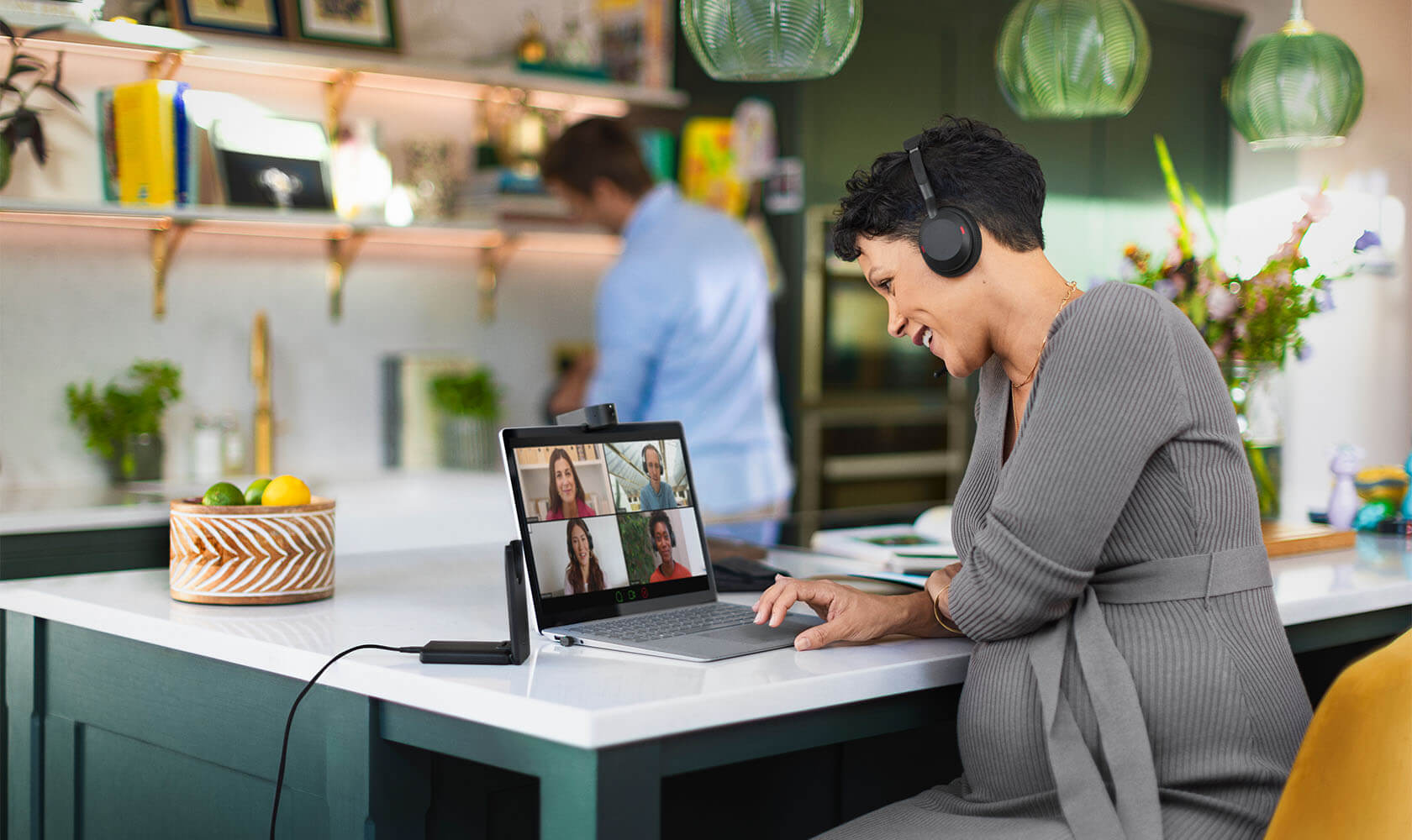
- Jabra Evolve2 55 Series: The Jabra Evolve2 55 offers 14 different variants, catering to a wide range of user preferences. The series features mono and stereo variants priced between $259 and $319. It comes with a 2-year warranty and supports both UC and Teams variants.
- Poly Voyager Focus 2 Series: This series includes eight variants, all stereo. The pricing ranges from $329.95 to $349.95, with a 2-year warranty. Like Jabra, it supports UC and Teams variants.
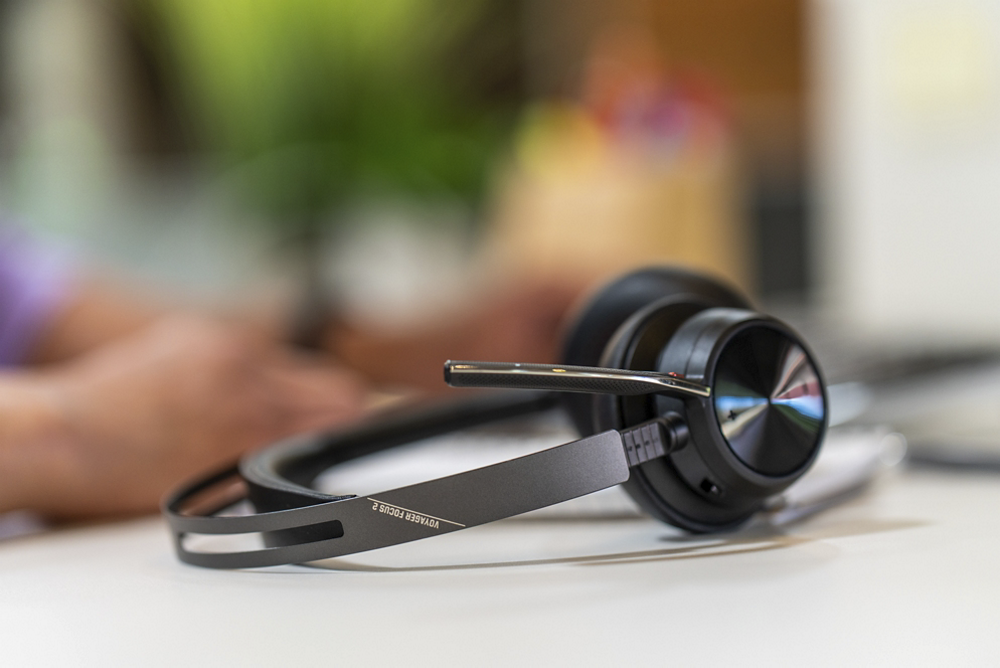
Feature Comparison
1. Active Noise Cancellation (ANC):
Both series boast Active Noise Cancellation technology, providing an immersive and distraction-free listening experience.
2. Charging Stand:
Both offer charging stands with select variants or can be purchased separately.
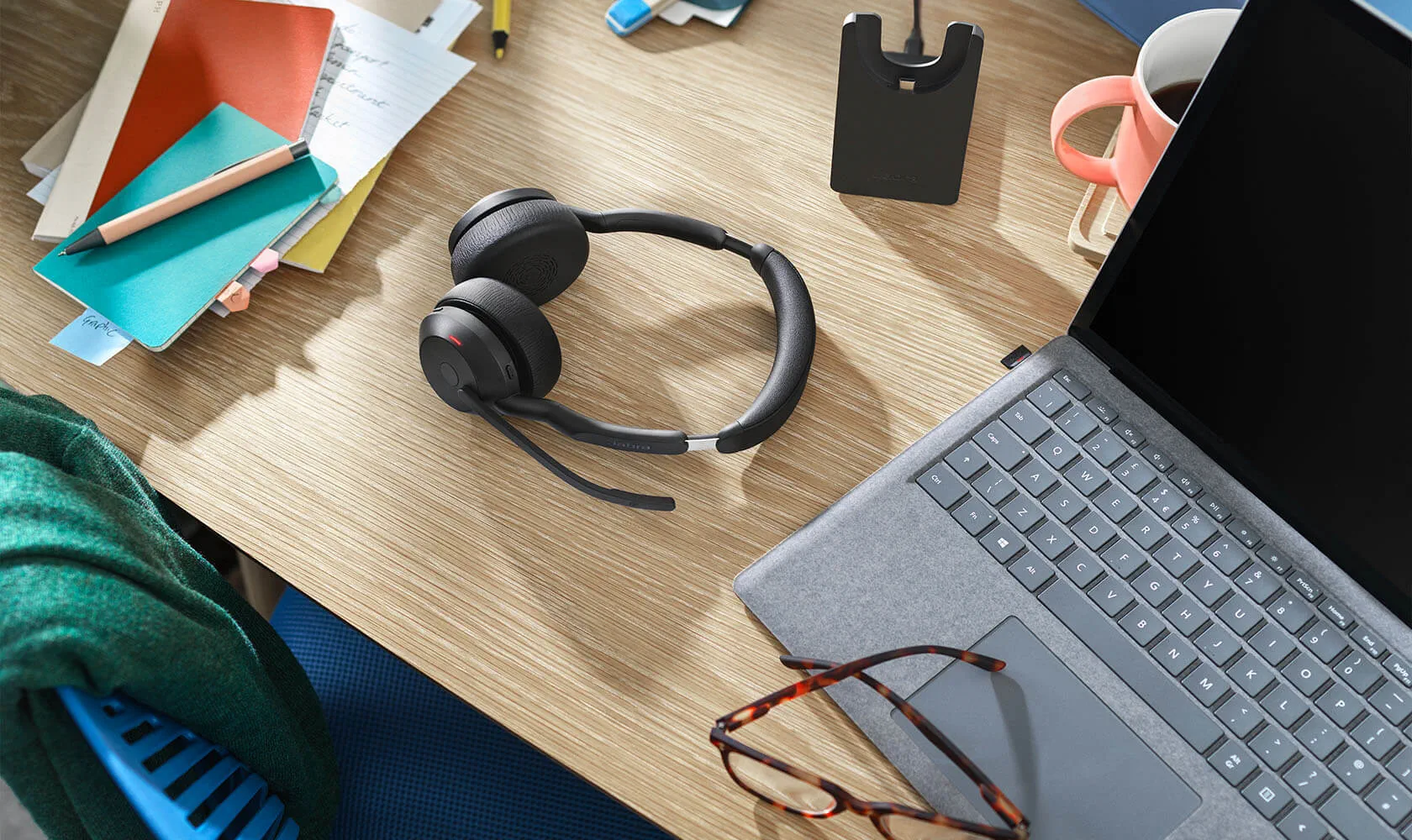
3. Talk Time:
Jabra Evolve2 55: Up to 16 hours (with ANC/busylight off)/Up to 10 hours (with ANC on/busylight on)
Poly Voyager Focus 2: – Up to 25 hours (ANC and online indicator off)/Up to 20 hours (ANC on and online indicator off)/Up to 18 hours (ANC off and online indicator on, default setting)/Up to 16 hours (ANC on and online indicator on, default setting)
4. Headset Weight:
- Jabra Evolve2 55: Stereo 130g (4.59 oz), Mono 79g (2.79 oz)
- Poly Voyager Focus 2: Stereo 175 g (6.08 oz)
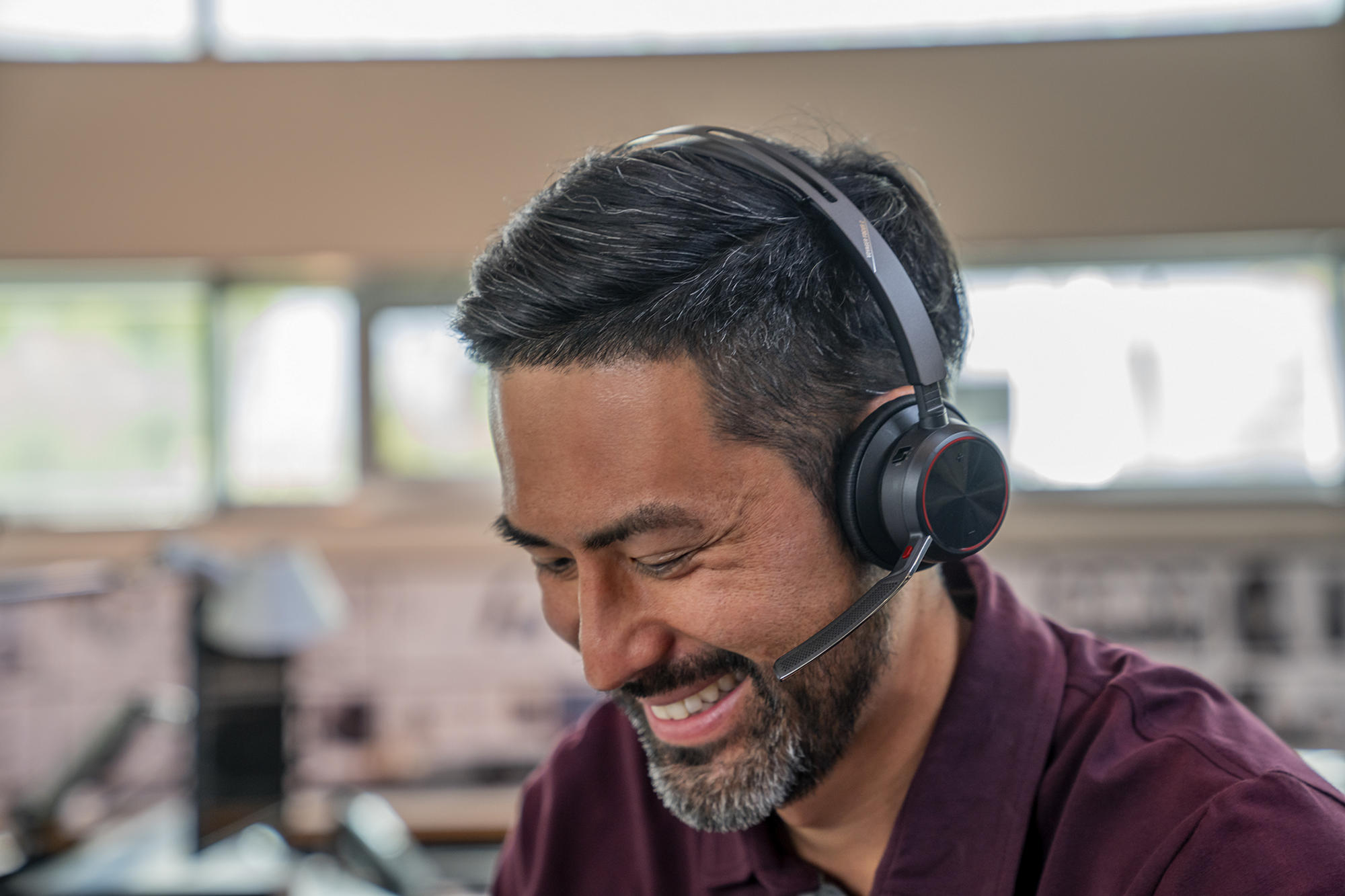
5. Comfort
Comfort is very subjective. Based on my preferences, both series are comfortable enough to be worn for an 8-hour workday. I wore them for four hours, took them off for an hour lunch break, and then another four hours. Due to the weight and Jabra Air Comfort Technology, I’ll give the Jabra Evolve2 55 Stereo models a slight edge over the Voyager Focus 2. The key aspects of the Jabra Air Comfort Technology include:
Redesigned Earcup Cushions: The earcup cushions are redesigned with a new pattern and material that evenly distributes pressure on the ears. This design helps reduce discomfort and fatigue during long periods of headset use.
Softer, More Responsive Material Inside Ear Cups: The interior of the ear cups is lined with a softer and more responsive material. This change further contributes to relieving pressure on the ears, enhancing the overall comfort of the headset.
Perforated Headband Design: The headset headband features a new perforated design. This design distributes pressure more evenly on the top of the head and improves air circulation, adding to the comfort during prolonged use.
Rotating Flexible Ear Cups: The ear cups of the headset are designed to be flexible and rotate, moving with the user. This adaptability allows for a more personalized fit and prevents the headset from becoming a hindrance during various activities.
Overall Fit and Comfort: With the combination of these features, Jabra Air Comfort Technology aims to provide a “light-as-air” fit. Users should feel minimal discomfort or pressure, even when wearing the headset for extended periods.
Target Audience: This technology is particularly beneficial for professionals who frequently participate in long meetings or need to wear headsets for extended duration in the office and remote working setups.
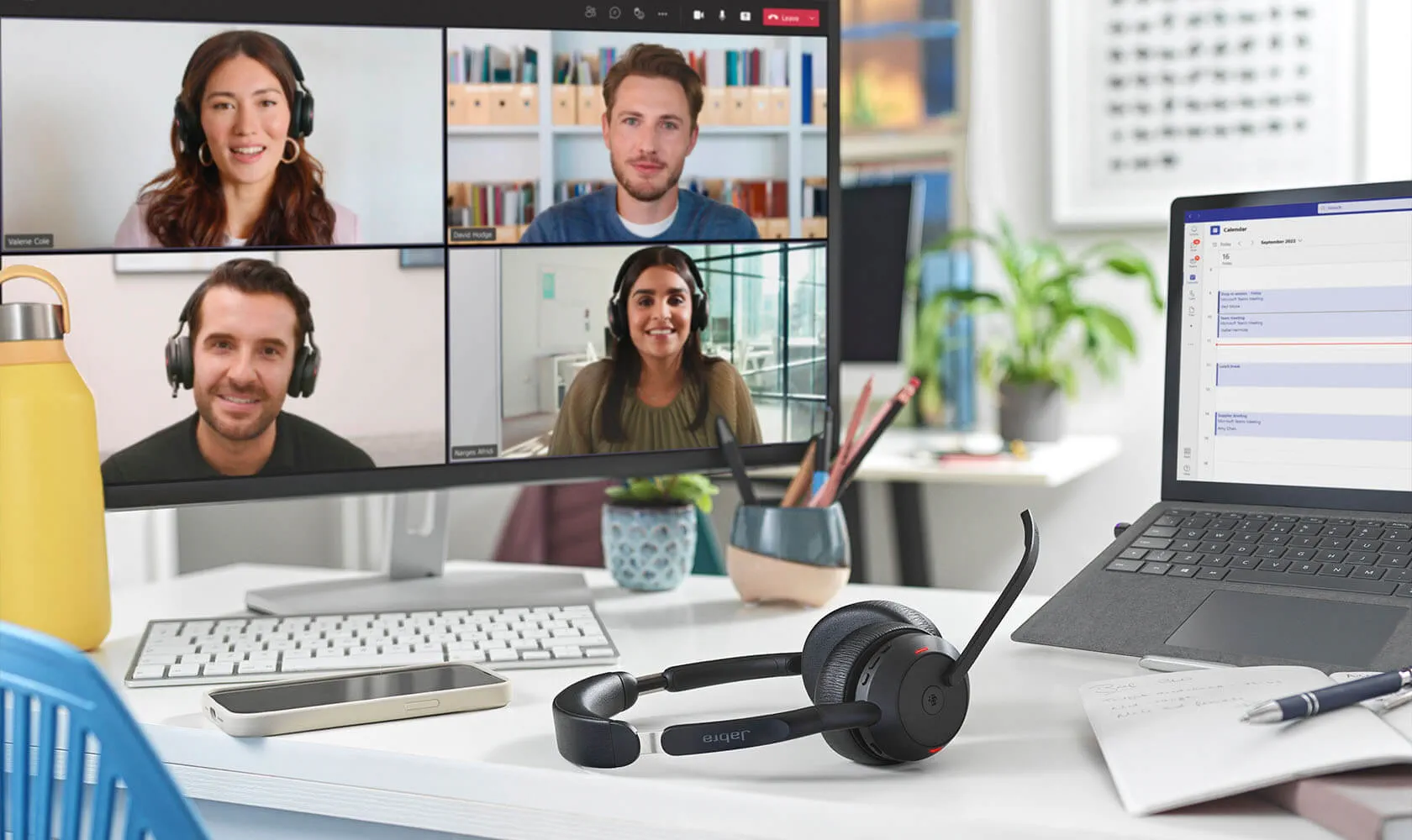
6. Charging Type:
- Jabra Evolve2 55: USB-C or Charging Stand
- Poly Voyager Focus 2: Micro-USB or Charging Stand
I think HP | Poly should standardize on USB-C charging type. Heck, even Apple has done so.
7. USB Connectivity:
Both series offer USB-A or USB-C variants. I’m hoping USB headset manufacturers will one day include USB-A and USB-C options in the box. While we’re seeing an increase in USB-C connectivity, many customers still have USB-A, and it’s sometimes a challenge for enterprise purchasing teams to know which USB type the end user has.
8. Manageability:
- Jabra Evolve2 55: Jabra Direct, Jabra Sound+, Jabra Xpress
- Poly Voyager Focus 2: Poly Lens, Poly Lens Desktop App
9. Noise Canceling Mic Performance
Both have strong noise-canceling mic performance when paired with a computer or mobile phone. It’s powerful when used with noise suppression AI technology in UC platforms like Microsoft Teams, Zoom, Google Meet, and Webex. We have over a hundred videos in this Headset Mic Tests YouTube Video Playlist if you want to hear how well these microphones perform. Here are some resources that share how to adjust Noise Suppression in Teams, Zoom, Google Meet, and Webex.
- Reduce background noise in Microsoft Teams meetings.
- How to adjust background noise suppression for Zoom meetings can be located here: Configuring professional audio settings for Zoom Meetings
- Filter out noise from your meeting on Google Meet
- Webex App | Remove background noise and speech in calls and meetings
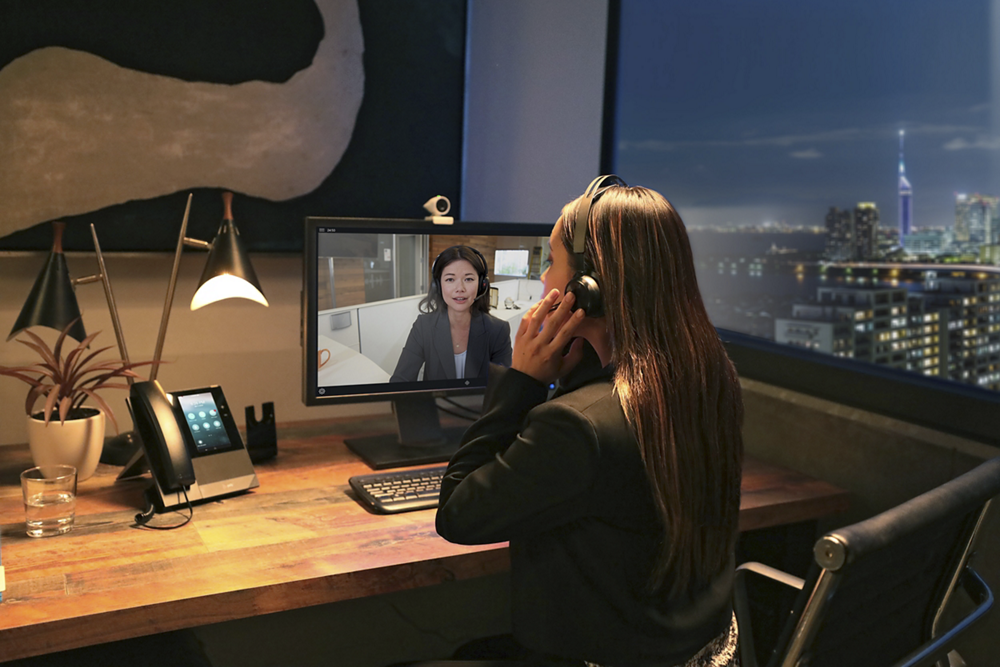
Comparative Matrix
|
Feature |
Jabra Evolve2 55 |
Poly Voyager Focus 2 |
|
Variants |
14 |
8 |
|
Price Range |
$259-$319 |
$329.95 -$349.95 |
|
UC and Microsoft Teams Variants |
Yes |
Yes |
|
ANC |
Yes |
Yes |
|
Charging Stand |
Yes (select variants) or sold separately |
Yes (select variants) or sold separately |
|
Talk Time |
Up to 16h (ANC/busylight off), 10h (ANC on/busylight on) |
Up to 25 hours (ANC and online indicator off)/ Up to 20 hours (ANC on and online indicator off); Up to 18 hours (ANC off and online indicator on, default setting)/ Up to 16 hours (ANC on and online indicator on, default setting) |
|
Weight |
Stereo 130g, Mono 79g |
Stereo 175 g |
|
Charging Type |
USB-C or Charging Stand |
Micro-USB or Charging Stand |
|
USB Connectivity |
USB-A or USB-C depending on variant |
USB-A or USB-C depending on variant |
|
Manageability Software |
Jabra Direct, Sound+, Xpress |
Poly Lens, Poly Lens Desktop App |
Conclusion
The Jabra Evolve2 55 and the Poly Voyager Focus 2 series offer robust features for professional use. Your choice may depend on specific needs like budget, preference for mono or stereo, with or without a charging stand, battery life/talk time, or even the charging type you prefer.
Contact an Authorized Jabra or HP | Poly Reseller like Call One, Inc. to learn more about professional audio and video solutions for your organization.
Call One, Inc. is a nationally certified women’s business enterprise and woman-owned small business headquartered in Cape Canaveral, FL. We are B2B and provide professional-grade audio and video solutions for personal and team workspaces. We believe in the fundamental principle that people do business with people. Our passion is to help people do their business better by simplifying access to business communications and collaboration technology.

Model Listing and MSRP
- 25599-889-999-01 Evolve2 55 Link380a UC Mono $259.00
- 25599-899-999-01 Evolve2 55 Link380a MS Mono $259.00
- 25599-889-899-01 Evolve2 55 Link380c UC Mono $259.00
- 25599-899-899-01 Evolve2 55 Link380c MS Mono $259.00
- 25599-989-999-01 Evolve2 55 Link380a UC Stereo $269.00
- 25599-999-999-01 Evolve2 55 Link380a MS Stereo $269.00
- 25599-989-899-01 Evolve2 55 Link380c UC Stereo $269.00
- 25599-999-899-01 Evolve2 55 Link380c MS Stereo $269.00
- 25599-889-989-01 Evolve2 55 Link380a UC Mono Stand $309.00
- 25599-899-989-01 Evolve2 55 Link380a MS Mono Stand $309.00
- 25599-989-989-01 Evolve2 55 Link380a UC Stereo Stand $319.00
- 25599-999-989-01 Evolve2 55 Link380a MS Stereo Stand $319.00
- 25599-989-889-01 Evolve2 55 Link380c UC Stereo Stand $319.00
- 25599-999-889-01 Evolve2 55 Link380c MS Stereo Stand $319.00
- 213727-01 VOYAGER FOCUS 2 UC, USB-A, CHARGE STAND $349.95
- 213726-01 VOYAGER FOCUS 2 UC, USB-A $329.95
- 214433-01 VOYAGER FOCUS 2 UC, USB-C, CHARGE STAND $349.95
- 214432-01 VOYAGER FOCUS 2 UC, USB-C $329.95
- 213727-02 VOYAGER FOCUS 2 UC-M, USB-A, CHARGE STAND $349.95
- 213726-02 VOYAGER FOCUS 2 UC-M, USB-A $329.95
- 214433-02 VOYAGER FOCUS 2 UC-M, USB-C, CHARGE STAND $349.95
- 214432-02 VOYAGER FOCUS 2 UC-M, USB-C $329.95

Discovering the EPOS Impact 1000 Series: The Best Noise-Canceling Mic in Business Headsets
/0 Comments/in Enterprise Headsets, Featured Articles, Open Office Solutions, Recent Post, Work At Home/by Danny HayasakaIntroduction
I’ve had the opportunity to test various business-grade headsets across multiple brands. Based on my tests, the EPOS Impact 1000 Series features the best noise-canceling microphone I’ve experienced to date. The EPOS Impact 1000 Series consists of several different models. In this blog, I share a comparative matrix to help guide your selection of the suitable model.
Overview of the EPOS Impact 1000 Series
The EPOS Impact 1000 Series is not just about delivering crystal-clear audio; it’s about creating an environment where communication thrives, regardless of external noise. With my extensive experience in testing various headsets (as showcased in my Headset Mic Tests Video Playlist), I can confidently say that the EPOS Impact 1000 Series sets a new standard for noise cancellation in microphones.
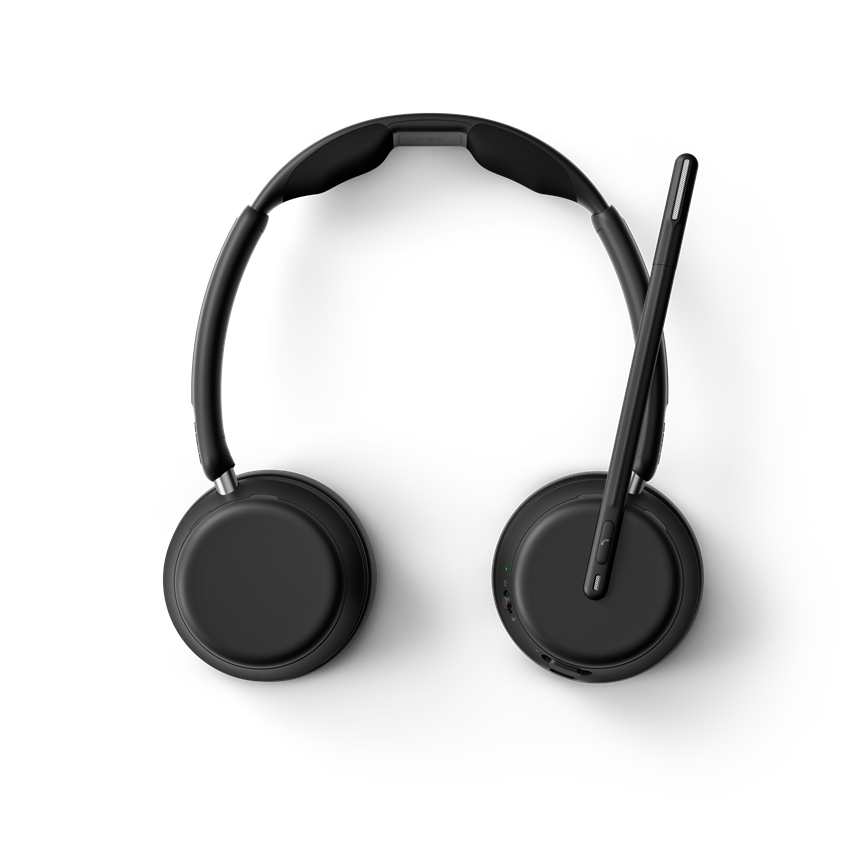
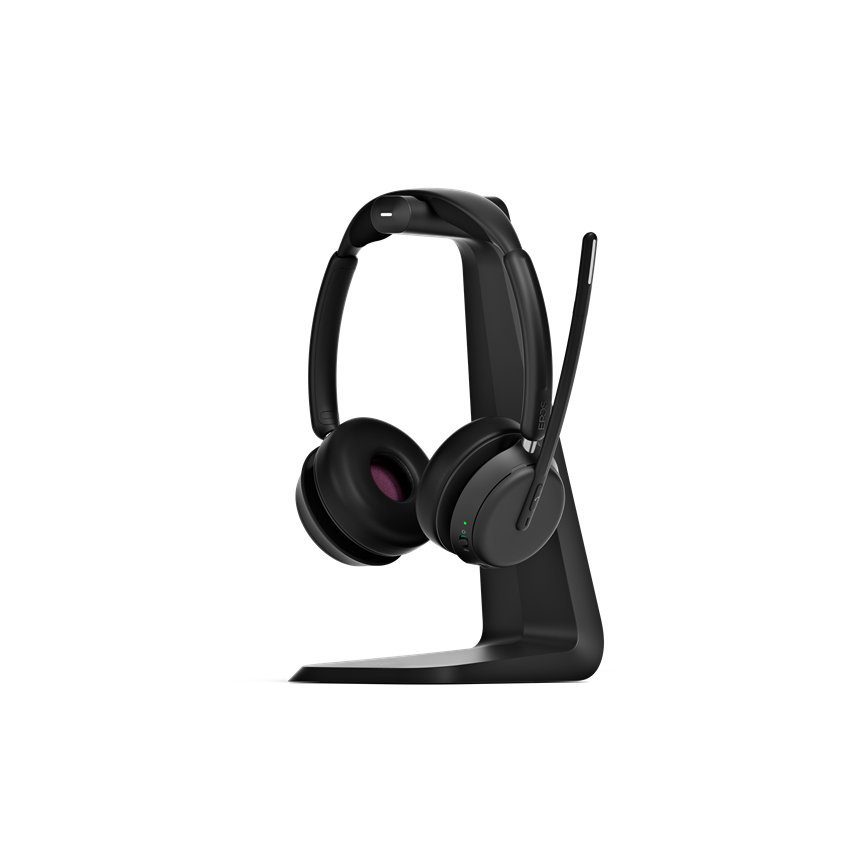
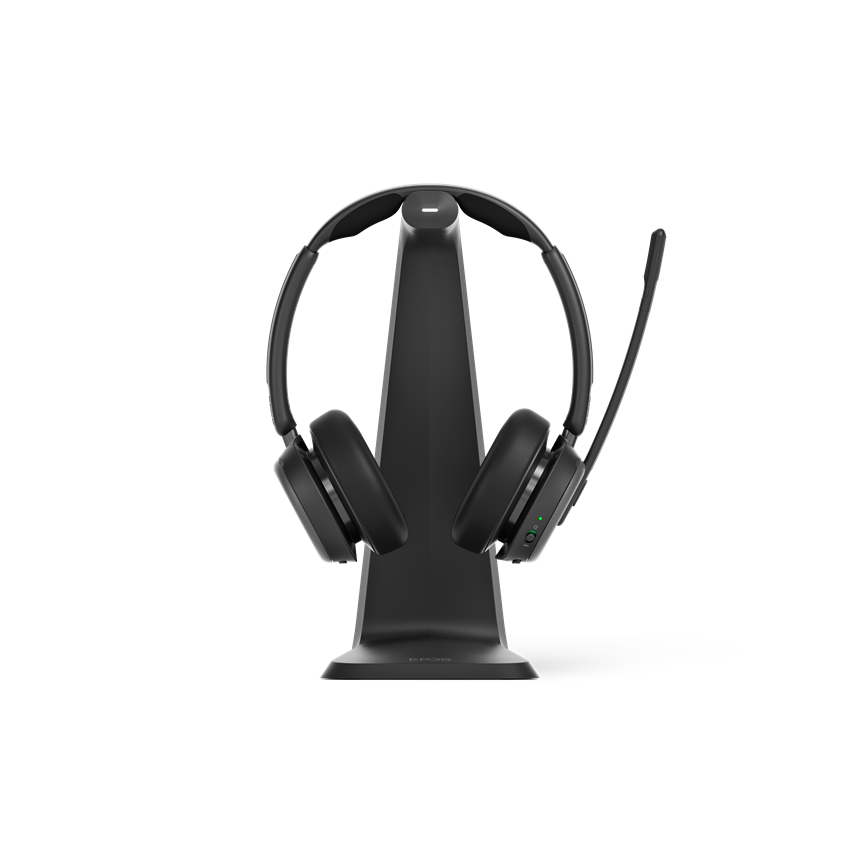
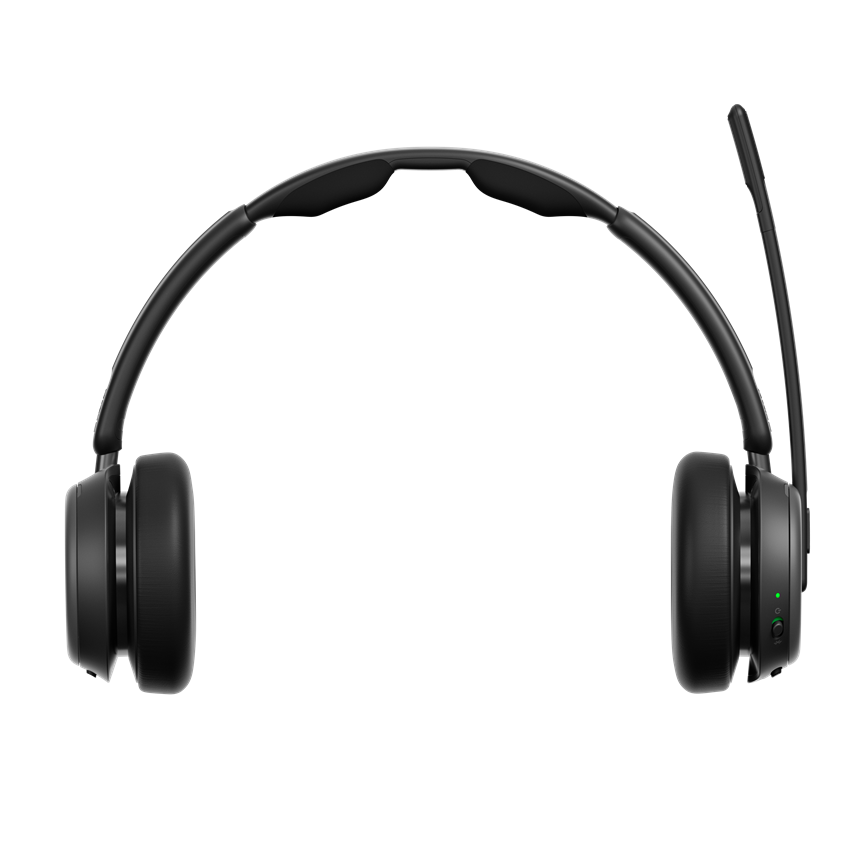
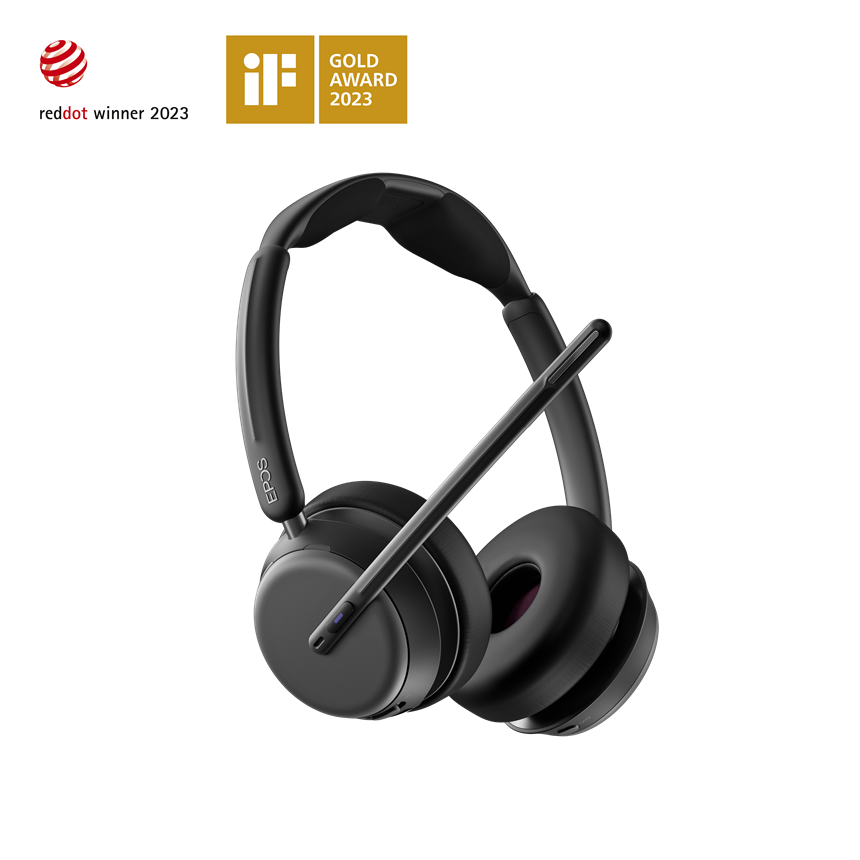
Closer Look at the Series
The EPOS Impact 1000 Series are available in single and dual ear, with and without ANC (Active Noise Canceling Speakers), with and without a Charging Stand, and UC and Microsoft Teams certified options. All models connect to a softphone/PC (via BTD 800a Bluetooth USB Dongle) and mobile devices (via Bluetooth). MSRP* Ranges from $289 to $429 USD, depending on the model. (*MSRP as of writing this blog. Pricing is subject to change)
- The EPOS Impact 103X Series are single ear headband wearing styles
- The EPOS Impact 106X Series are dual ear headband wearing styles.
- A charging stand is included in variants: 1061, 1061T, 1061T ANC
- Models ending in “ANC” include Active Noise Canceling Speakers
- Models including “T” in the model are certified for Microsoft Teams and include a dedicated Teams button.
What’s in the box:
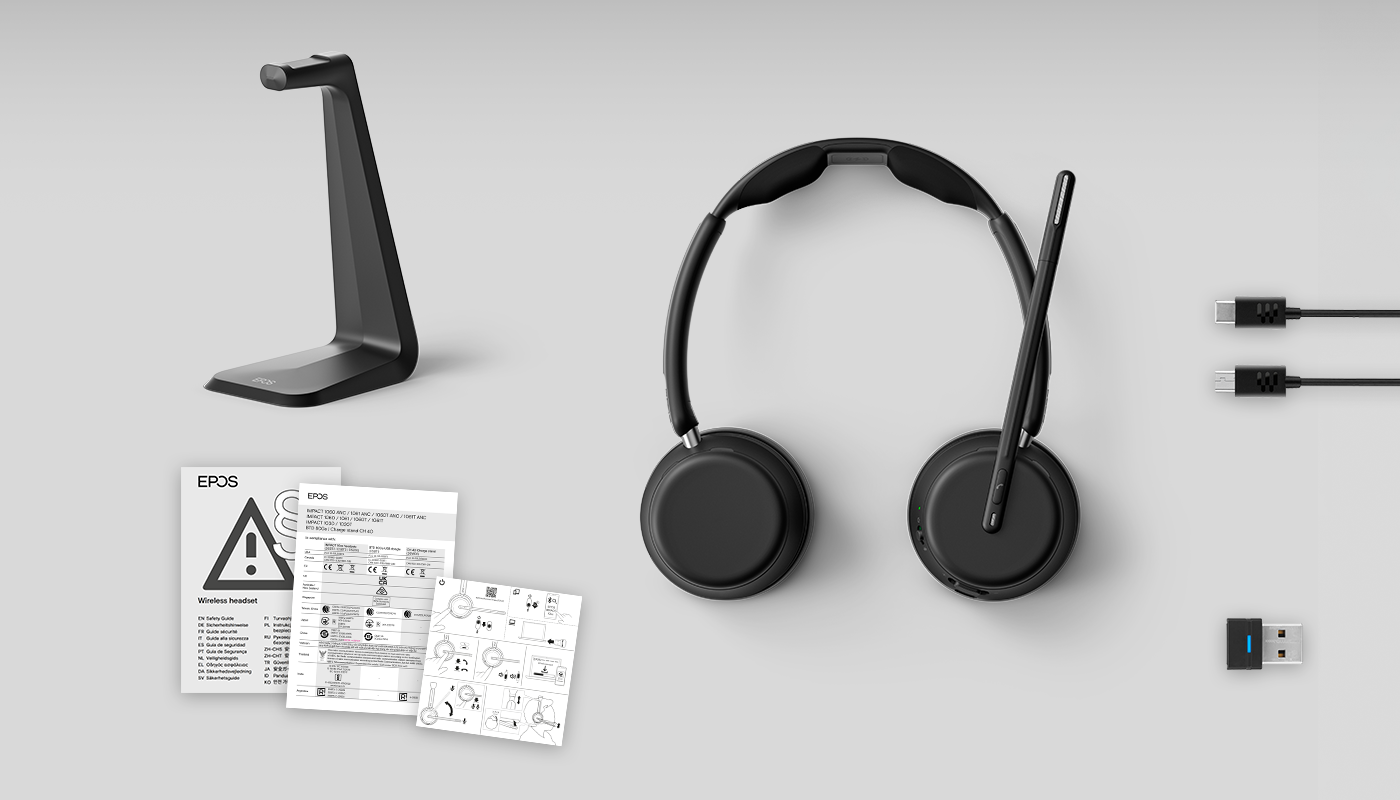
- Headset
- Soft carrying pouch
- Bluetooth USB dongle (BTD 800a)
- USB-C cable (1.2m)
- Safety & compliance sheet
- Wireless charging stand (included in variants: 1061, 1061T, 1061T ANC)
Comparative Matrix
Here is a comparative matrix that includes the EPOS Impact 1000 Series Model, Article Number (Manufacturer Part Number), MSRP, whether a model is a Single or Dual Ear, whether a model includes a Wireless Charging Stand, Connectivity, and Certifications.
|
Model |
Article Number |
MSRP |
Single or Dual Ear |
ANC |
Wireless Charging Stand |
Connects To |
Certifications |
|
1001130 |
$389.00 |
Dual Ear |
Yes |
No |
Softphone/PC and mobile devices |
Optimized for UC. Certified for Google Meet |
|
|
1001131 |
$429.00 |
Dual Ear |
Yes |
Yes |
Softphone/PC and mobile devices |
Optimized for UC. Certified for Google Meet |
|
|
1001132 |
$289.00 |
Single Ear |
No |
No |
Softphone/PC and mobile devices |
Optimized for UC. Certified for Google Meet |
|
|
1001134 |
$299.00 |
Dual Ear |
No |
No |
Softphone/PC and mobile devices |
Optimized for UC. Certified for Google Meet |
|
|
1001135 |
$349.00 |
Dual Ear |
No |
Yes |
Softphone/PC and mobile devices |
Optimized for UC. Certified for Google Meet |
|
|
1001136 |
$389.00 |
Dual Ear |
Yes |
No |
Softphone/PC and mobile devices |
Optimized for UC. Certified for Microsoft Teams |
|
|
1001137 |
$289.00 |
Single Ear |
No |
No |
Softphone/PC and mobile devices |
Optimized for UC. Certified for Microsoft Teams |
|
|
1001138 |
$299.00 |
Dual Ear |
No |
No |
Softphone/PC and mobile devices |
Optimized for UC. Certified for Microsoft Teams |
|
|
1001171 |
$429.00 |
Dual Ear |
Yes |
Yes |
Softphone/PC and mobile devices |
Optimized for UC. Certified for Microsoft Teams |
|
|
1001173 |
$349.00 |
Dual Ear |
No |
Yes |
Softphone/PC and mobile devices |
Optimized for UC. Certified for Microsoft Teams |
User Experience and Practical Applications

In my testing, the EPOS Impact 1000 consistently delivered unparalleled noise cancellation in its microphone. This makes these headsets a top choice for professionals in noisy environments or those who demand the highest quality of voice transmission. In this video, “Is This the Best Headset Mic I’ve Ever Tested? EPOS Impact 1000 Mic Test!”, I include product information and several demonstrations, including a wireless range test and mic tests in multiple environments, including a coffee shop, at a rest area, with a riding lawn mower running in the background and more! Check it out!

Conclusion
The EPOS Impact 1000 Series is not just another set of professional headsets; it’s a game-changer in business communication. With the best noise-canceling mic I’ve tested so far, these headsets are a must-have for any professional prioritizing clear, uninterrupted communication in any work environment.
Contact an Authorized EPOS Reseller like Call One, Inc. to learn more about EPOS audio and video solutions for your organization.
Call One, Inc. is a nationally certified women’s business enterprise and woman-owned small business headquartered in Cape Canaveral, FL. We are B2B and provide professional-grade audio and video solutions for personal and team workspaces. We believe in the fundamental principle that people do business with people. Our passion is to help people do their business better by simplifying access to business communications and collaboration technology.

Additional Resources:
– Dive deeper into my headset tests and comparisons:
– For more details or to purchase, visit the EPOS website: https://www.eposaudio.com/en/us/enterprise/products/impact-1000
Jabra Evolve2 65 vs. Evolve2 65 Flex: Which is Right for You?
/0 Comments/in Enterprise Headsets, Featured Articles, Open Office Solutions, Recent Post, Work At Home/by Danny HayasakaThe Jabra Evolve2 65 and Evolve2 65 Flex are excellent UC Bluetooth wireless headsets designed for hybrid workers, with several key differences. Here’s a comparison to help you decide which one is right for you:

Price:
- Jabra Evolve2 65: The price range varies from $289 to $362
- Jabra Evolve2 65 Flex: The price range varies from $329 to $389
Color:
- Jabra Evolve2 65: Available in both black and beige options.
- Jabra Evolve2 65 Flex: Only available in black.
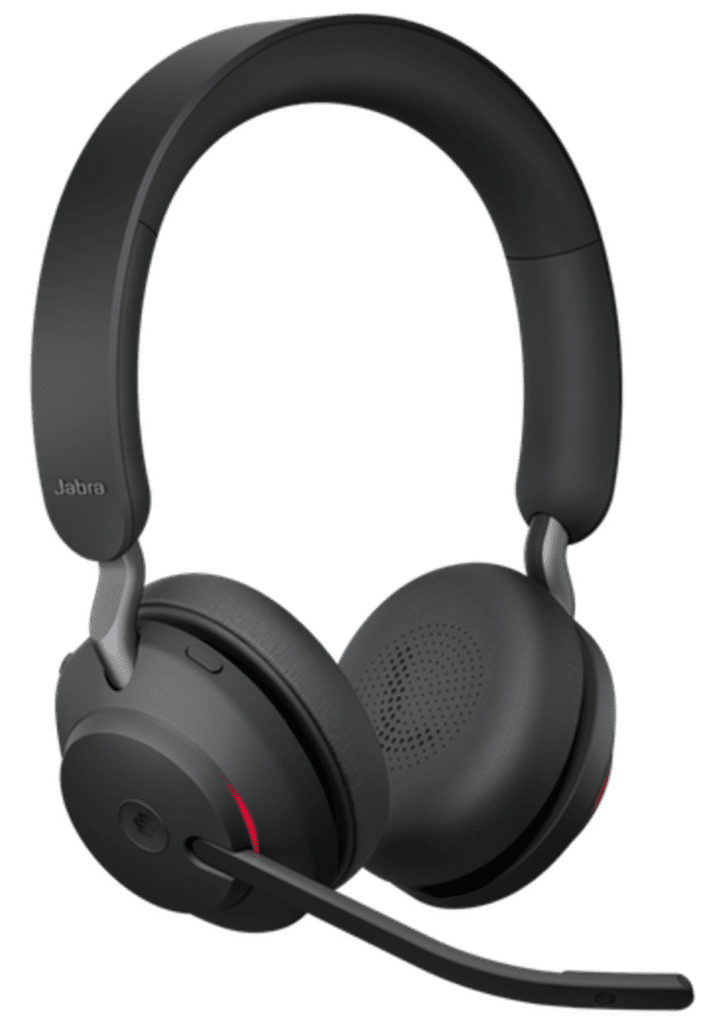
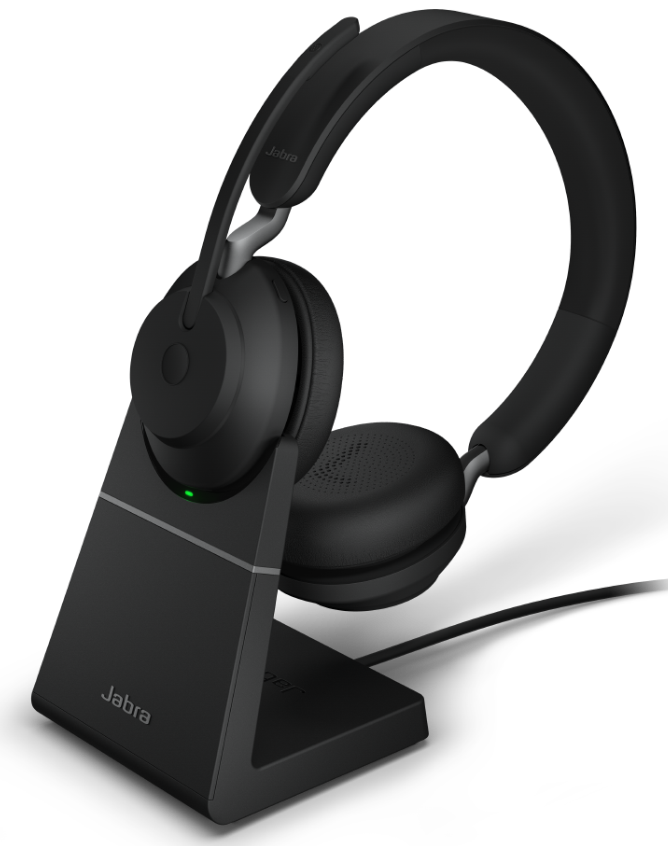
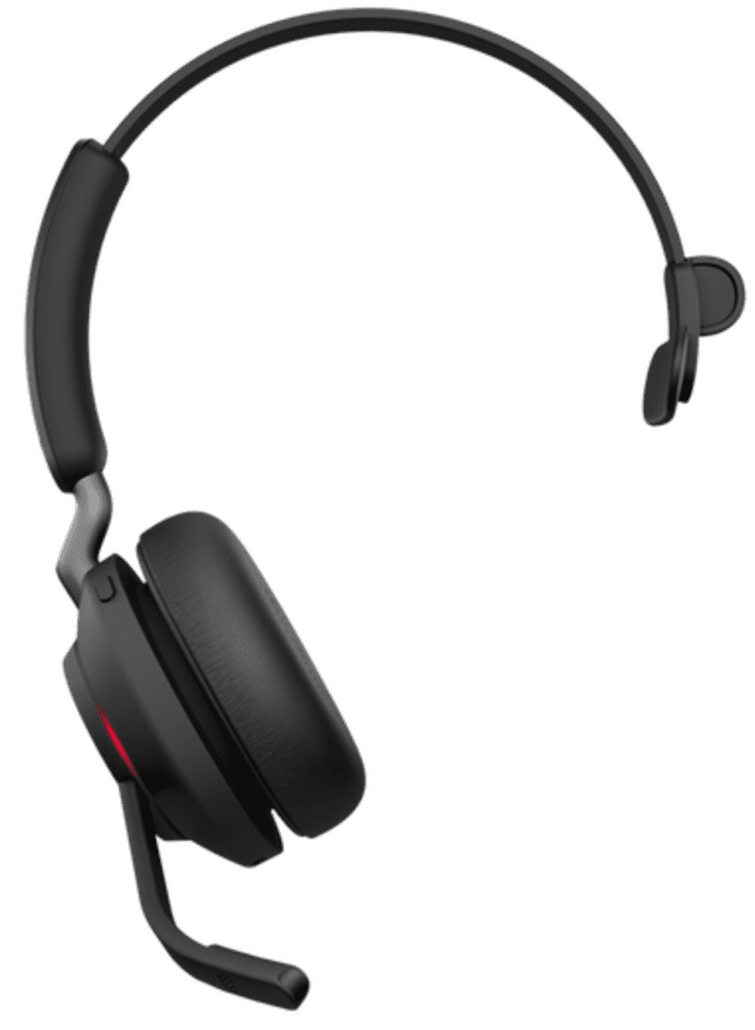
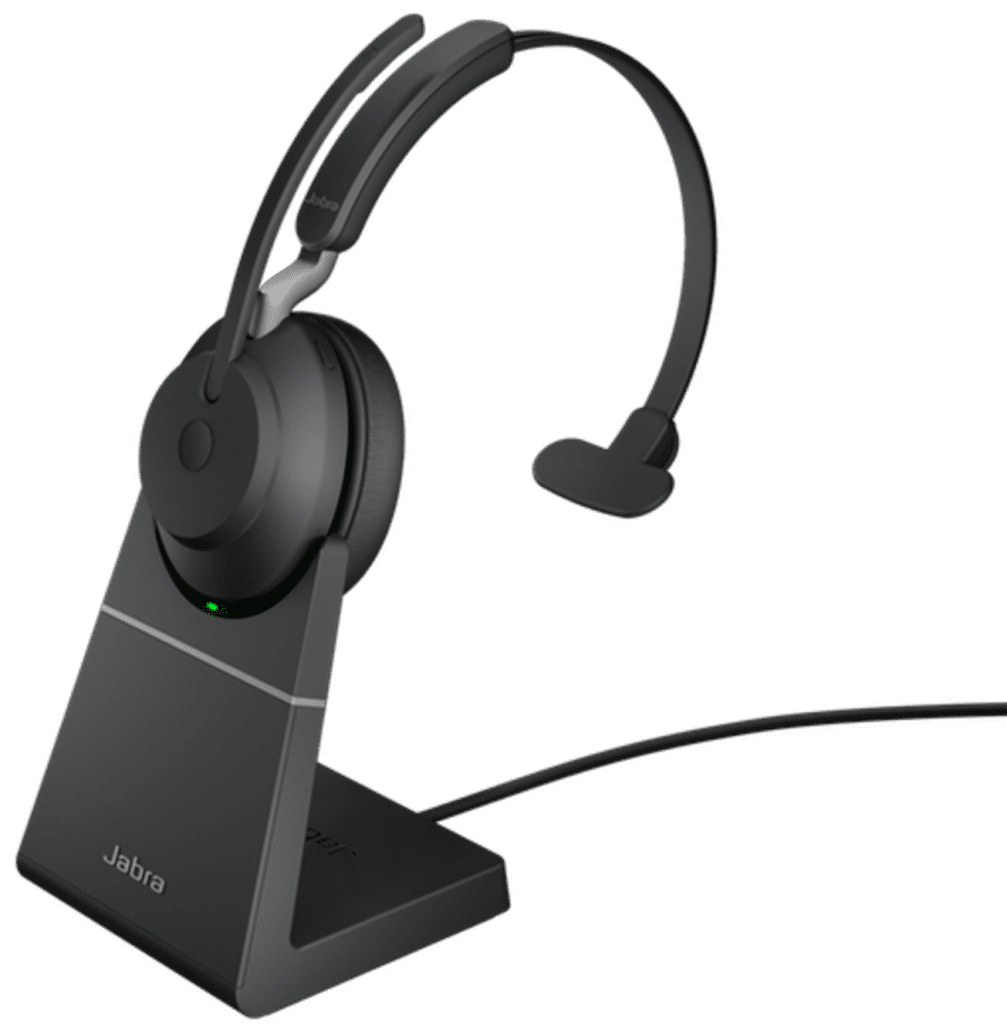
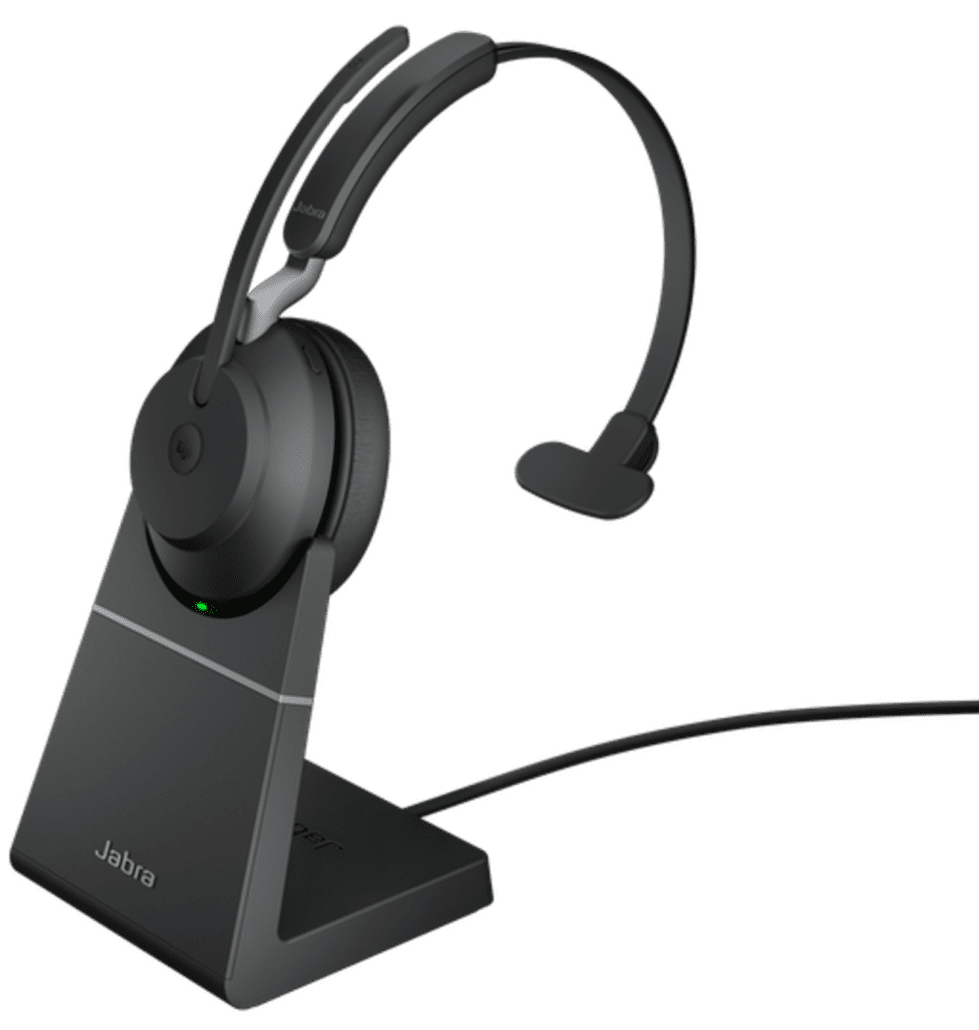
Mono and Stereo:
- Jabra Evolve2 65: Mono (single ear) and Stereo
(dual ear) models are available. Jabra Evolve2 65 Flex: Only available in black. - Jabra Evolve2 65 Flex: Only available in Stereo (dual ear).
Flexible Design:




- Jabra Evolve2 65 Flex: Can be folded into a compact form for easier storage and transport. Jabra Evolve2 65 Flex: Only available in Stereo (dual ear).
- Jabra Evolve2 65: Ear Cushions fold flat for easy storage and transport.
Jabra Air Comfort Technology:
- Jabra Evolve2 65 Flex: Includes Jabra Air Comfort technology, featuring redesigned earcup cushions, softer earcup material, and a perforated headband for improved comfort during long meetings and calls.
- Jabra Evolve2 65: Does not include Jabra Air Comfort Technology.
What is Jabra Air Comfort Technology?
Back-to-back meetings can mean being in a headset all day. To take the pressure off, Jabra has created a new comfort technology called Air Comfort. It features redesigned earcup cushions with a new pattern and material that distributes pressure on the ear more evenly. The inside of the ear cups have also been changed to a softer, more responsive material that helps to relieve pressure on the ears. The headband has a new perforated design that distributes pressure more evenly on the top of the head. This makes it feel like you’re not even wearing a headset during long meetings. Jabra Air Comfort technology was perfected by engineers over many years, so you can look forward to a new level of comfort during meetings and calls. Jabra Air Comfort comes with the Evolve2 65 Flex, Evolve2 55, and Evolve2 50.

Active Noise Cancellation (ANC):
- Jabra Evolve2 65: Provides Passive Noise Cancellation (PNC) using memory foam ear cushions and a new angled design.
- Jabra Evolve2 65 Flex: Includes Hybrid ANC and HearThrough features for noise cancellation and environmental awareness.
Want to learn more about PNC vs. ANC? Check out this blog: Exploring the Difference Between Active and Passive Noise Cancellation in Headset Speakers
Charging Options:
- Jabra Evolve2 65: Offers models with a charging stand, which can also be purchased separately.
- Jabra Evolve2 65 Flex: Offers models with a wireless charging pad with a lower profile, making it more portable.
Summary:
- Both headsets are suitable for hybrid work and work-from-anywhere setups.
- The Jabra Evolve2 65 Flex is preferred for its foldable design, sleek profile, thin earcups, hidden boom arm, wireless charging, long battery life, ANC speakers, and extreme comfort.

Why Buy from Authorized Jabra Reseller:
Authorized Jabra Resellers like Call One, Inc. provide subject matter expertise, pre-and post-sale support, genuine Jabra products, full warranties, and access to special incentives and programs.
Here’s a comparison matrix for a more detailed overview:
|
Model |
Jabra Evolve2 65 |
Jabra Evolve2 65 Flex |
|
MSRP Range |
$289 – $362 |
$329-$389 |
|
Designed For |
Hybrid Worker |
Hybrid Worker |
|
Box Contents |
Headset, desk stand (SKU dependent) Jabra Link 380 BT adapter, 1.2m/3.9ft USB-C to |
Headset, Link 380 Bluetooth adapter, USB cable 1.2m/3.9ft, carry |
|
Connectivity |
Computer and Mobile Devices – Bluetooth, USB-C, USB-A |
Computer and Mobile Devices – Bluetooth, USB-C, USB-A |
|
Bluetooth Version |
Bluetooth 5.0 |
Bluetooth 5.2 |
|
Bluetooth Profiles |
HSP v1.2, HFP v1.7, A2DP v1.3, AVRCP v1.6, PBAP v1.1, SPP v1.2 |
A2DP v1.3, AVRCP v1.6, HFP v1.8, HSP v1.2, PBAP v1.1, SPP v1.2 |
|
Headset Type |
Bluetooth Wireless can be used as a Corded USB device |
Bluetooth Wireless can be used as a Corded USB device |
|
Headset Weight |
Stereo 176.4g/6.22oz |
Stereo 136g | 4.8oz |
|
Warranty |
2 Years |
2 Years |
|
Busylight |
Yes |
Yes |
|
ANC |
No (Uses Passive Noise Cancellation) |
Yes – Hybrid ANC |
|
HearThrough |
No |
Yes |
|
Speaker Size |
40mm |
28mm |
|
Audio codecs supported |
SBC |
SBC |
|
Microphone Type |
3 Digital MEMS |
2 Analog MEMS / 4 Digital MEMS (Stereo) |
|
UC & Microsoft Teams Certified |
Yes |
Yes |
|
USB-A and USB-C Models |
Yes |
Yes |
|
3.5mm Jack |
No |
No |
|
Wireless Range |
Up to 30m/100ft |
Up to 30m/100ft |
|
Wearing Style |
Headband – Single and Dual Ear |
Headband – Dual Ear Only |
|
Talk Time |
Up to 35hrs (with busylight off)/Up to 24hrs (with busylight on) |
Up to 20 hours (with ANC/busylight off)/Up to 15 hours (with ANC on/busylight on) |
|
Music Time |
Up to 37hrs |
Up to 32 hours (with ANC off)/Up to 21 hours (with ANC on) |
|
Charging Time |
Up to 90min |
Up to 120 minutes |
|
Software |
Jabra Direct, Jabra Sound+, Jabra Xpress |
Jabra Direct, Jabra Sound+, Jabra Xpress |
|
Number of Models |
20 |
8 |
Jabra Evolve2 65 Flex and Evolve2 65 Part Numbers, Models, and MSRP
|
SKU |
Model |
MSRP |
|
26599-899-999 |
Evolve2 65 Link380a MS Mono Black |
$289 |
|
26599-899-899 |
Evolve2 65 Link380c MS Mono Black |
$289 |
|
26599-889-999 |
Evolve2 65 Link380a UC Mono Black |
$289 |
|
26599-889-899 |
Evolve2 65 Link380c UC Mono Black |
$289 |
|
26599-999-999 |
Evolve2 65 Link380a MS Stereo Black |
$301 |
|
26599-999-899 |
Evolve2 65 Link380c MS Stereo Black |
$301 |
|
26599-999-998 |
Evolve2 65 Link380a MS Stereo Beige |
$301 |
|
26599-999-898 |
Evolve2 65 Link380c MS Stereo Beige |
$301 |
|
26599-989-999 |
Evolve2 65 Link380a UC Stereo Black |
$301 |
|
26599-989-899 |
Evolve2 65 Link380c UC Stereo Black |
$301 |
|
26599-989-998 |
Evolve2 65 Link380a UC Stereo Beige |
$301 |
|
26599-989-898 |
Evolve2 65 Link380c UC Stereo Beige |
$301 |
|
26599-899-989 |
Evolve2 65 Link380a MS Mono Stand Black |
$350 |
|
26599-899-889 |
Evolve2 65 Link380c MS Mono Stand Black |
$350 |
|
26599-889-989 |
Evolve2 65 Link380a UC Mono Stand Black |
$350 |
|
26599-889-889 |
Evolve2 65 Link380c UC Mono Stand Black |
$350 |
|
26599-999-989 |
Evolve2 65 Link380a MS Stereo Stand Black |
$362 |
|
26599-999-889 |
Evolve2 65 Link380c MS Stereo Stand Black |
$362 |
|
26599-989-989 |
Evolve2 65 Link380a UC Stereo Stand Black |
$362 |
|
26599-989-889 |
Evolve2 65 Link380c UC Stereo Stand Black |
$362 |
|
26699-989-999-01 |
Evolve2 65 Flex Link380a UC Stereo |
$329 |
|
26699-999-999-01 |
Evolve2 65 Flex Link380a MS Stereo |
$329 |
|
26699-989-899-01 |
Evolve2 65 Flex Link380c UC Stereo |
$329 |
|
26699-999-899-01 |
Evolve2 65 Flex Link380c MS Stereo |
$329 |
In summary, choosing the Jabra Evolve2 65 and Evolve2 65 Flex will depend on your preferences and priorities, such as color, design, ANC capabilities, and charging options. Both are designed to meet the needs of hybrid workers and offer a high level of comfort and functionality.
Have questions or need more information? Contact us!
How to connect Existing Headsets to a Desk Phone and Computer for Return To Office and Hybrid Work
/0 Comments/in Enterprise Headsets, Featured Articles, How To's, Meeting Space Solutions, Recent Post, Work At Home/by Danny HayasakaMany companies deployed cloud-based communications platforms like Microsoft Teams and Zoom during the pandemic. USB headset demand and purchases skyrocketed now that employees use their computers to make and take voice and video calls. Some organizations have elected to return to the office or adopt a hybrid work model. The challenge is that the headsets employees use in their home offices may not be compatible with the desk phones in the office, or desk phone only headsets will now need to connect to computers.

Consumer USB headsets typically do not have options to support connectivity to a business desk phone. Fortunately, there are options to connect existing business-grade USB headsets from brands like Poly and Jabra to desk phones and computers. Some devices enable desk phone only headsets to connect to a computer.
Here are some available solutions. Contact a subject matter expert like Call One, Inc. for help with compatibility and more information.
Solutions to connect USB headsets to desk phones and computers
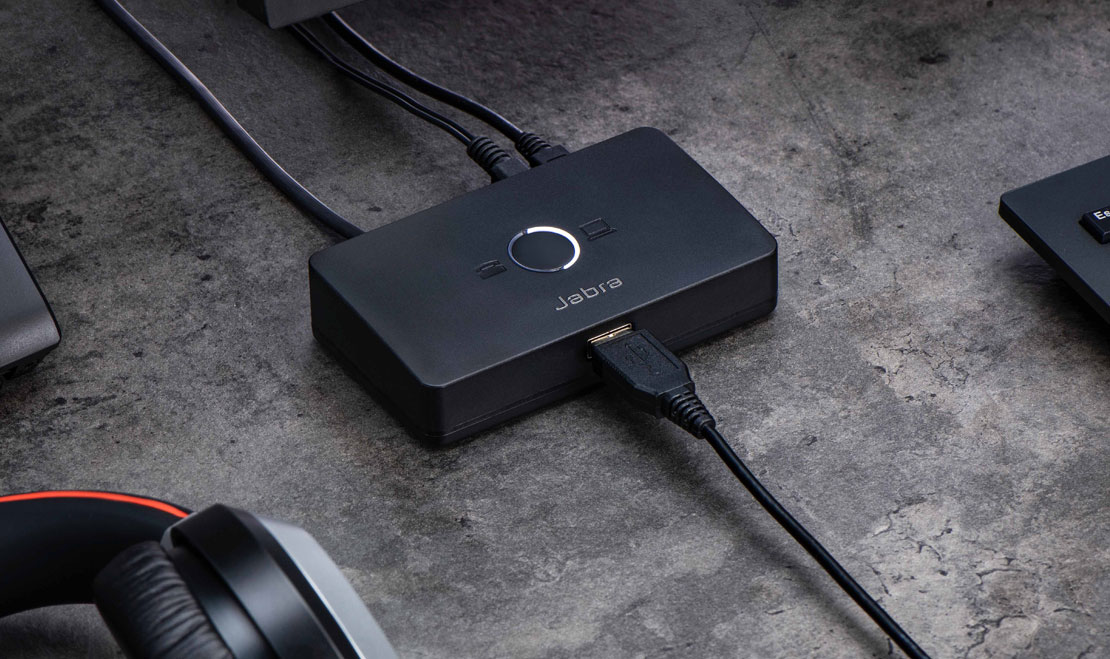
Jabra Link 950 for USB-A or USB-C Headsets
The Jabra Link 950 enables you to use a compatible Jabra USB headset, either with just your desk phone or with your desk phone and softphone. Choose from Jabra’s wide range of corded and wireless USB headsets, and look for Bluetooth functionality if you also want the headset to connect to a mobile phone. Check if your Jabra headset is compatible here: jabra.com/help/link950/compatibility.
Resources:
Poly MDA220 USB
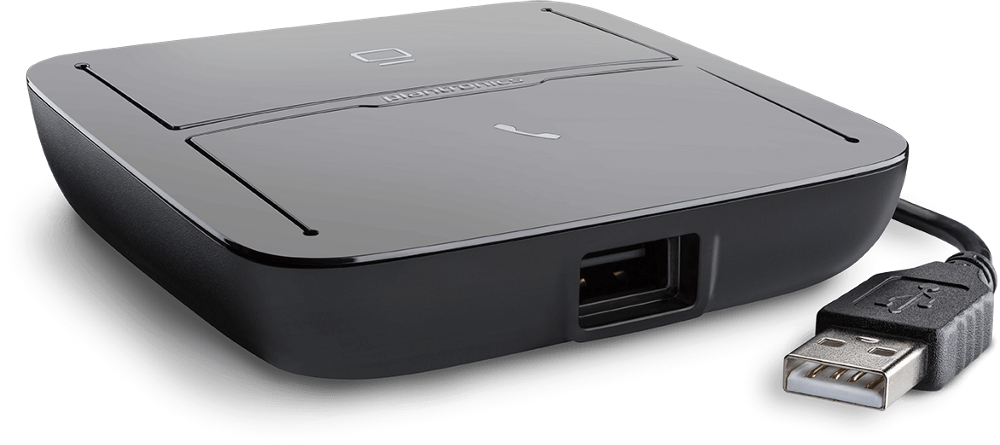
The Poly MDA220 USB allows you to connect to PCs, Macs, desk phones, Poly USB headsets, and devices (corded, wireless, Bluetooth). As of writing this blog, here are the compatible Poly USB devices: Blackwire Family Voyager Family when used with a BT600. Audio 615 and 630M Savi 400 Series EncorePro USB Series Bluetooth USB Adapter BT600, BT300 Entera USB (HW111N, HW121N) DA70, DA80, DA90. Not compatible with Savi 8200 Office and UC Series.
Resources:
Solutions to connect Jabra and Poly QD headsets to desk phones and computers
Jabra Link 860

The Jabra Link 860 is a flexible audio processor with dual connectivity to desk phones and softphones straight out of the box. With easy-to-reach buttons for mute, volume, and switching calls between desk phone and softphone, the Jabra Link 860 includes audio streaming: call recording, agent greeting, and transcribing.
Resources
Poly MDA500 QD Series

The Poly MDA500 QD Series includes four models: MDA524 QD USB-A, MDA526 QD USB-A, MDA524 QD USB-C, and MDA526 QD USB-C. The MDA500 QD Series allows you to connect Plantronics standard QD and digital QD headsets and Y-Training cables.
Resources:
- Poly MDA500 QD Series Datasheet
- Poly MDA524 QD/ MDA526 QD User Guide
- Shop Poly MDA524 QD USB-A
- Contact an Authorized Poly Reseller for the other MDA500 QD Models
Poly MDA100 QD Series
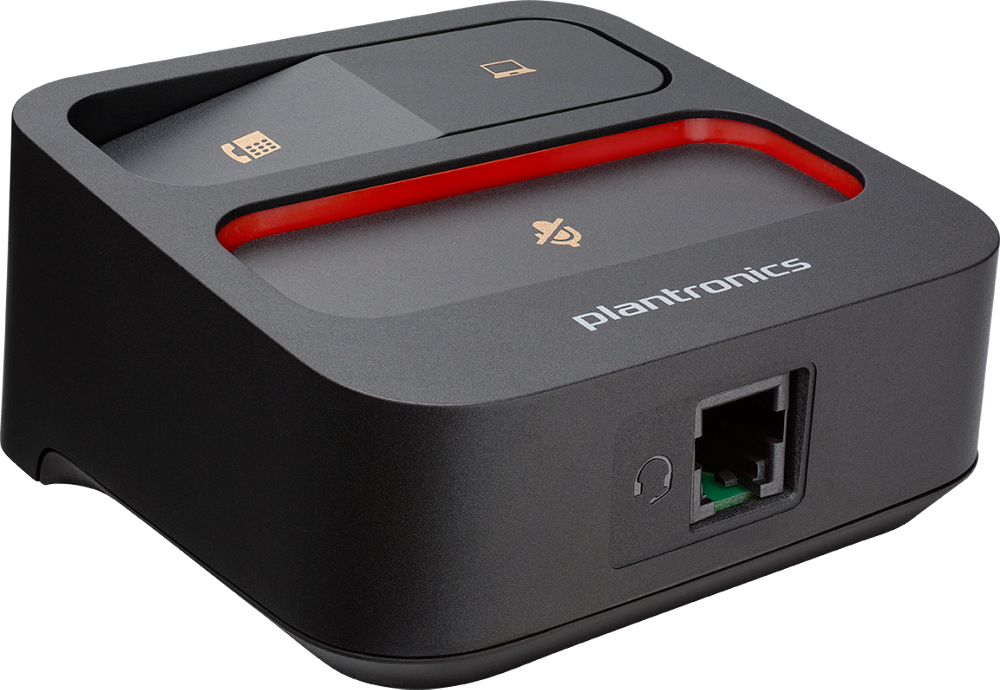
The Poly MDA100 QD Series is a lower-cost option to connect existing Plantronics QD headsets to desk phones and computers. There are two models: MDA100 QD and MDA105 QD.
The MDA105 QD includes a volume control feature.
Resources:
- Poly MDA100 QD Series Datasheet
- Poly MDA100 QD User Guide
- Shop Poly MDA100 QD
- Contact an Authorized Poly Reseller for the MDA105 QD Model
Solutions to connect modular headsets to computers and desk phones
ZoomSwitch ZMS10-C / ZMS20-UC
_media-1.jpg?resizeid=3&resizeh=1500&resizew=1500)
The ZoomSwitch has been around for several years and was the original option to help organizations transition to computer-based telephony. The ZoomSwitch is still an outstanding solution as it supports DECT wireless headsets, wired modular headsets, or handsets to connect to a desk phone and computer.
Resources:
Connect with a Subject Matter Expert
It’s always best to contact a subject matter expert to discuss headset solutions for return to the office and hybrid work. We completely understand the need for immediate solutions; however, organizations should be moving towards developing new device standards that support new ways of working. Poly, Jabra, EPOS, JPL, Logitech, Yealink, and others have multi-connectivity wireless headsets, Active Noise Cancelling Headset Solutions, and Corded USB headsets that align with the different workstyles and workspaces of today’s workforce.
Quick Links
Company
Search
Office
400 Imperial Blvd. Cape Canaveral, Fl 32920

